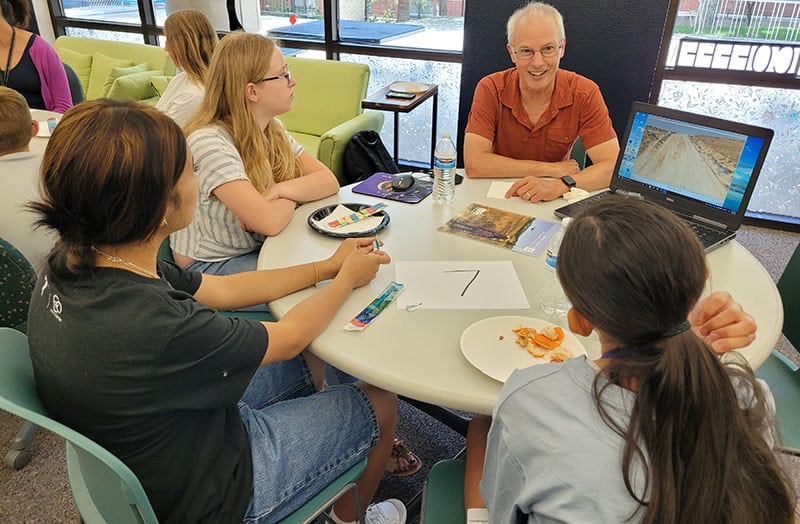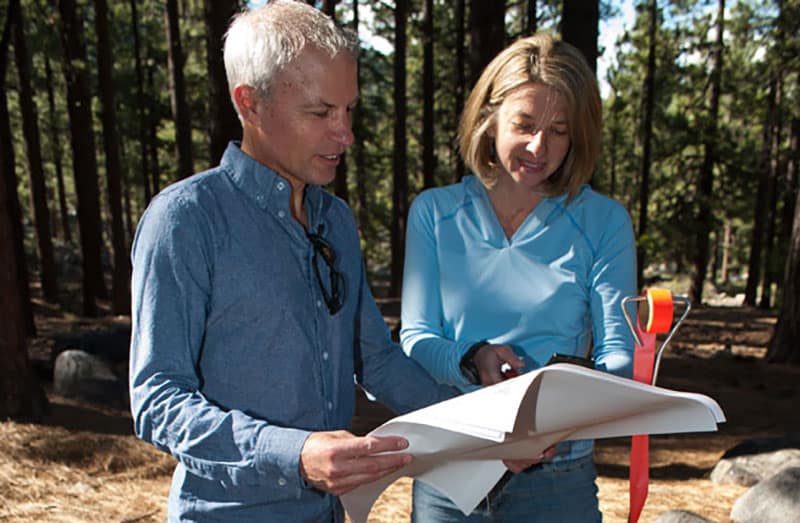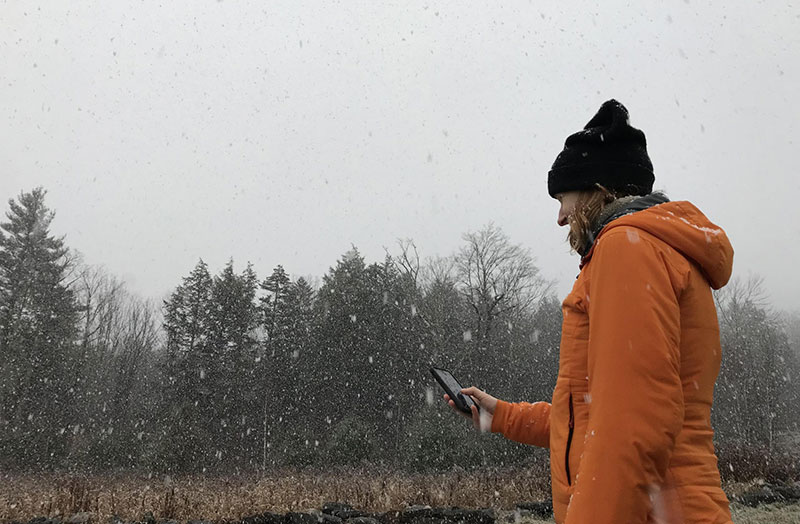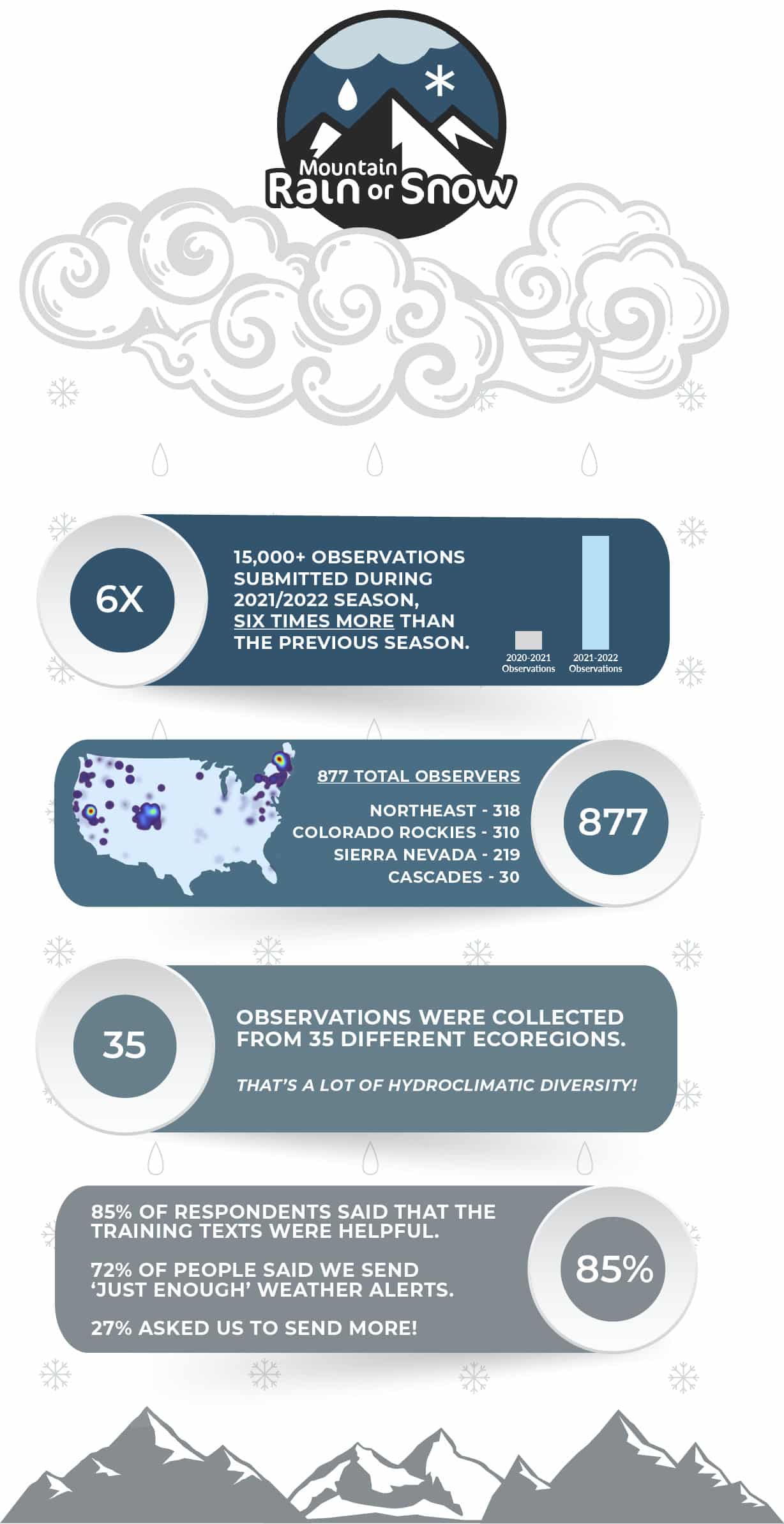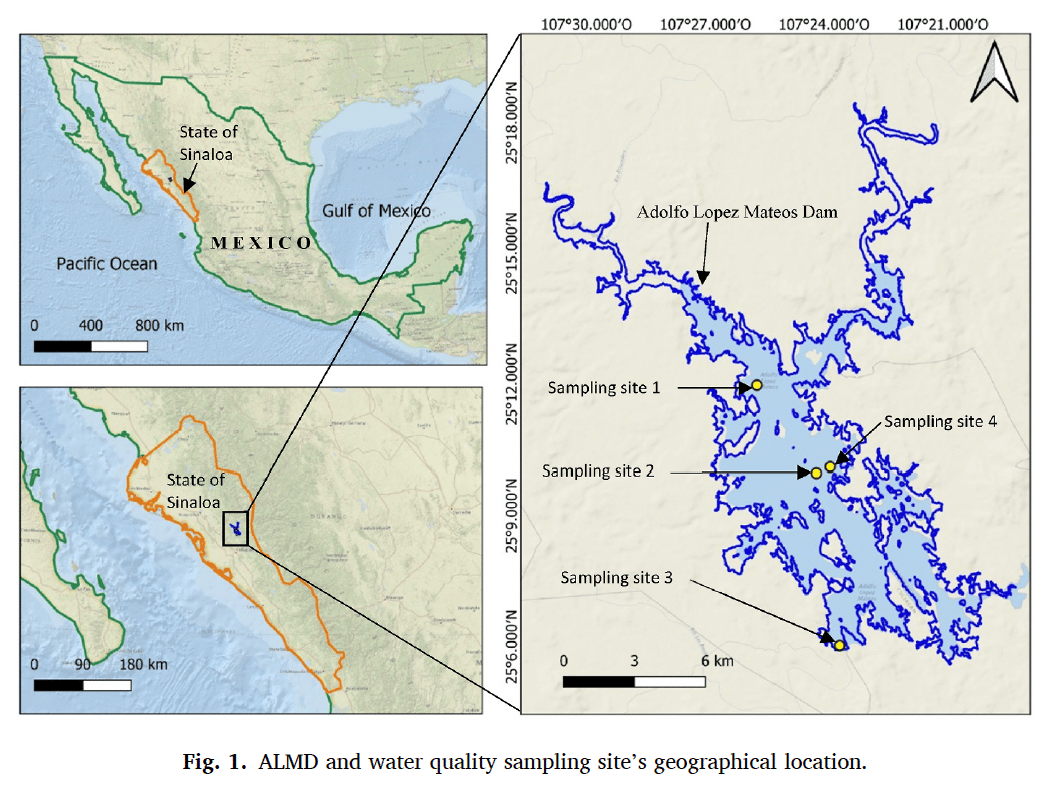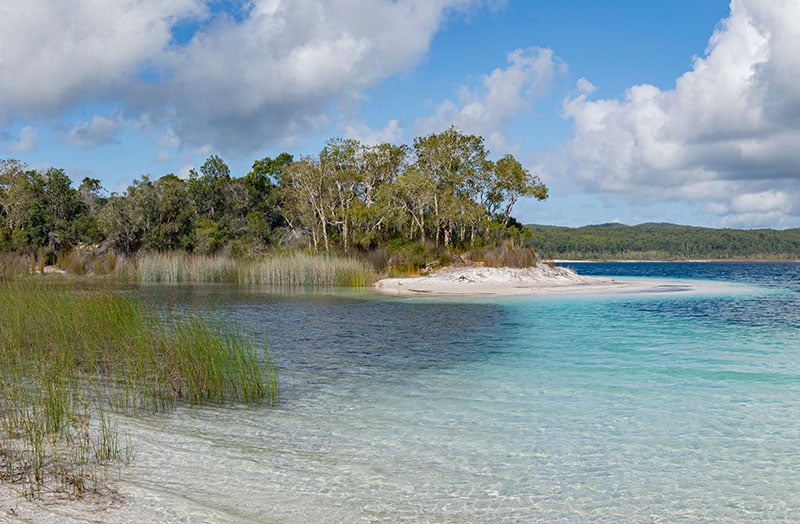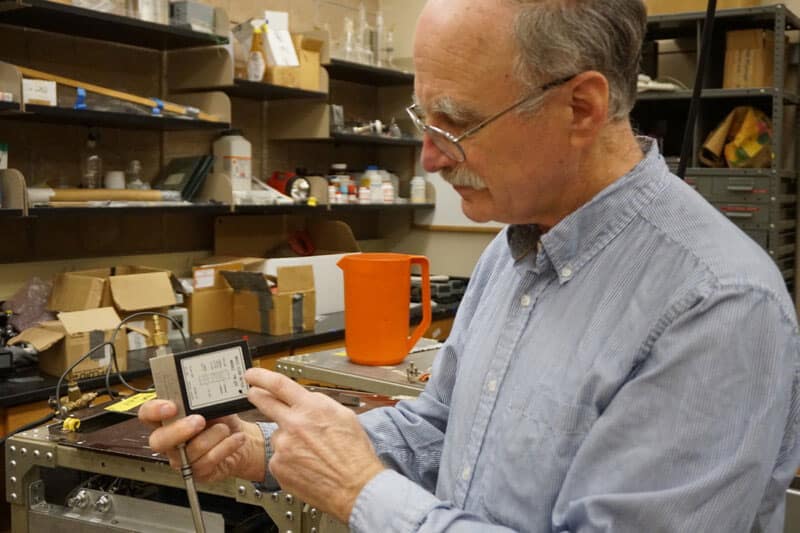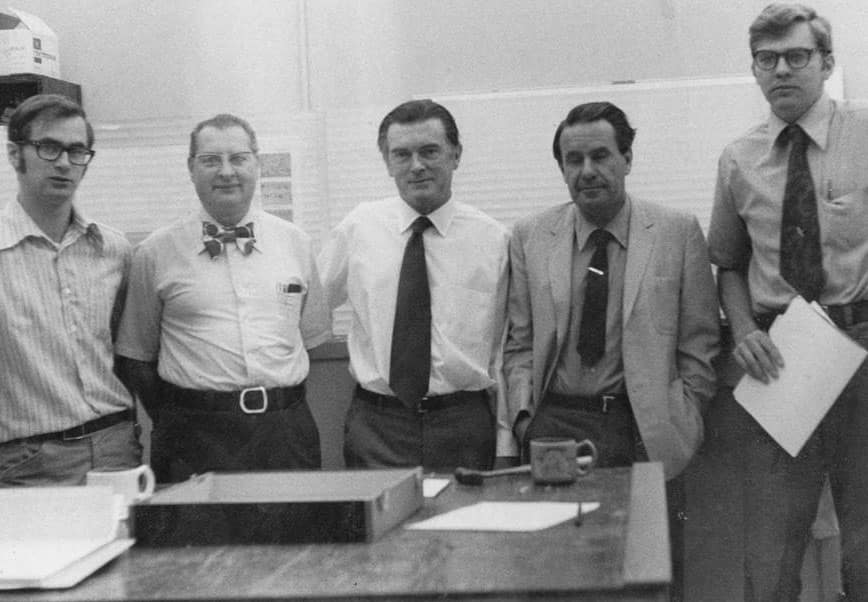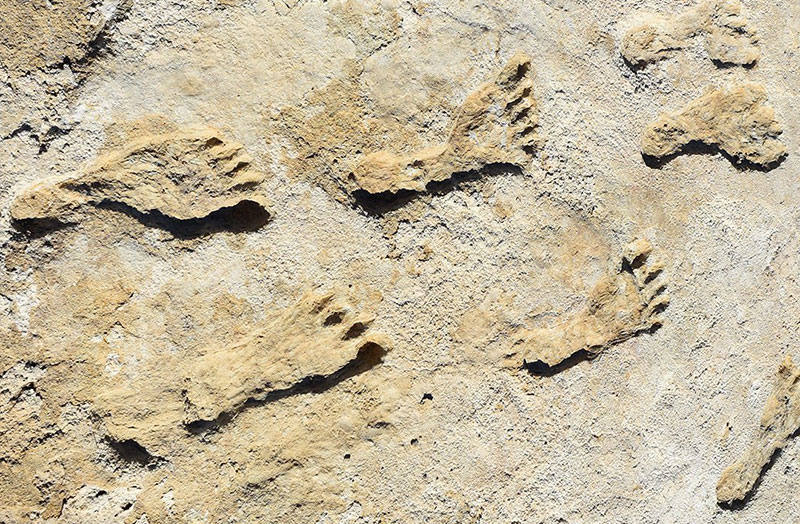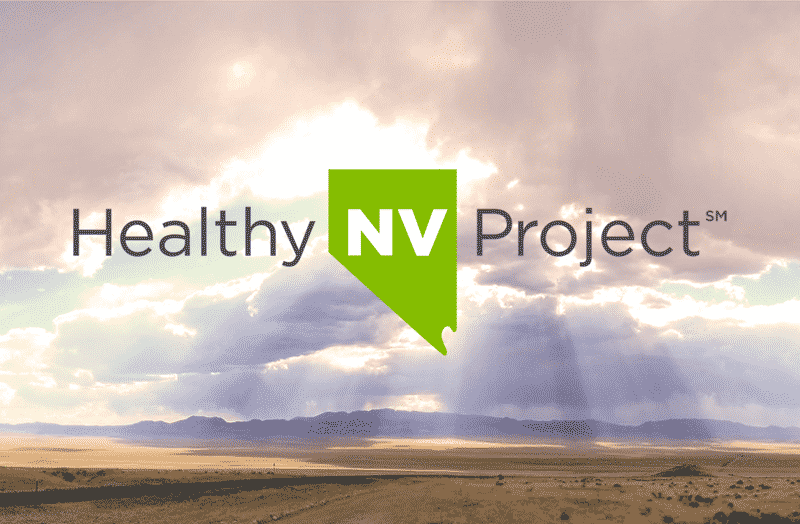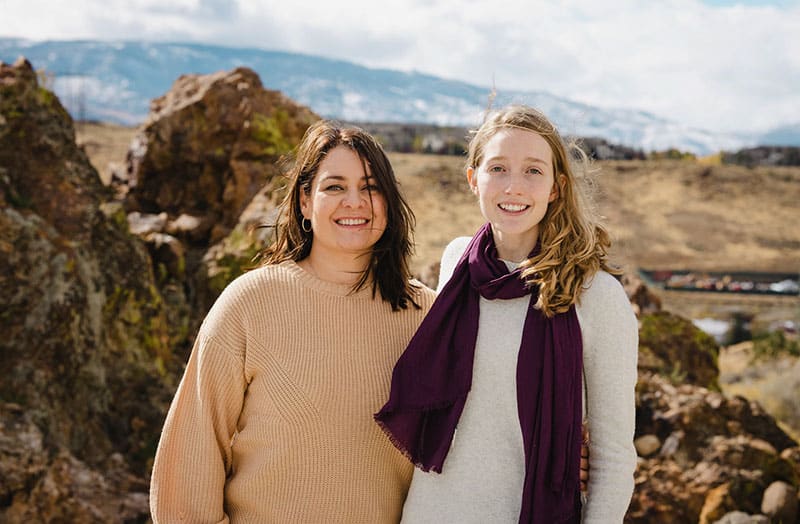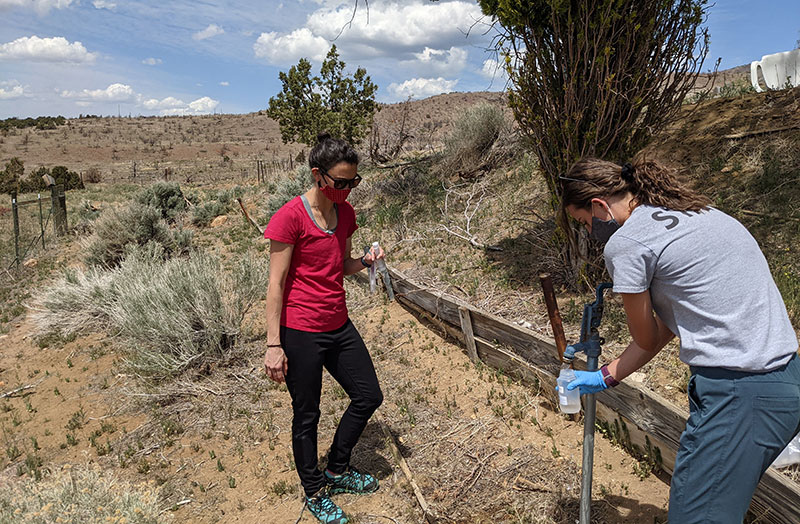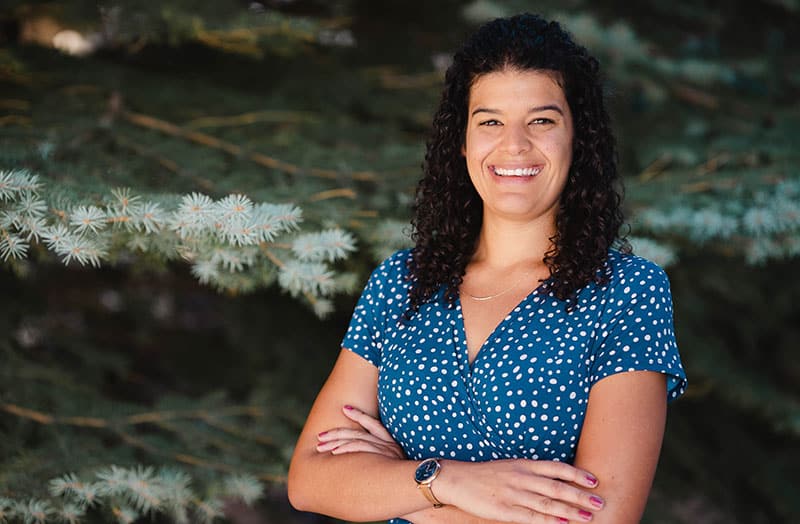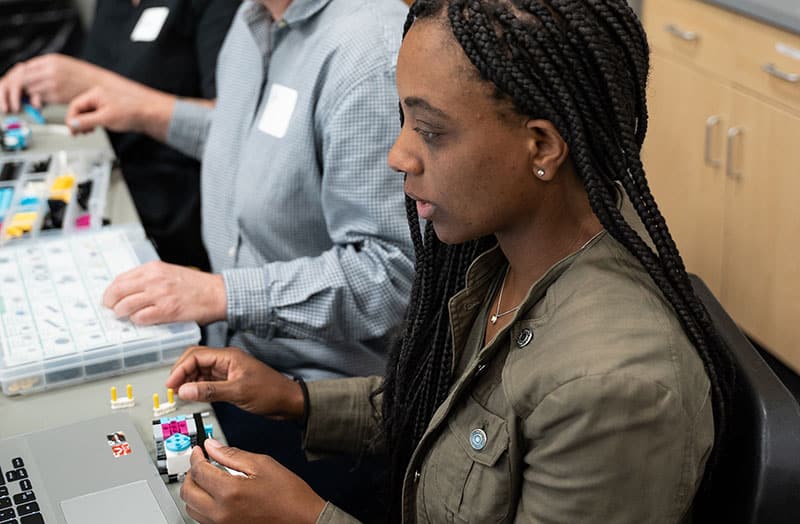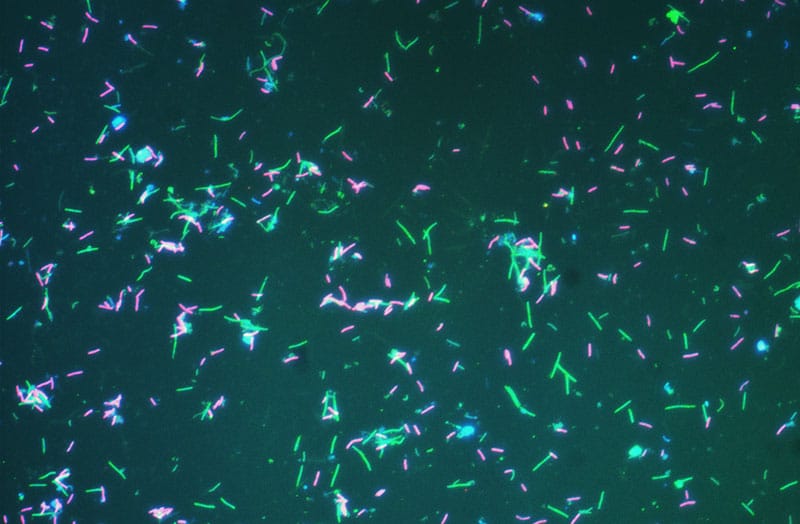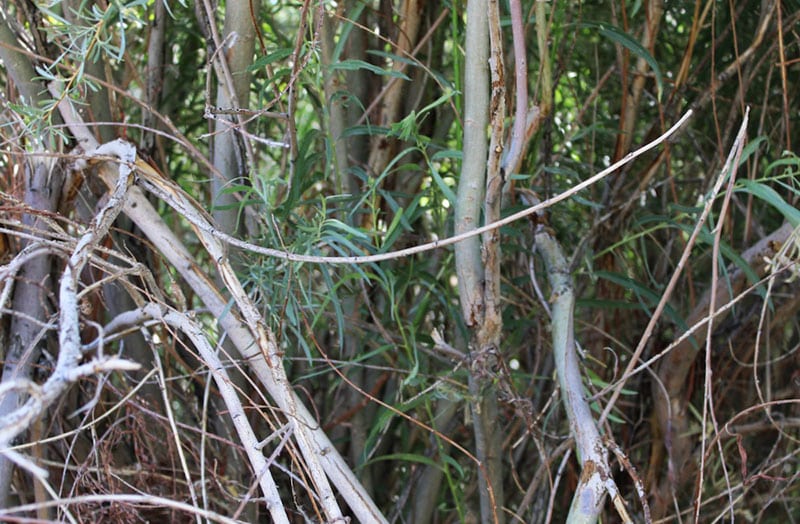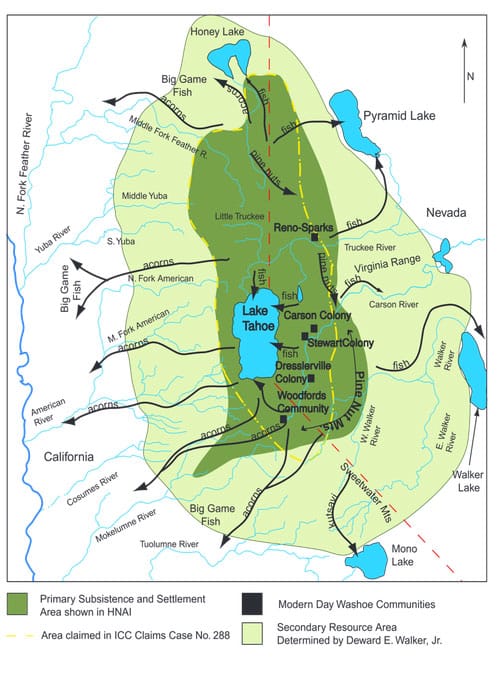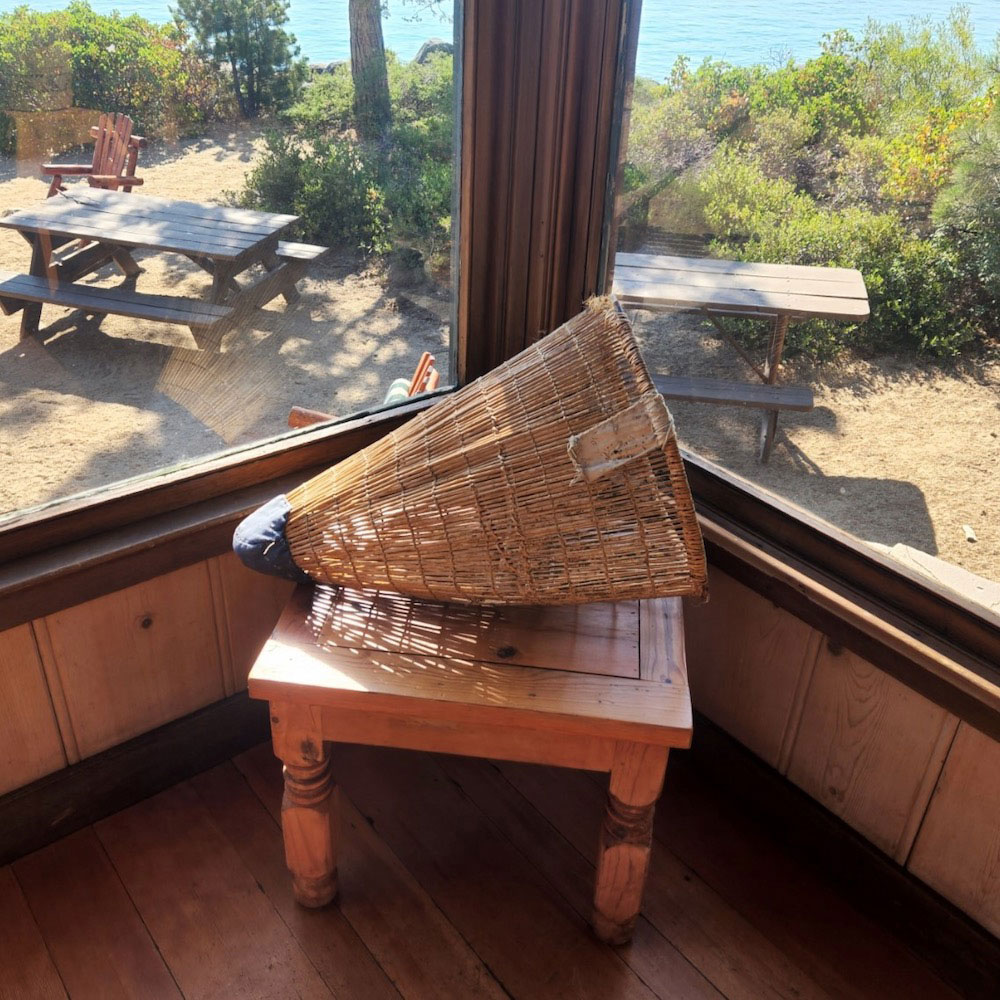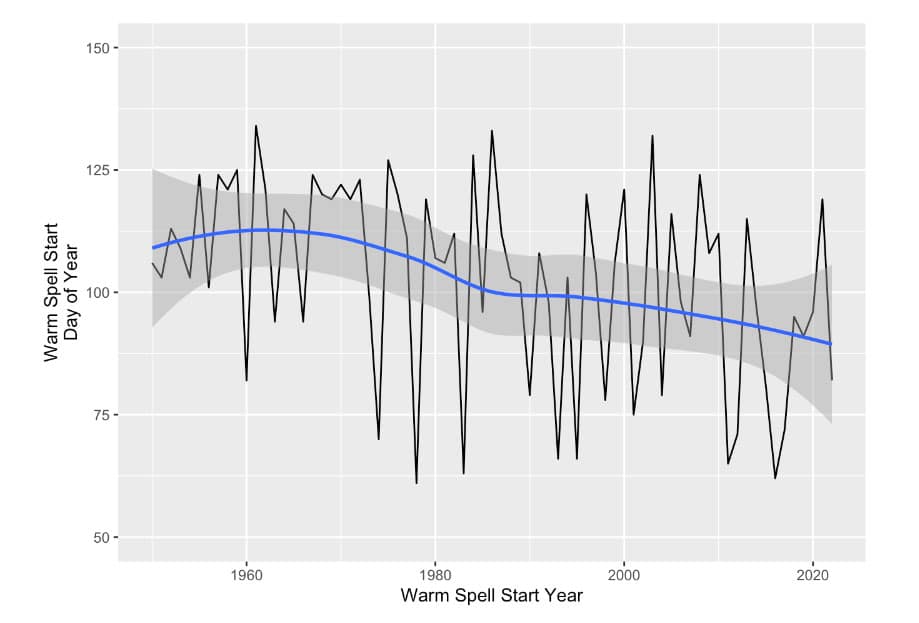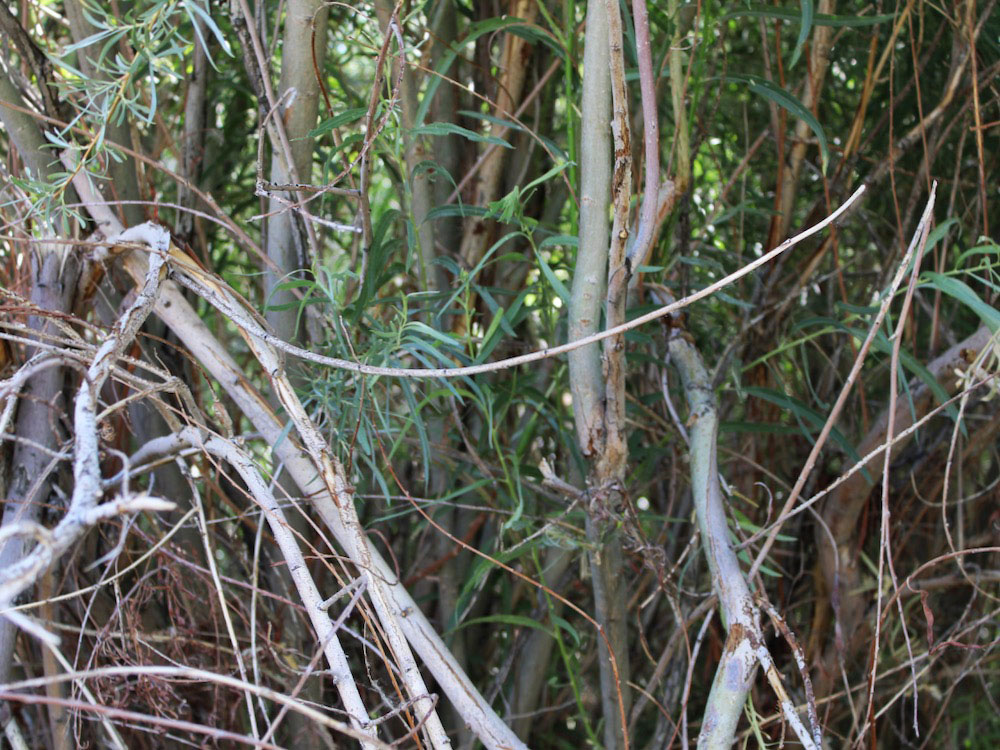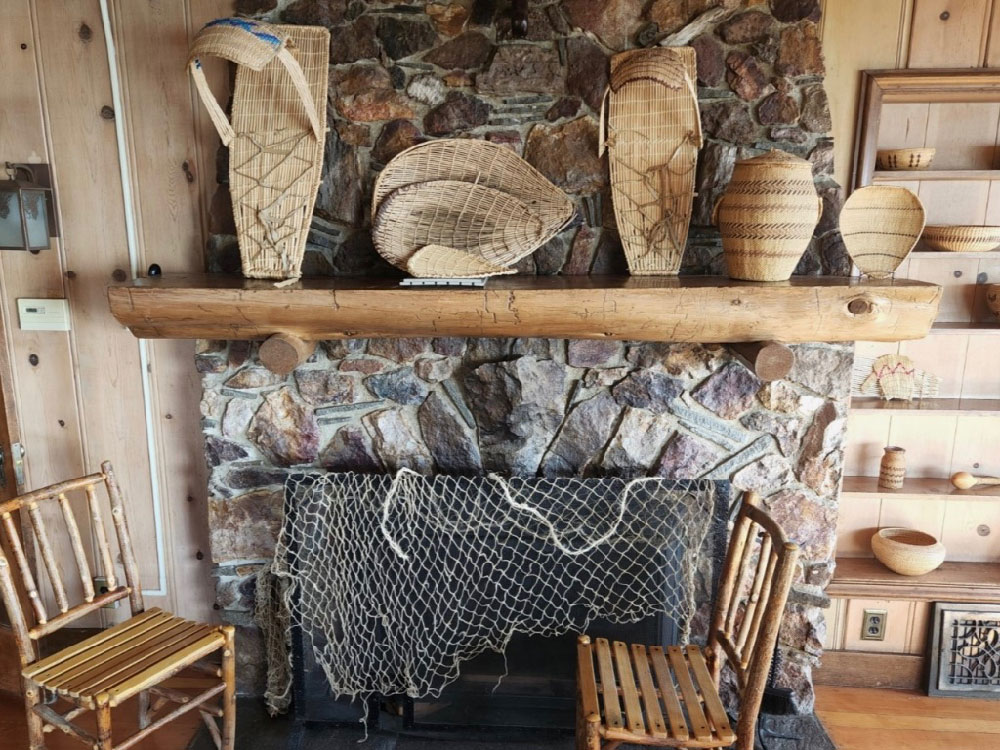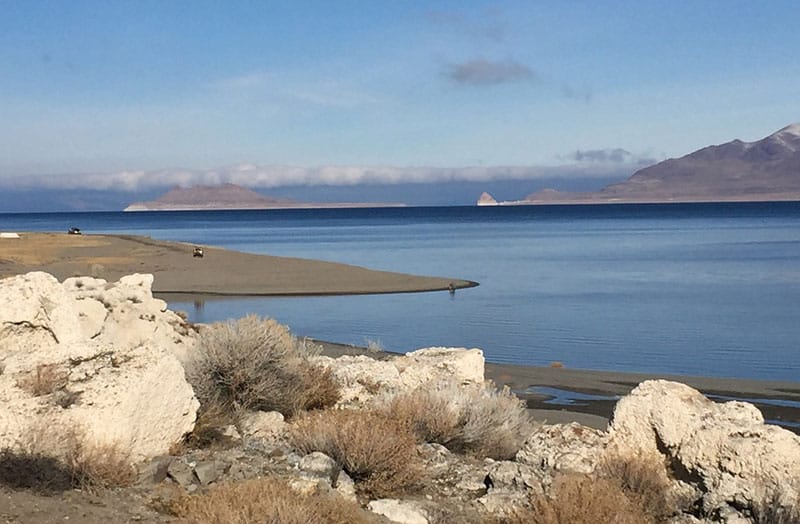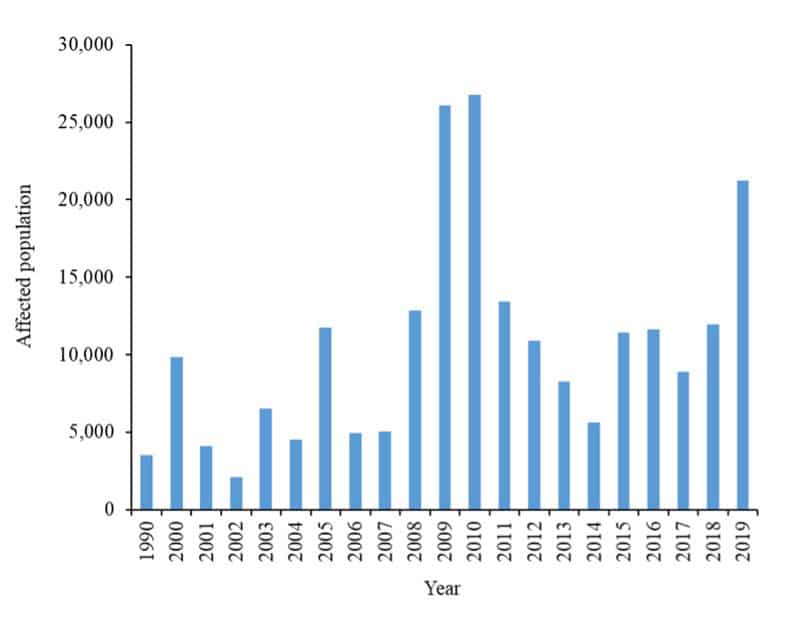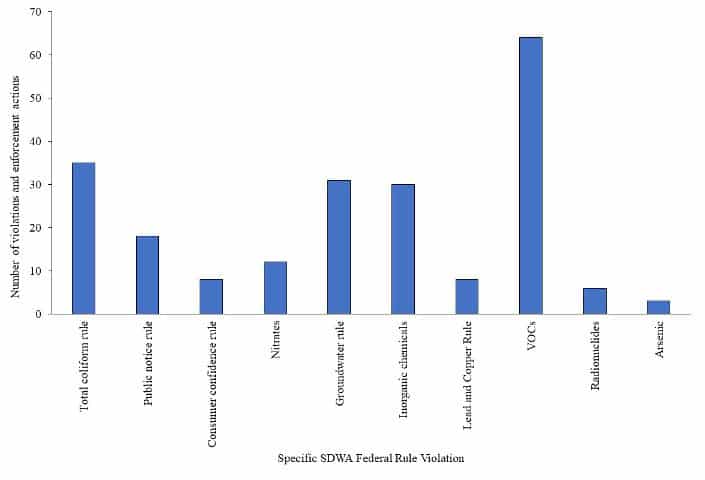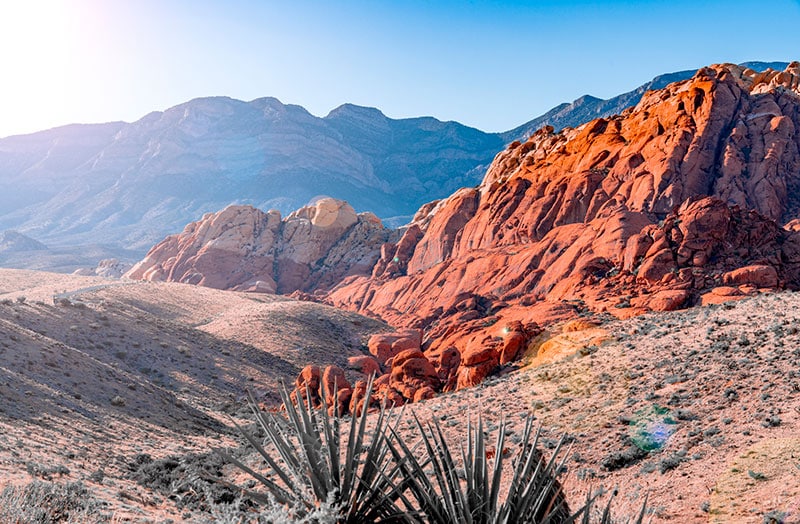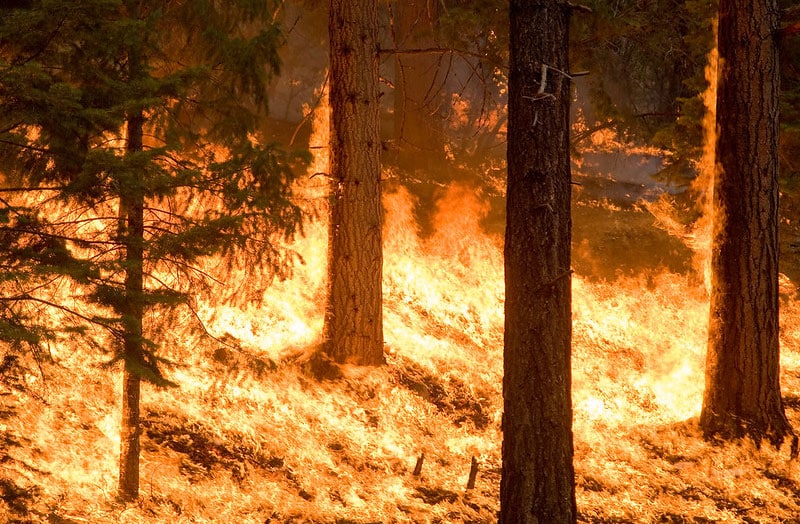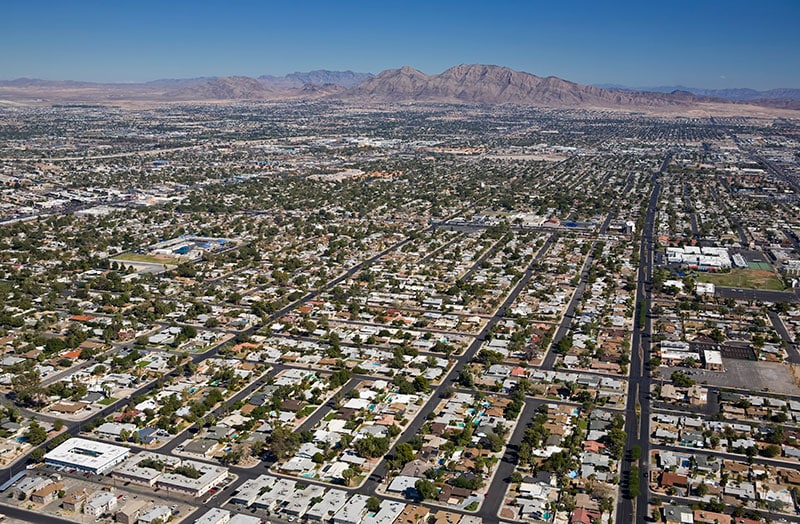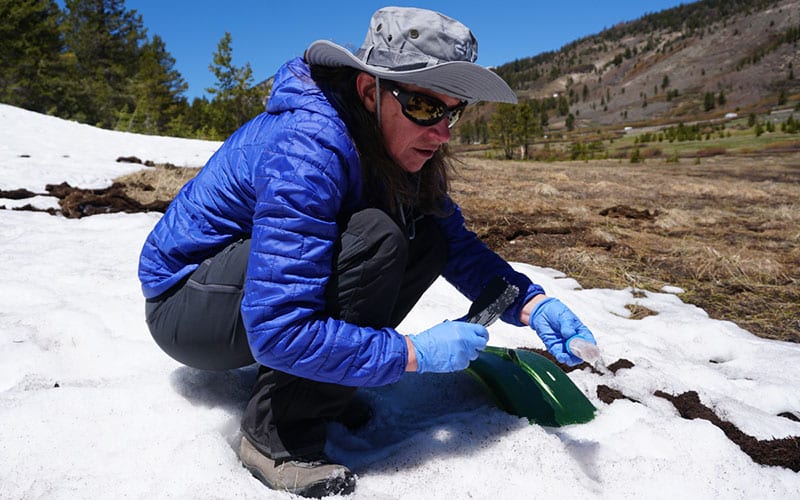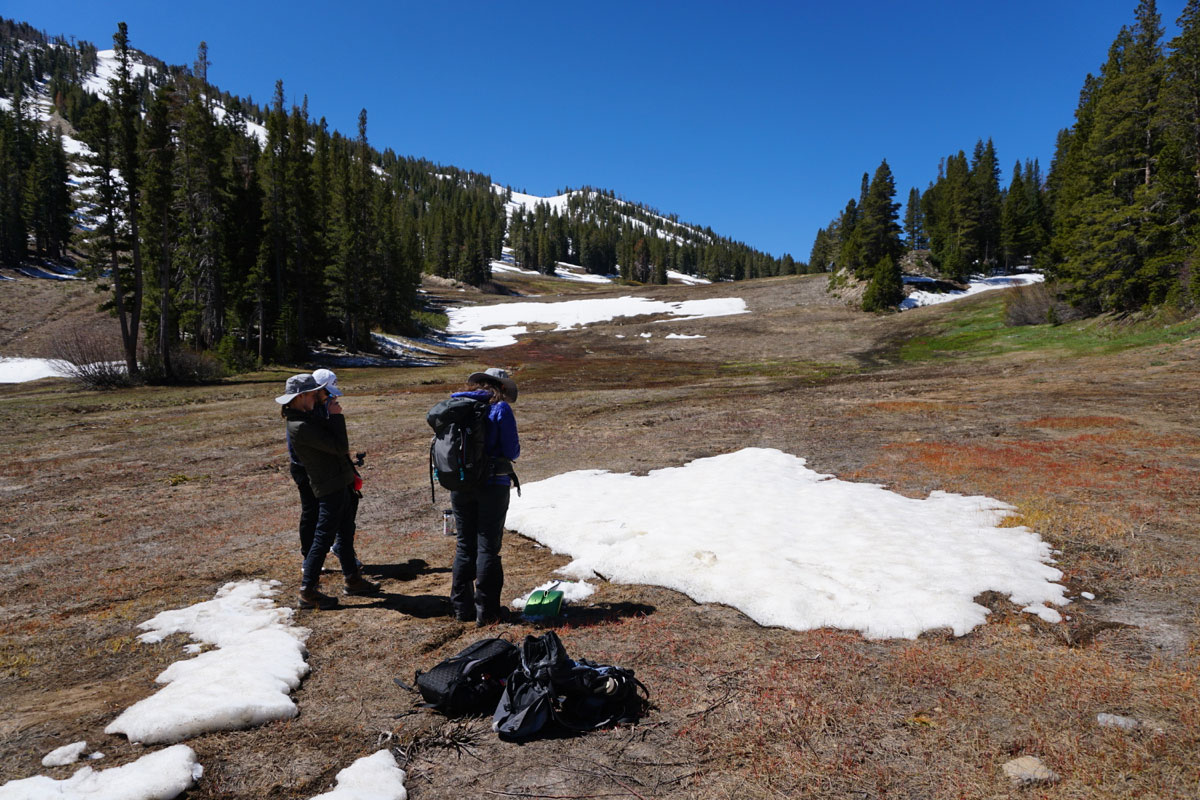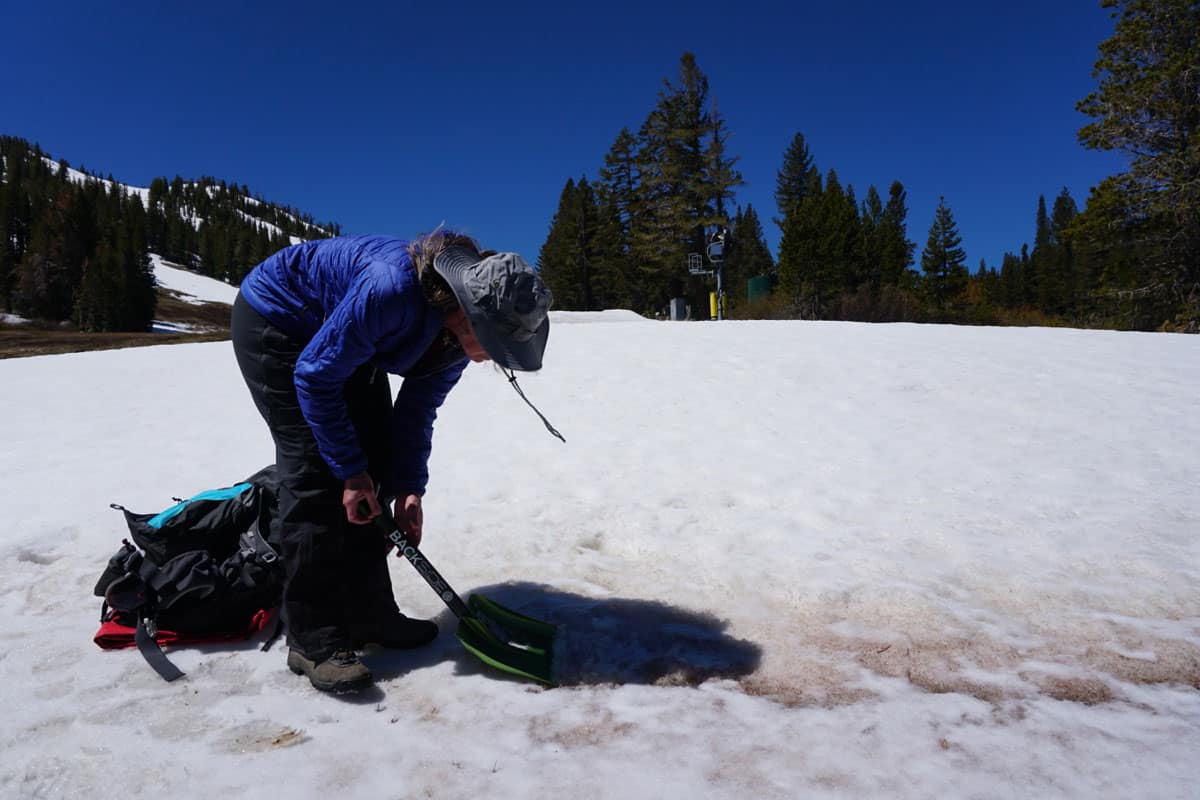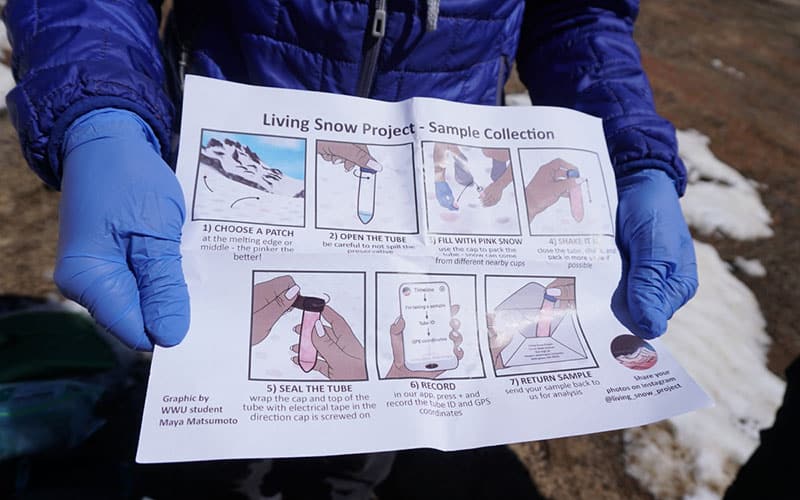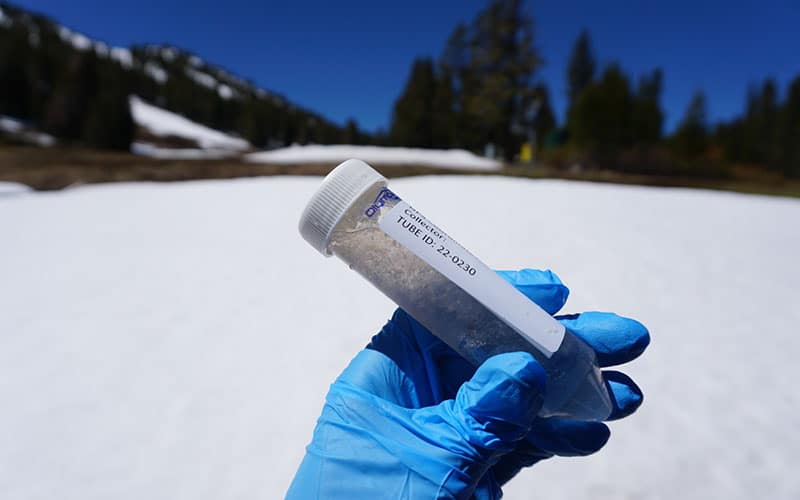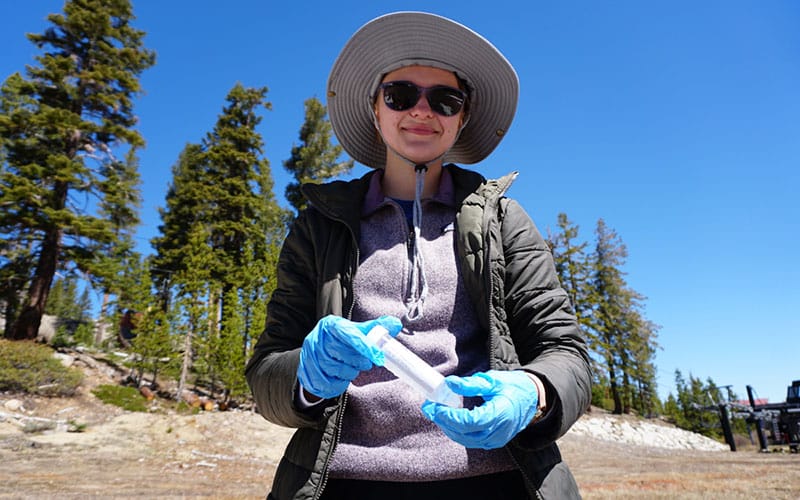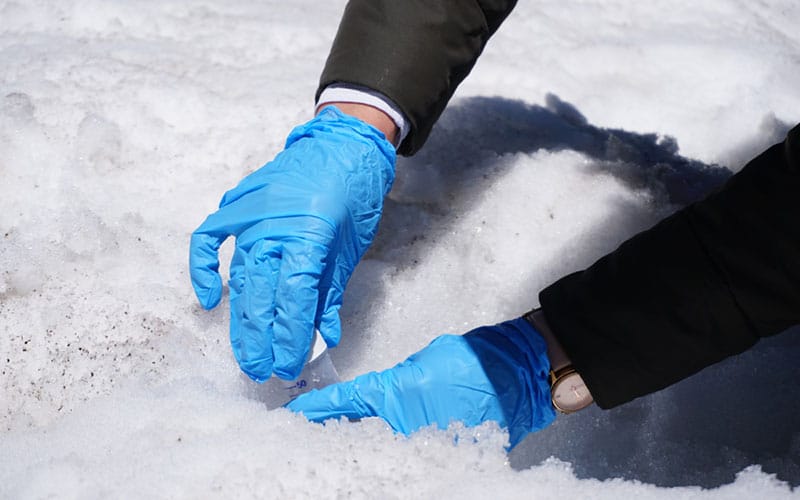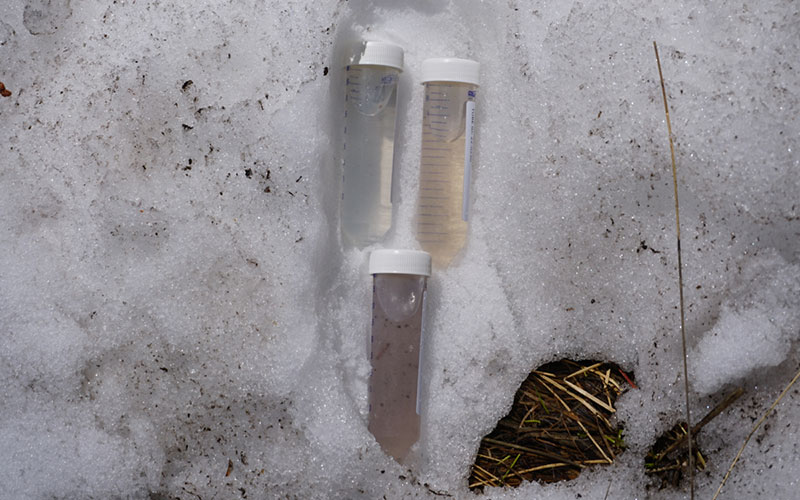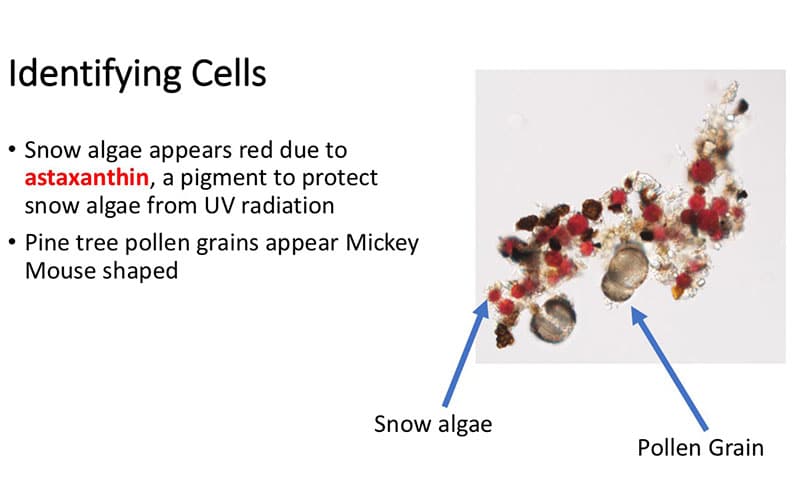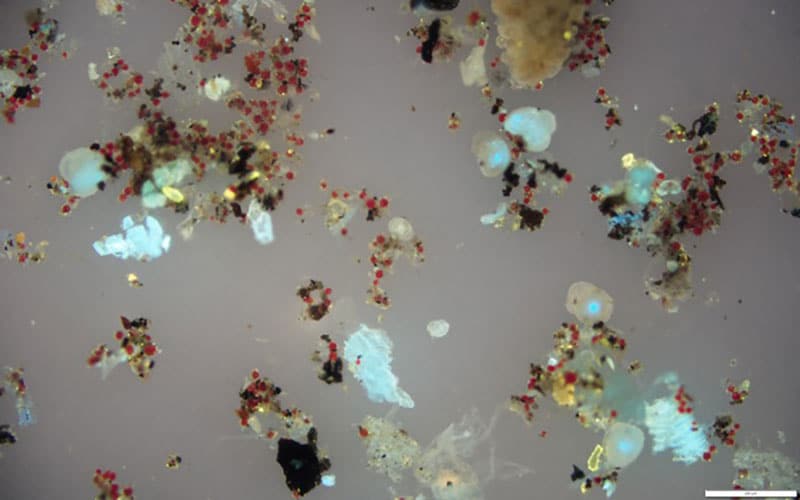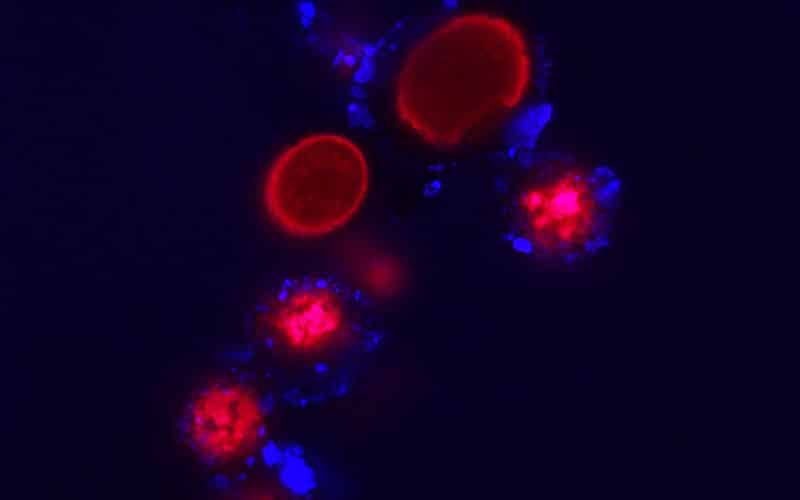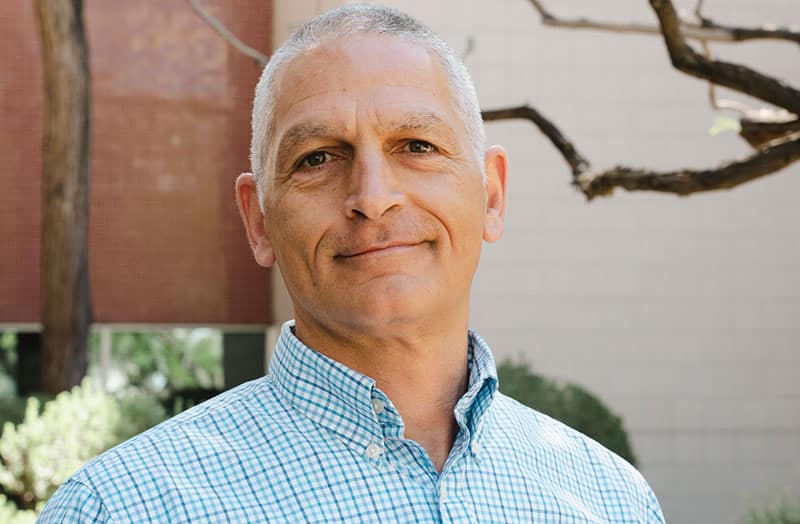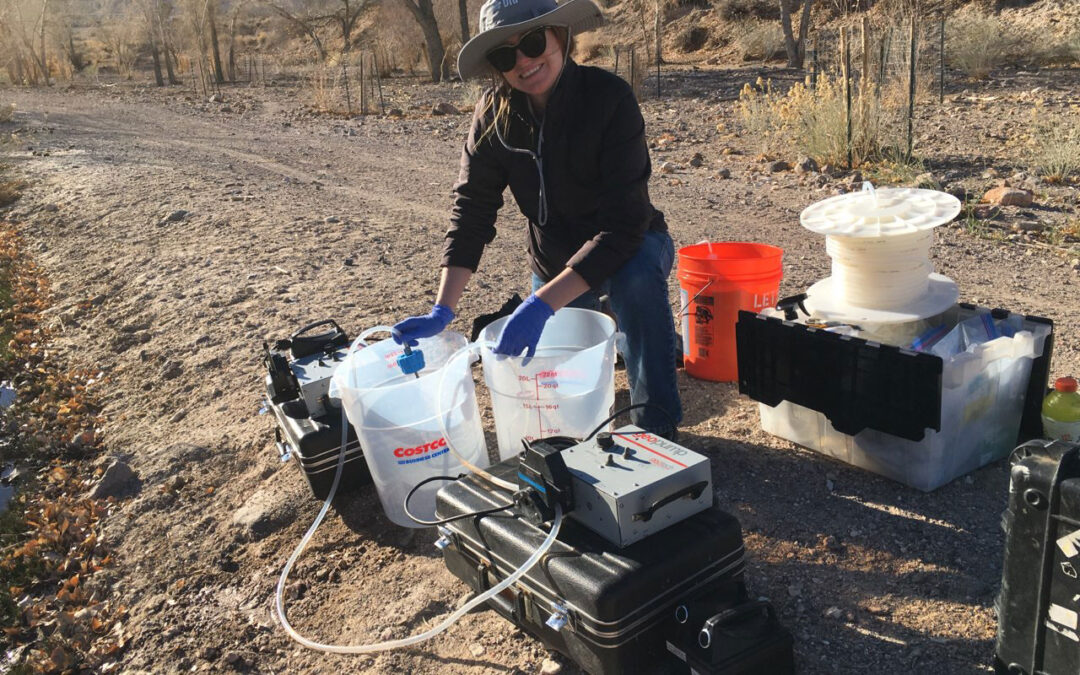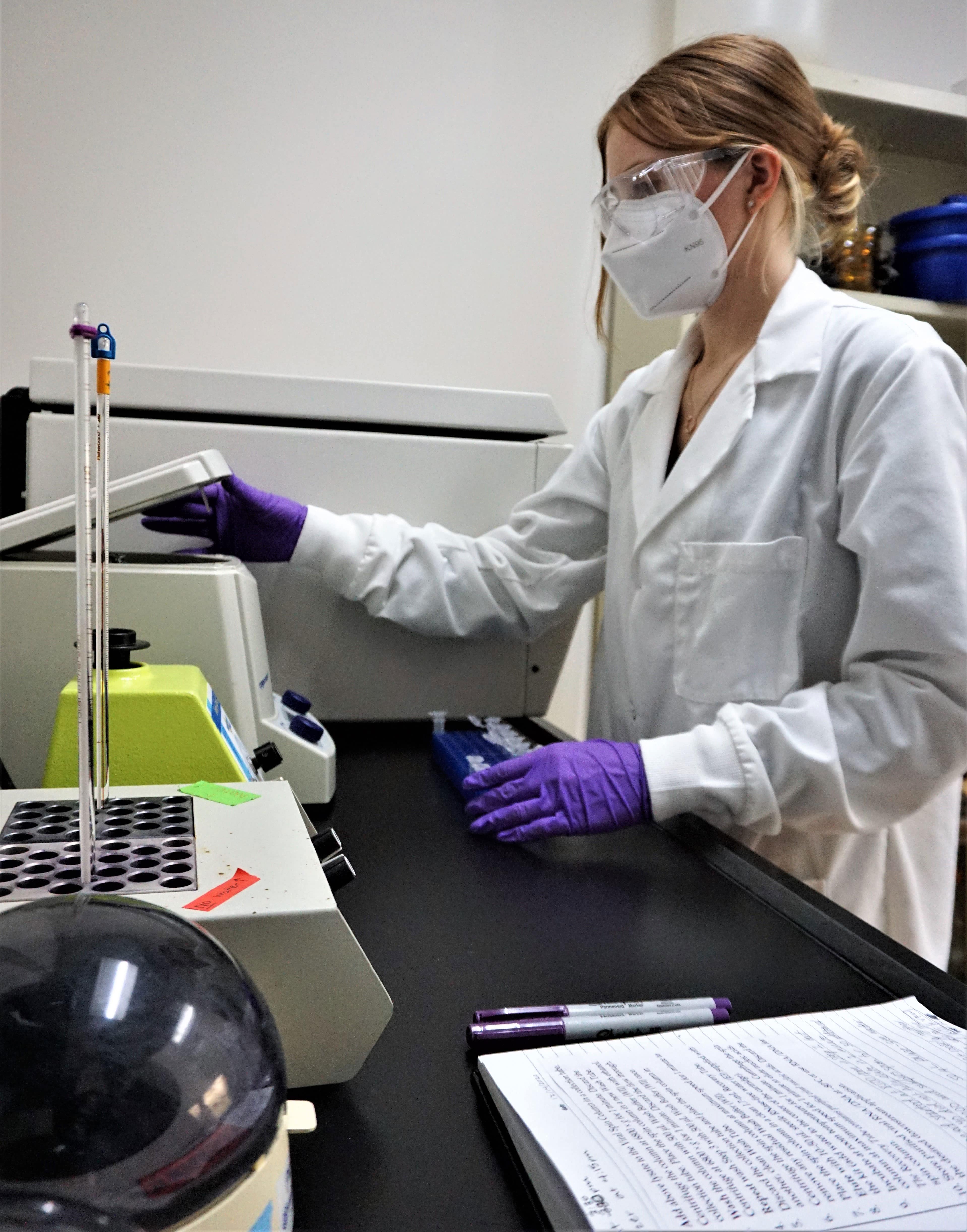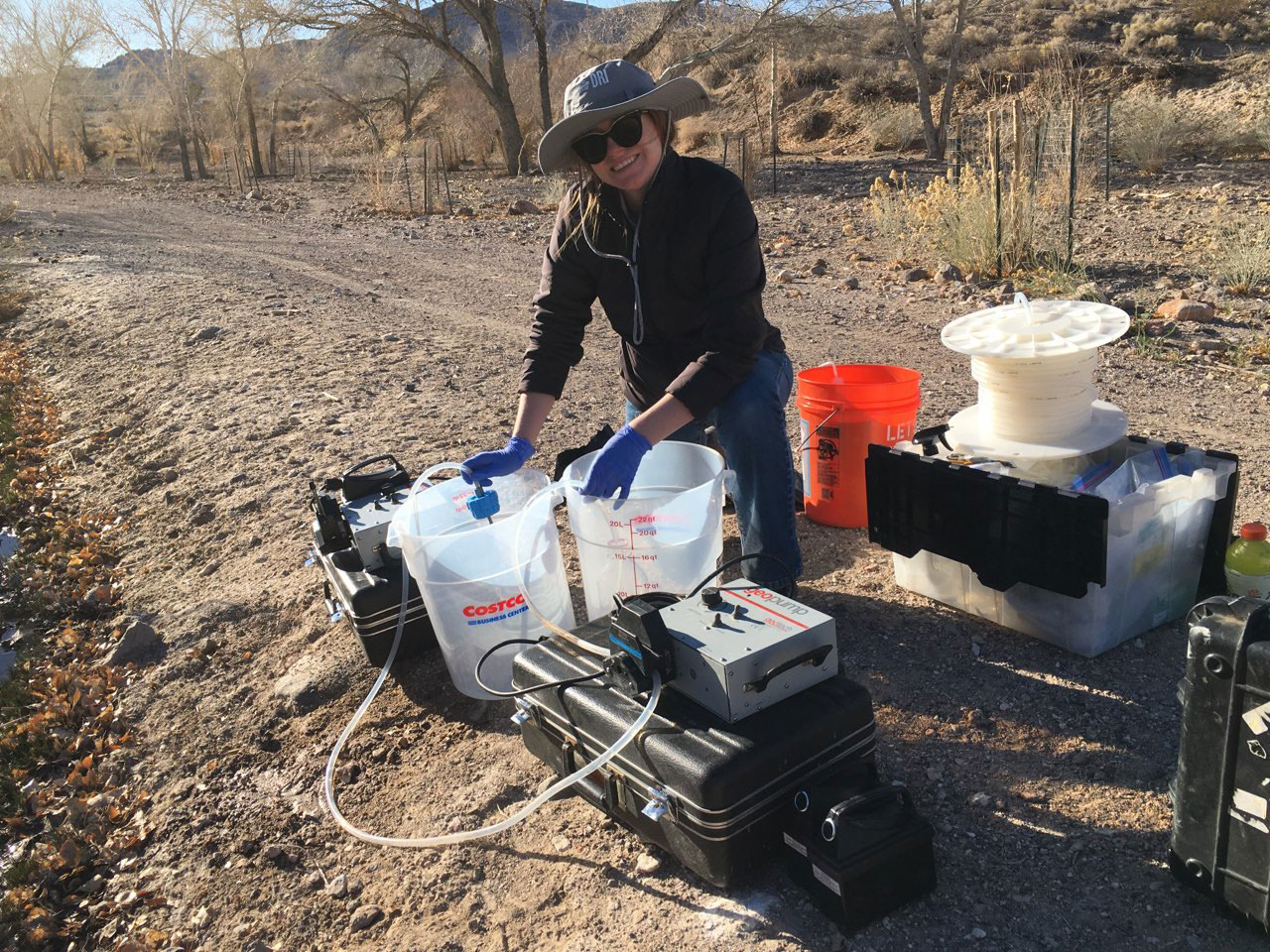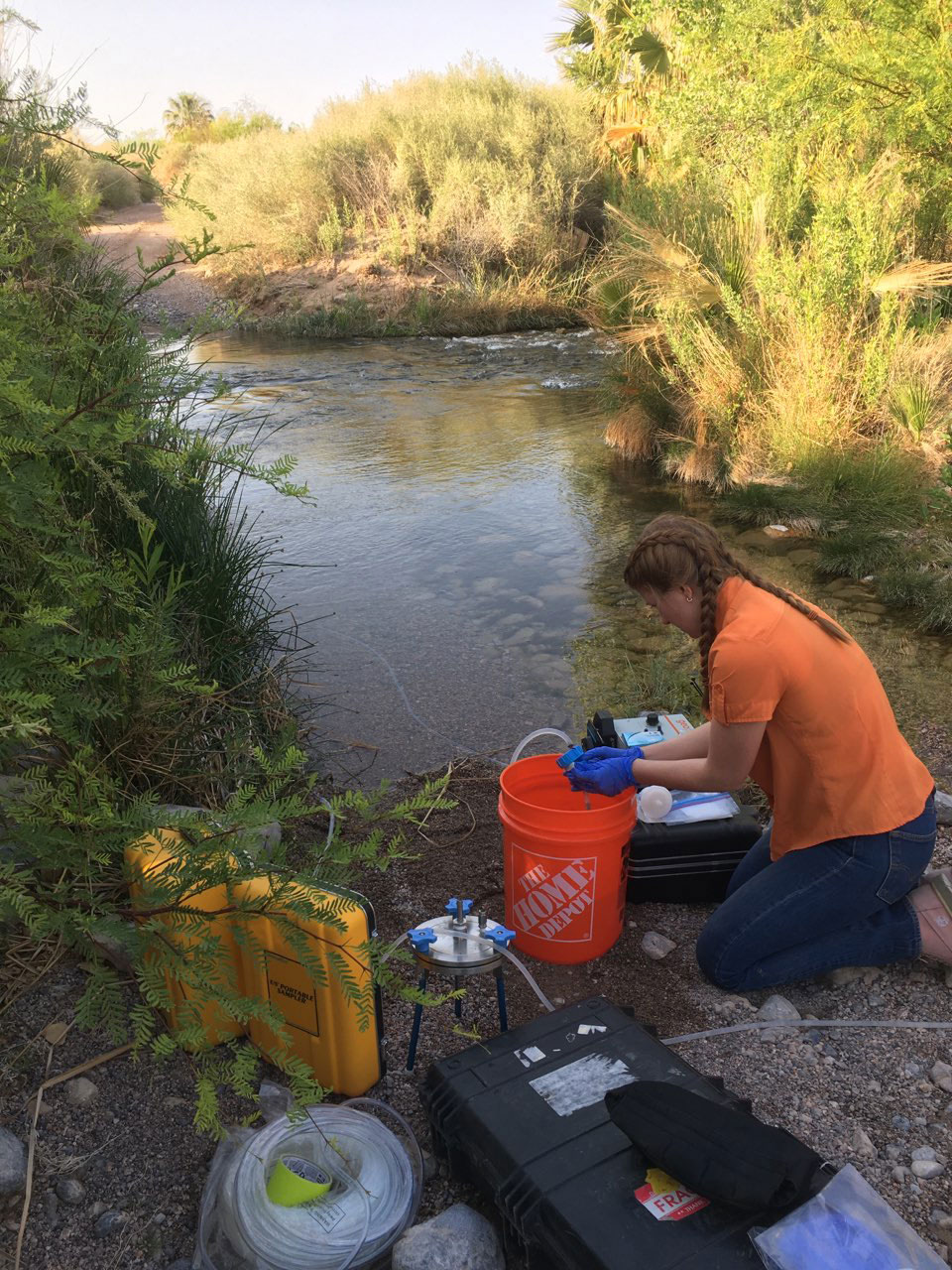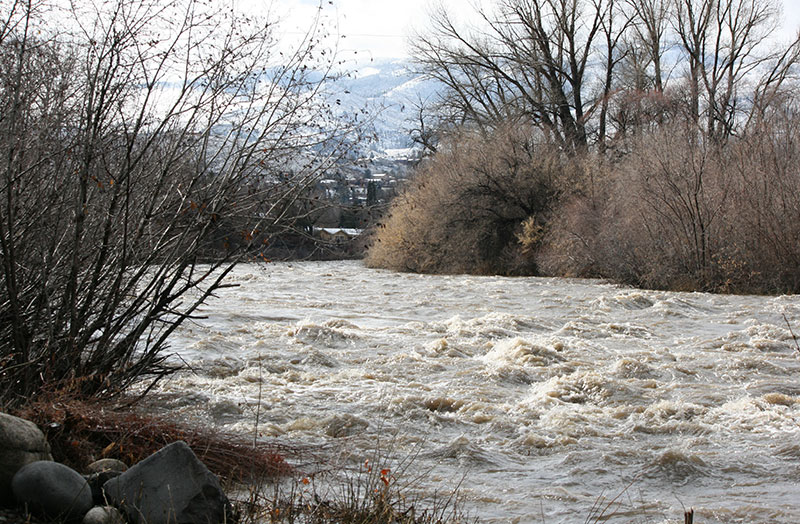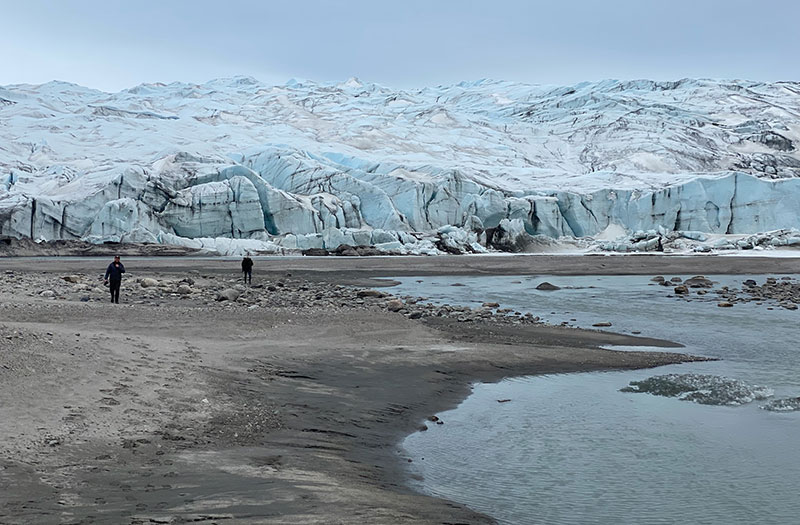
Dec 21, 2022 | Blog, Featured researchers
Tim Minor: Celebrating a Career in GIS and Remote Sensing
DECEMBER 21, 2022
RENO, NEV.
Tim Minor
GIS
Remote Sensing
Above: Minor piloting a drone; he is a FAA-certified Remote Pilot in Command.
Tim Minor, M.A, recently retired from DRI after 31 years. His successful career as a geographic information systems (GIS) and remote sensing scientist brought him to DRI in 1991; he served as Deputy Director of DEES from 2012 to 2018, and Interim Executive Division Director of DEES from 2018 to 2021.
Minor’s work uses satellite and drone imagery to map and analyze invasive species, surface disturbance, ground water resources, and mountain watershed water quality, among many other applications. He is a FAA-certified Remote Pilot in Command, and he taught introductory and advanced courses in GIS applications and image processing methods.
DRI sat down with Minor to discuss his long career as a scientist and competitive runner, his career highlights (featuring a Ghanaian marathon), and his advice for young scientists (including his own son, Blake, an associate research scientist in DHS).
Minor conducting field work with DRI biologist Mary Cablk, whom he frequently worked alongside.
DRI: What first brought you to DRI?
Minor: Well, I grew up in Pacific Grove, California, and went to Monterey Peninsula College, and then got a scholarship to come to the University of Nevada. I only stayed two years, finished off my degree and went back to grad school at U.C. Santa Barbara. I got an offer to come up to Reno in 1989 to work for a mining company that needed a geologic remote sensing person. While I was working for them, I started meeting some people from DRI, and I just thought it was an amazing place.
There was a guy named Jonathan Davis who was a mentor of mine. He was one of my teachers at UNR and I was really looking forward to working with him, Dave Mouat, and some of the other amazing people at DRI. I didn’t know quite how that would work, but things just kind of fell in place. I got a job at DRI in 1991.
The sad part was that I was really looking forward to working with Jonathan Davis — his wife worked with me at my mining company — but they were involved in a horrible car accident a couple of months before I got to DRI; Jonathan was tragically killed. We have a Jonathan Davis scholarship in DEES in his name.
DRI: And you’ve been at DRI ever since?
Minor: Yep, I stayed at DRI for 31 years. I think one of the things that really helped me is that in the GIS/remote sensing field, there are opportunities to work on a lot of diverse projects. I started off working on an air quality project, and then I started doing a lot of stuff with water, biology, and vegetation. And it just kind of took off from there — it was very rewarding.
You know, I have a master’s degree, not a Ph.D. So, despite everyone calling me doctor all these years, I’m not. What I hope to have inspired here is that with your master’s, you can still go pretty far at DRI. I’m pretty proud of the fact that I became a director with a master’s.
I never really felt a ton of pressure to get my PhD. I was also still competing a lot – I was still running very seriously in the 90s and into the 2000s, so I had to make some choices. And I chose to continue to be a runner and have a career on that side instead of going after the Ph.D.
A newspaper clipping from the Reno-Gazette Journal that covered Minor’s 1993 marathon race in Ghana. Minor finished in 9th place with only 3 hours of sleep in the preceding two days due to traveling.
DRI: Tell me more about your competitive running career.
Minor: I ran competitively for a long time, from the time I was 15 to age 51. I ran for Nevada as an undergrad and then I just kept going.
DRI: What inspired you to become a specialist in remote sensing?
Minor: I’ve always been a map freak. I think since I was four or five years old, I was the geeky kid in the back of the car telling my mom and dad where to go because I was looking at maps. I was just fascinated by spatial relationships. People talk about cognitive mapping and our brains and I just always loved thinking about, “Okay, where are we going, and how do we get there?” But I didn’t know what I could do with that. I remember as I got to junior college, I was like, “What am I going to really do? Is there anything you could do with this stuff?” And that’s kind of when remote sensing was starting to really take off and become a science unto itself. And then of course, GIS came along later, but the key for me was taking remote sensing classes at UNR back in the late 70s. And that got me even more excited about it and the possibilities.
But what really helped me take off was UC Santa Barbara. Santa Barbara was way ahead of its time in terms of quantitative spatial analysis in geography. Every job I’ve gotten has been a UCSB connection, even at DRI.
DRI: What are some of your career highlights?
Minor: The biggest highlight goes all the way back to ’93 through ’98, when I was working on the Hilton Foundation projects with World Vision doing water development in developing countries. In 1993, I went to Ghana, West Africa and participated in some of the initial fieldwork that was involved in trying to develop better drinking water access for small villages in the central part of Ghana. And it was the most amazing experience.
I started off things with a bang in ‘93. I got off the plane and slept that night, and then the next morning ran a marathon. There was a marathon going on in the capital of Accra and one of my colleagues who was already there had signed me up. I thought he was just joking and I didn’t even know it was a full marathon, it was a little crazy. I couldn’t drink the water at the aid stations, so they had to drive around and give me water, but they got lost. So, it got a little hot as you can imagine. But talk about total immersion right off the bat. I just fell in love with the country and the people.
I love everything that came out of that. I showed my daughter, Emily, the pictures from Ghana and shared my experiences. And when she graduated from high school, she went over and worked in an orphanage in Ghana and just loved it herself. So, it was a really cool family legacy thing. As for the project itself, you know, sometimes in research, you wonder “What is this really doing for people? How is it impacting society? How is it impacting people and helping them?” Well, something like drilling a water well in a small village that can totally change the quality of the water and the quality of the life was pretty impactful. Without a doubt that was the best thing I was ever involved in.
DRI: Tell me more about the project in Ghana.
Minor: Well, it was unique in that it was a partnership, with Ghanaians basically running the program there. So many times with some of these projects in developing countries, you have people who want to do well but it ends up getting a little cloudy. We saw programs where other European countries had come in and tried to build mechanized wells, but the problem was that when they broke down, nobody would come to fix them. So, they were just gathering cobwebs and dust. The World Vision’s trick was to build simple hand pump wells, and they taught the villagers how to repair them. Our role was basically putting the x’s on the ground — we were telling them based on our geophysics and our remote sensing and our hydrologic knowledge, this is probably the best place to drill. Other projects would often just drill in the center of the village without any real forethought about the best hydrological position. And because it was hand pumps, water tables had to be relatively shallow, right? They couldn’t be super deep wells.
DRI: Are these wells still in use?
Minor: Very much so, yes. Braimah Apambire is involved with this project and he’s done some amazing things. And so yes, a lot of those wells and things are still active and still going. It’s pretty cool.
Tim Minor speaking with students at a STEM camp held at the University of Nevada, Reno in September.
DRI: How have things changed since you first started your career?
Minor: Well, let’s start with the science itself. Back in the day — and I really feel like an old geezer when I talk about this — computing power wasn’t what it is now. And I share this with my son Blake, who is a hydrologist at DRI in DHS – he’s got an office 50 feet away from the cube I’m in now. And it’s a little surreal that he is an assistant research scientist at DRI, but he’s been working at DRI for almost nine years because he started as an undergrad. I always joke with him that he has no idea how good he has it, with Earth Engine and the processing power he has at his fingertips. What takes him a few minutes to do now literally used to take me days.
The advancement of computer technology, the cloud and all the other computing power that’s out there, it’s just absolutely revolutionized the science of remote sensing, GIS, and spatial analysis. To watch that over my 41 years of working has just been unbelievable.
I love where DRI has gone. I’ll be very frank because I was on the Diversity Committee, but I’m encouraged to see that we’re finally reaching some diversity goals that I think we could actually feel good about. We’ve still got a ways to go, definitely. I really respect my longtime female colleagues at DRI — they’re very much pioneers in what they do. I think it’s so fantastic that we are finally getting there. You know, it’s just taken a long time.
In general, I like the diversity at DRI and how it’s evolved. I always thought that was one of our strengths, and one of our biggest selling points, our scientific diversity. One of the huge advantages I had as a GIS/remote sensing expert is all these different science disciplines use GIS and remote sensing in different ways. So, one day I would be working with the hydrologists, and the next day with the air quality folks, and the next day with the biologists. It’s just a really cool place for me to work and I think it’s one of the ways I was able to sustain my funding, by staying diversified. When I became a director, I told people all the time, “The key to us surviving at this place is diversification.” Both within your scientific discipline, but also thinking outside your discipline and how you may be able to work with others.
DRI: How has working at DRI impacted your scientific research and network?
Minor: The network’s been amazing. We used to joke about ourselves being the Santa Barbara mafia. We’ve always had this pretty good network, if you will, of all these people from Santa Barbara who have gone off and worked in all kinds of amazing places, and DRI just added to that exponentially. The connectivity and the networking I’ve been able to do across the world has been astounding. I’m just amazed at all the wonderful people I’ve been able to work with from countries like Brazil and Ghana, Israel and Europe, Canada, Mexico, Australia, China. It’s just been phenomenal. It’s incredible how your network just expands worldwide.
DRI: What advice do you have for young scientists?
Minor: Diversify. You know, I would tell people to do what I didn’t do – don’t be in such a rush. Do a little gap program. Go check things out. Go travel. And when you travel, maybe go visit a science center and see what they’re doing, it helps establish your future network. Learn a language. It’s fantastic, it helps with everything. Work on your math skills. Math and stats, those will take you a long way, especially in my particular field, statistics was so valuable. But the biggest thing is diversifying — get a minor in something. I think that’s what’s really important. Don’t be so siloed in with how you professionally identify yourself.
DRI: Do you speak another language?
Minor: A little bit of French, and one of the goals I have now that I’m retired is to get much better with Spanish.
DRI: That’s a great goal. That also feeds into my next question: what are your plans for retirement?
Minor: Well, become better at Spanish, and travel. Just in the last eight months, we went to Europe and did a bike tour, and took my parents to Kauai. And then we went to Sayulita, Mexico to do a little surfing.
We have a trailer so we’re going to be doing a lot of camping. I used to coach high school cross country and track for nine years, and I may go back to coaching because there are many aspects of it I enjoyed. My wife Shannon and I are race directors for Moms on the Run, a local charity race that supports cancer survivors. That keeps us pretty busy in the winter and spring.
Also, I’m doing the classic DRI semi-retirement, so I’m coming back January 3rd as an hourly. I’m very involved in the Integrated Terrain Analysis Program. I did a phased retirement, and what it taught me is I love science too much — I don’t want to just completely walk away.
DRI: Is there anything else you think is important that we didn’t discuss?
Minor: Well, I’ve always had a goal to work with Blake on a project. It’d be pretty cool to work with my son.
It’s just been a fantastic adventure. All the things I’ve gotten to do, if I’m writing up my life story – DRI was such a catalyst for some amazing experiences. I wouldn’t trade it for anything. It was a little scary when I ventured into the administrative realm. I got voted in as a deputy director, and then years later I was suddenly interim director. But I wouldn’t trade any of that because as a director I got to find out about all the other unique things people were doing, within our own division and across the institute. You know, things that you sometimes aren’t aware of when you’ve got your head down and are focused on your own research. It was just amazing to see what people were doing.

Dec 6, 2022 | Announcements, News releases
Nevada NASA Programs appoint new Project Director, Dr. Eric Wilcox
December 5, 2022
LAS VEGAS, Nevada
Nevada NASA Programs
EPSCoR
NSHE
Nevada NASA EPSCoR and Space Grant Consortium announce the new Project Director, Dr. Eric Wilcox. Following an internal statewide NSHE search, the Research Affairs Council approved the appointment of Dr. Wilcox, who will take on the role of Project Director while continuing his work at DRI, where he is a Research Professor of Atmospheric Science.
As the Project Director, Dr. Wilcox will lead the multi-year NASA EPSCoR Research Notice of Funding Opportunity (NOFO), Research Infrastructure Development (RID), Rapid Response Research (R3), potential other NASA EPSCoR Programs and NASA Space Grant projects. As per NASA requirements, the Project Director is the lead PI on NASA EPSCoR and Space Grant awards, providing financial, reporting, and evaluation oversight as well as administrative coordination as needed. In this role, Dr. Wilcox, will align system-wide NASA EPSCoR program activities with state and national priorities in STEM research and education. These priorities will target research development, economic development and workforce development priorities for the state and NASA Directorates.
“Under the leadership of former project director, Dr. Lynn Fenstermaker, these programs have provided STEM education and NASA-related research opportunities for hundreds of students and dozens of faculty from across NSHE,” said Dr. Eric Wilcox. “I am grateful for the opportunity to contribute to continuing this legacy. I have spent much of my career as a scientist working at NASA, or as part of the broader community of academic researchers involved with NASA, and I am excited to serve in a role where I can grow the number of students and researchers in Nevada engaged with the NASA community.”
Since 2010, Dr. Wilcox has managed DRI’s atmospheric modeling group, leading a broad research program with basic research focused on particulate pollutants, clouds, and climate change, as well as applied research, focused on weather forecasting for industrial safety, agriculture, and renewable energy applications. In this role, he mentors a team of graduate students, postdoctoral researchers, and technicians, and has been awarded more than $3.1M in sponsored project expenditures at DRI since 2010 with greater than $3.6M in external funding from NASA to Nevada as principal investigator or co-investigator through 2025.
He serves as a member representative to the University Corporation for Atmospheric Research on behalf of the Nevada System of Higher Education and served as DRI’s Faculty Senate Chair in 2020, leading efforts to determine the long-term impacts of the COVID-19 pandemic on faculty and staff. He is also a member of the graduate faculty in the Interdisciplinary Atmospheric Sciences Program at UNR and teaches courses in Atmospheric Modeling and Atmospheric Physics.
Dr. Wilcox earned a Bachelor of Science degree in Physics at the University of California, San Diego (UCSD) and a Ph.D. in Oceanography at the Scripps Institution of Oceanography, UCSD. Prior to joining DRI in 2010, Dr. Wilcox was a physical scientist in the Climate and Radiation Laboratory at the NASA Goddard Space Flight Center and a postdoctoral fellow at the NOAA Geophysical Fluid Dynamics Laboratory at Princeton University. His research addresses the interactions among aerosols, clouds, and precipitation towards a goal of improved understanding of precipitation, cloud variability and radiative forcing of climate at regional scales. This work relies on satellite and in-situ observations, as well as simulations with numerical models of the atmosphere and climate.

Above: Eric Wilcox, Ph.D., was recently named the Project Director of the Nevada NASA NASA EPSCoR and Space Grant Consortium.
###
About NSHE
The Nevada System of Higher Education, comprised of two doctoral-granting research universities, a state college, four comprehensive community colleges, and one environmental research institute, serves the educational and job training needs of Nevada. NSHE provides educational opportunities to more than 100,000 students and is governed by the Nevada Board of Regents. The System includes the University of Nevada, Las Vegas, the University of Nevada, Reno, Nevada State College, Desert Research Institute, the College of Southern Nevada, Great Basin College, Truckee Meadows Community College, and Western Nevada College. For more information regarding NSHE please visit: https://nshe.nevada.edu/.
About the Nevada System Sponsored Programs and EPSCoR
The mission of the Nevada System Sponsored Programs and EPSCoR is to promote collaboration and multidisciplinary learning among NSHE institutions, and to enable alignment of efforts with the needs of the state to increase research and STEM competitiveness. The goal is to create new opportunities in the State of Nevada for workforce development and promote the development of Science, Technology, Engineering and Mathematics (STEM) disciplines for the state. For more information regarding Nevada EPSCoR please visit: https://epscorspo.nevada.edu/.
About DRI
The Desert Research Institute (DRI) is a recognized world leader in basic and applied environmental research. Committed to scientific excellence and integrity, DRI faculty, students who work alongside them, and staff have developed scientific knowledge and innovative technologies in research projects around the globe. Since 1959, DRI’s research has advanced scientific knowledge on topics ranging from humans’ impact on the environment to the environment’s impact on humans. DRI’s impactful science and inspiring solutions support Nevada’s diverse economy, provide science-based educational opportunities, and inform policymakers, business leaders, and community members. With campuses in Las Vegas and Reno, DRI serves as the non-profit research arm of the Nevada System of Higher Education. For more information, please visit www.dri.edu.

Nov 29, 2022 | Announcements, News releases
Mountain Rain or Snow Project Invites Community Observers Around the Country to Improve Winter Weather Predictions
Satellite technologies often struggle to differentiate snow from rain near the freezing point in mountainous regions, with impacts on flood predictions, avalanche forecasting, snowpack water storage, and road safety. To help improve these technologies, researchers from Lynker, DRI, and the University of Nevada, Reno are partnering with community observers to track winter storm activity across the country through a project called Mountain Rain or Snow. The project has been so successful at collecting data that demonstrates regional variation in the rain-snow threshold that NASA’s Citizen Science for Earth Systems Program is funding an additional three years.
The project began in 2019 as Tahoe Rain or Snow and expanded last year to include mountain regions across the country. Last winter, more than 1,100 people in the Sierra Nevada, Pacific Northwest, Rocky Mountains, and Northeast submitted real-time reports of rain, snow, or mixed precipitation. Community observers submitted 15,000 observations – a six-fold increase over the previous winter.
“Scientists have noticed that satellite predictions are not as effective as ground-based observations,” says Keith Jennings, Ph.D., water resources scientist at Lynker and the project lead. “Direct observations, made by people, are the most accurate way to discover how precipitation phase varies in time and space. We are filling an important gap with this project.”
Community members sign up to receive alerts when storms with predicted temperatures near freezing are in the forecast, and submit observations of the type of precipitation they are seeing via a web-based mobile phone app. These reports show that the Sierra Nevada region transitions from rain to snow around 36 degrees Fahrenheit, rather than around the freezing temperature of 32 degrees. In the Rockies, the snow-rain threshold is closer to 40 degrees, while it’s around 33 degrees in the Northeast. Expanding the project to include more regions will help scientists understand how the rain-to-snow temperature threshold varies according to local atmospheric conditions, improve scientists’ ability to make locally-relevant predictions, and improve the technology behind rain-snow estimates.
“With the help of community observers, we are amassing a very large database of ground-based observations. These will ultimately help to improve the predictive technologies that satellites use,” says Meghan Collins, M.S., associate research scientist at DRI. “The data the community observers have helped us collect is a big step towards being able to make those improvements. We understand the state of the problem much better now and will use the next three years to advance the solution.”
Mountain Rain or Snow welcomes new community observers as it expands to additional regions this season, including the Eastern Great Lakes; the Wasatch Range around Salt Lake City; and Western Montana around Missoula. To sign up, observers find the keyword that corresponds to their region at www.rainorsnow.org. Then, text the keyword to 855-909-0798 for guidance on how to participate.
Mountain Rain or Snow is a collaboration between Lynker, DRI, and the University of Nevada-Reno. In addition to the large network of community observers, the project team includes: Keith Jennings of Lynker; Monica Arienzo, Meghan Collins, and Benjamin Hatchett of DRI; Anne Nolin of the University of Nevada, Reno; and several student researchers. The group has expertise in hydroclimatology, hydrology, and geospatial analysis.

###
About Lynker
Lynker delivers innovative solutions to support global environment security and economic prosperity as a trusted partner to governments, communities, industry, and nonprofits. We are a premier science, engineering, and technology company supporting some of the nation’s most important missions from atmosphere to ocean. We are scientists, engineers, conservationists, divers, observers, developers, technologists, educators, outreach specialists, artists, economists, policy specialists, and managers.
About DRI
The Desert Research Institute (DRI) is a recognized world leader in basic and applied environmental research. Committed to scientific excellence and integrity, DRI faculty, students who work alongside them, and staff have developed scientific knowledge and innovative technologies in research projects around the globe. Since 1959, DRI’s research has advanced scientific knowledge on topics ranging from humans’ impact on the environment to the environment’s impact on humans. DRI’s impactful science and inspiring solutions support Nevada’s diverse economy, provide science-based educational opportunities, and inform policymakers, business leaders, and community members. With campuses in Las Vegas and Reno, DRI serves as the non-profit research arm of the Nevada System of Higher Education. For more information, please visit www.dri.edu.
About the University of Nevada, Reno
The University of Nevada, Reno, is a public research university that is committed to the promise of a future powered by knowledge. Nevada’s land-grant university founded in 1874, the University serves 21,000 students. The University is a comprehensive, doctoral university, classified as an R1 institution with very high research activity by the Carnegie Classification of Institutions of Higher Education. Additionally, it has attained the prestigious “Carnegie Engaged” classification, reflecting its student and institutional impact on civic engagement and service, fostered by extensive community and statewide collaborations. More than $800 million in advanced labs, residence halls and facilities has been invested on campus since 2009. It is home to the University of Nevada, Reno School of Medicine and Wolf Pack Athletics, maintains a statewide outreach mission and presence through programs such as the University of Nevada, Reno Extension, Nevada Bureau of Mines and Geology, Small Business Development Center, Nevada Seismological Laboratory, and is part of the Nevada System of Higher Education. Through a commitment to world-improving research, student success and outreach benefiting the communities and businesses of Nevada, the University has impact across the state and around the world. For more information, visit www.unr.edu.

Nov 21, 2022 | Blog, Featured researchers
New research examines the potential impacts of climate change on water quality in tropical reservoirs
NOVEMBER 21, 2022
LAS VEGAS, NEV.
Climate Change
Water Quality
Tropical Reservoirs
Above: The Infiernillo Dam (“Little hell”), also known as Adolfo López Mateos Dam, is an embankment dam on the Balsas River near La Unión, Guerrero, Mexico. It is on the border between the states of Guerrero and Michoacán.
Credit: Arturo Peña Romano Medina, iStock Photo.
A Q&A With Study Author Erick Bandala, Ph.D.
In a new study, DRI’s Erick Bandala, assistant research professor of environmental science, worked with scientists in Mexico to address an important research gap: how will a warming climate alter water quality in tropical reservoirs? With scientists predicting that half of the world’s human population will live in tropical climates by 2050, this knowledge will be critical for adapting to a warming world.
Bandala and his coauthors developed algorithms that can be used to predict changes in water quality under the projected temperature intervals provided by climate change models developed by the Intergovernmental Panel on Climate Change (IPCC).
DRI sat down with Bandala to discuss this study and how it ties into his broader research goals.
DRI: What was the impetus for this research?
Bandala: What we’re trying to do in my lab is create technologies for climate change adaptation. Many people do research on climate change and how it will impact water availability, so there is a lot of information about how water availability will change. But something that we believe is less studied – and that is the focal point of our research – is figuring out how global warming may have an effect on water quality. This is significant because even if you have a lot of water, if the water doesn’t have the proper quality, it cannot be used, or you will need to treat it to make it usable. So, in this study, we looked at water quality parameters in a reservoir in Mexico to predict how they could change over the next 80 years or so.
But we also need to come up with solutions for how to improve the water quality so that people can use it properly without facing the risk of illness. This is what we’re trying to do in my lab. We want to come up with solutions that can help people improve the quality of their drinking water.
DRI: And what kind of solutions are you looking at?
Bandala: Well, I’m very glad that you asked that because we are developing materials that can remove contaminants from the water. And we are using the concept of circular economy, which means we want to use material that for someone is considered a waste, and turn it into something else that can be used for water treatment. For example, we have used crop waste and even plastic waste, and converted them into something that can be used to remove contaminants from water. So, we aren’t only interested in the effect of global warming on contaminants, but also in creating something that can be used for the removal of those pollutants from the water while having a low carbon and environmental footprint.
Figure 1 from the study shows the Adolfo Lopez Mateos Dam (ALMD) and water quality sampling site’s geographical location.
Credit: Erick Bandala/DRI.
DRI: That’s amazing. And how did the international collaboration with your co-authors come about?
Bandala: Well, I believe that science is not an isolated work, and less so now than ever. I think that in many cases the most help is needed in developing countries. You know in my home country of Mexico, they have a saying, “the fleas always go to the skinnier dog.” That’s very true because now many developing countries are suffering the biggest effects of climate change, and I want to help people in these countries deal with all these problems. We are developing processes, technologies, and materials that can be used for helping people in Africa, or Central America, or Asian countries that are facing huge problems with water quality.
DRI: Returning to the study, is there a reason why the study team chose to examine water quality at this particular reservoir, the Adolfo Lopez Mateos Dam in Sinaloa, Mexico?
Bandala: The main reason for choosing that site was because it had reliable water data available – it’s very complicated to get access to a good and reliable data set. Also, many of the models that have been developed in the past are for cold water bodies, and this is a warm one – the differences are significant just because of the increased water temperature in the dam.
DRI: The study showed that there was a temperature threshold where the bacteria in particular really thrived, and then above that temperature, it declined. Why is that?
Bandala: Well, bacteria are living organisms, so they have a preferred temperature range to grow in, just like everyone else. If you go too low or too high, then the reproduction or the growth of the colony will decline because it’s too hot or too cold. Now, we were very interested in microbiological contamination because this is one of the main issues in developing countries like Mexico, where many people are drinking water without the safeguards that are required. And because of that, we have very high mortality, mainly in children five years old or less. So, we wanted to understand how bacterial contamination might change under different climate scenarios.
DRI: What do you think are the biggest implications of this study?
Bandala: Well, I believe the study is probably the first one that I know of where we are really including the effects of global warming and calculating how the water quality in a water body will vary over time. In the past, I have published other papers trying to do the same, but honestly, as you said, it is highly complicated and we just partially achieved that goal. This time, I think we were really good at getting a nice model that will give us some good insight of the actual trends for a warm water body. Most of the studies are made in Canada, the U.S., or Europe, where the temperatures of the water may be in the range from 45 to 60 degrees Fahrenheit. In this case we were about 70 degrees, so it’s a completely different scenario. And that makes them not only challenging, but also interesting to address.
DRI: And do you have any studies that will continue this line of work?
Bandala: Well, we’re planning to use remote sensing to corroborate the information that we created for this paper. So, if that works, it may mean that you don’t need to jump into a big data set, but can simply collect information from satellites for the analysis. Hopefully, that will be the next thing.
Erick Bandala, Ph.D., continues to work in his lab on developing materials that can remove contaminants from water.
Credit: Tommy Gugino/DRI.

Nov 21, 2022 | Announcements, News releases
New research shows that the growth of K’gari, the world’s largest sand island, was crucial for creating the clear waters that allowed the Great Barrier Reef to flourish.
Australia’s famed Great Barrier Reef is known for being the world’s largest coral reef – overflowing with marine life, it is the only living thing visible from space. Scientists have long sought to understand the conditions that led to the reef’s formation, as conditions seemed suitable long before the reef’s birth. Now, a new study claims the answer might be K’gari, the world’s largest sand island (also known as Frasier Island).
Nick Patton, Ph.D., a postdoctoral researcher now at DRI, teamed up with an international group of researchers from Sweden, New Zealand, Australia, and the United States for the study published Nov. 14 in Nature GeoScience. Their research showed that the sand island formed between 700,000 and 800,000 years ago, and that the reef was only able to establish once the island protected it from the northern flow of sand that naturally occurs in this area.
“The Great Barrier Reef is the world’s largest coral reef ecosystem, yet what I find so interesting is that we still do not really know what caused its initial inception,” says Daniel Ellerton, Ph.D., of Stockholm University and the study’s lead author. “Previous research has highlighted that several mechanisms are likely responsible and here we demonstrate an additional factor that should be considered.”
K’gari juts out like a finger from Australia’s eastern coast below the far southern reach of the Great Barrier Reef. The island itself is a UNESCO World Heritage area, covered with lush rainforest and freshwater dune lakes. It formed as wave action carried sediment north along the coast. As the sediment accumulated, the island formed a barrier that protected the coastal region to the north. Without the island, the coral reef would be covered in this drifting sand.
The timing of the island’s formation is due to a major shift in the Earth’s climate called the Mid-Pleistocene Transition, which saw glacial cycles extend from about 40,000 years to around 100,000. The longer cycle allowed for ice caps to grow larger, decreasing sea levels across the planet.
“Our work highlights how changes in sea-level variability approximately 700,000 years ago directly caused a dramatic reorganization of the coast and the formation of the Great Barrier Reef, as we know it today,” says Patton.
There is evidence that the Great Barrier Reef is around 650,000 years old, supporting the theory that K’gari directed sand away from Australia’s northeastern coast, providing the clear waters needed for coral growth.
To determine the age of K’gari, the researchers used a method called optically stimulated luminescence dating. This method provides an age estimate for the last time that sediments, like quartz sand, were exposed to light.
“These large coastal dune fields have rich geologic and climatic archives that provide important information on Earth’s history,” Patton says.
The research team engaged with the traditional inhabitants of K’gari and the adjacent Cooloola Sand Mass (the Butchulla and Kabi’ Kabi’ peoples, respectively) through an Australian Research Council Discovery Grant to understand the formation and evolution of these systems.
Studies that look back in time don’t only help us understand how ecosystems formed – they can also provide a glimpse into the possible future, the researchers say.
“Sea-level change is something we often hear about in the news, but I did not realize the sheer power of the ocean until working on this project,” Patton says. “As we observe in this study, rising and falling sea-levels have the ability to both create and destroy entire coastlines and ecosystems.”
“This research highlights the complex evolution of coastal environments over long timescales,” Ellerton says. “Coastlines globally are at risk from rising sea-levels under predicted global warming which poses a serious threat. If we are going to manage coasts and coral reefs under climate change scenarios, we need to understand how these complex responses occur.”
More Information:
The full study, Fraser Island and initiation of the Great Barrier Reef linked by Middle Pleistocene sea-level change, is available from Nature Geoscience: https://doi.org/10.1038/s41561-022-01062-6
###
About DRI
The Desert Research Institute (DRI) is a recognized world leader in basic and applied environmental research. Committed to scientific excellence and integrity, DRI faculty, students who work alongside them, and staff have developed scientific knowledge and innovative technologies in research projects around the globe. Since 1959, DRI’s research has advanced scientific knowledge on topics ranging from humans’ impact on the environment to the environment’s impact on humans. DRI’s impactful science and inspiring solutions support Nevada’s diverse economy, provide science-based educational opportunities, and inform policymakers, business leaders, and community members. With campuses in Las Vegas and Reno, DRI serves as the non-profit research arm of the Nevada System of Higher Education. For more information, please visit www.dri.edu.

Nov 16, 2022 | Blog, Featured researchers
Jim Hudson: Celebrating a Career in Cloud Physics
NOVEMBER 17, 2022
RENO, NEV.
Cloud Physics
Cloud Condensation Nuclei
Atmospheric Science
Above: Throughout his career Jim Hudson, Ph.D., worked in planes such as the NCAR C-130 on several projects during his time at DRI.
Research Professor Jim Hudson, Ph.D., the Institute’s longest-serving employee, recently retired from DRI after 51 years studying cloud condensation nuclei (CCN) – tiny particles around which cloud droplets form. Hudson originally came to DRI as a graduate student in 1970, following the completion of his Master’s degree in physics at the University of Michigan. Here, he worked under the direction of cloud physicist and Director of Atmospheric Sciences Patrick Squires and graduated with his Ph.D. in Atmospheric Physics from the University of Nevada, Reno, in 1976.
Hudson’s long and successful career at DRI has taken him from his current home base in Reno to 31 aircraft field projects around the globe. He developed the continuous flow diffusion cloud chamber, isothermal haze chamber, and five CCN spectrometers. He has led projects sponsored by the National Science Foundation (NSF), National Aeronautics and Space Association (NASA), Department of Energy (DOE), and others. He has co-authored 97 peer-reviewed publications in the Journal of Geophysical Research: Atmospheres, Journal of the Atmospheric Sciences, Journal of Applied Meteorology, Tellus, Atmospheric Chemistry & Physics, Atmospheric Physics, Atmospheric Science Letters, Journal of Atmospheric Chemistry, Geophysical Research Letters, Journal of the Meteorological Society of Japan, Bulletin of the American Meteorological Society, Aerosol Science and Technology, Atmospheric Environment, Journal of Atmospheric & Oceanic Technology, Idojaras, and Science, and delivered 146 conference presentations.
Although he officially retired in August 2021, Hudson is continuing at as an Emeritus Scholar at DRI. We sat down with Hudson to learn about some of his career highlights:
DRI: What inspired you to become a cloud physicist?
Hudson: I did not set out to be a scientist although I had a lot of science interests as a child and took all math and science courses offered in high school. Other interest were law and politics. When taking the Kuder vocational interest test in my junior year in spite of conscious efforts to score high in persuasion (for law or politics) I could not resist science responses. Thus, I was dismayed that of the ten interest categories science tied with persuasion. Physical Science, biology, and chemistry in the first three high school years did not pique my interest but physics in the senior year with its more logical nature turned me to science. Despite feeling at the time that scientists are mere pawns to politicians and businessmen I majored in physics and mathematics in the Honors College of Western Michigan University (BA 1968). An attraction of physics was great job prospects, but that crashed, especially for high energy physics that had attracted me to the University of Michigan. Thus, in my last semester and summer there I drifted into aeronomy, which included a good deal of physics. When I learned that clouds also have physics, I found a more interesting application of my background. But the familiar down-to-Earth clouds were not studied at Michigan. DRI in Reno was the place to study the clouds that concern weather.
Thus, I traded the study of atomic nuclei for cloud nuclei under a founding father of cloud physics, Patrick Squires. At that time the main goal of cloud physics was understanding the onset of precipitation and perhaps controlling it. This leads to cloud seeding, which usually involved the ice phase, which was thought to be the origin of all precipitation until warm rain was discovered in the 1940s. Being from Australia where the ice phase is less common directed Squires toward warm non-freezing clouds.
DRI: Which of your career accomplishments are you most proud of?
Hudson: In 2012 I finally realized that the DRI high-resolution CCN spectrometers often resolved two modes. Although I and many others had known for decades that direct aerosol size distributions often displayed bimodality, I did not appreciate its importance until then. Only then did I begin analyzing cloud microphysics (droplet and drop size distributions) in terms of CCN bimodality. I have so far found opposite responses to CCN bimodality in stratus and cumulus clouds. Bimodality seems to make more smaller droplets and less drizzle in stratus but fewer larger droplets and more drizzle in cumuli.
Jim Hudson, Ph.D. (left), poses for a picture with fellow scientists in September 1973 at a lab inside the Sage Building at UNR.
DRI: What unanswered questions do you still want to solve?
Hudson: What’s known as the “indirect aerosol effect” continues to be the largest climate uncertainty. This is the interaction of air pollution with clouds and relates back to the 1950s discovery by Squires and Sean Twomey, that continental clouds differ from maritime clouds. They have more droplets, smaller droplets, and don’t precipitate as readily as maritime clouds. Why is that? Because there are more CCN over continents than oceans. Why are there more CCN over continents? That is a billion-dollar question. Are there significant natural continental sources or is it all anthropogenic? This is such a difficult problem that most research dances around this question. We actually know more about the unnatural sources, the man-made sources, than we do about the natural sources. The indirect aerosol effect is so important because to some yet to be known extent it probably counteracts the so-called greenhouse trace gas effect. One does not need a degree to know that clouds are complicated. We have known since the 1950s that CCN affect clouds though many have claimed that air motions (dynamics) are more important. But when the effects of the clouds on the CCN are realized things get even more complicated. Clouds thus are both a sink and a source of the CCN that in turn profoundly affect them. This makes the foundation of science, cause and effect, especially challenging for clouds.
DRI: What are you working on as an Emeritus Scholar at DRI?
Hudson: I just want to further analyze the data I’ve collected over the last 30 or more years but now in terms of CCN bimodality. Few atmospheric scientists delve into the extensive sets of aircraft data. I’ve been in more than 30 cloud projects where we fly 10-20 research flights of 4-12 hours duration in a month or two. Multitudes of data are collected throughout these flights, but only small fractions are analyzed or presented. This is very time-consuming work much of which would be impossible if I were still employed. These CCN cloud interactions are vitally important for the indirect aerosol effect and for fundamental cloud physics. I feel compelled to complete as much of this analysis as possible.
DRI: What has changed most at DRI during the course of your career?
Hudson: In the first, two or three decades of DRI partial contracts were not done. In the 1970s there was actual pasting of letters and words onto paper. Before the turn of the century proposals were hand delivered to parcel services. Before the teens, Journals were printed onto paper and did not have supplementary material.
DRI: What advice do you have for future scientists?
Hudson: Look at the data. All of the data. Not just the data that you think is good, the data that fits your model. In all science, there’s always conflict between the theorists (modelers in cloud physics) and the experimentalists (observationalists). Peter Hobbs of University of Washington would say, “the modelers believe the data, and the observationalists believe the models.” Each are more aware of the pitfalls of their own area. I think he overstated that because he did not believe many models. Conflicts between modelers and observationalists seem to be most intense in cloud physics. When I was in high energy physics 50 years ago there were articles about how theorists looked down on the experimentalists even though science is based on experiments.
DRI: Who have you most enjoyed working with at DRI?
Hudson: Of course, I did a lot of work with Squires in the beginning and then John Hallett for several field projects. We must remember the engineers, who really built and maintained the CCN instruments, Gary Keyser, Rick Purcell, Norm Robinson, Dan Wermers and Morien Roberts. And then my students, Paul Frisbie, Xiaoyu Da, Hongguo Li, Yonghong Xie, Seong Soo Yum, David Mitchell, Subhashree Mishra, Samantha Tabor, Vandana Jha and Stephen Noble. Fred Rogers was my fellow student under Squires. In earlier years I worked with Dennis Lamb, Dick Egami, and Eric Broten.
Jim Hudson, Ph.D., inventories the equipment in his lab space.

Nov 15, 2022 | Announcements, News releases
Footprints Claimed as Evidence of Ice Age Humans in North America Need Better Dating, New Research Shows
November 15, 2022
RENO, Nevada
Footprints
Dating
Ice Age Humans
Above: Closeup photographs of excavated human trackways from the shores of an ice age lake that once filled the Tularosa Basin in south-central New Mexico, in what is now White Sands National Park.
Credit: Jeff Pigati & Kathleen Springer, USGS.
The preserved footprints found in New Mexico’s Lake Otero Basin would upend scientific understanding of how, and when, humans first arrived in North America, if they are accurately dated. A new study brings the age claim into question.
The wide expanse of an ancient lakebed in New Mexico holds the preserved footprints of life that roamed millennia ago. Giant sloths and mammoths left their mark, and alongside them, signs of our human ancestors. Research published in September 2021 claimed that these footprints are “definitive evidence of human occupation of North America” during the last ice age, dating back to between 23 and 21 thousand years ago. Now, a new
study disputes the evidence of such an early age.
Scientists from DRI, Kansas State University, the University of Nevada, Reno, and Oregon State University caution in Quaternary Research that the dating evidence is insufficient for claims that would so radically alter our understanding of when, and how, humans first arrived in North America. Using the same dating method and materials, the new study shows that the footprints could have been left thousands of years later than originally claimed.
“I read the original Science article on the human footprints at White Sands and was initially struck not only by how tremendous the footprints were on their own, but how important accurate dating would be,” says Charles Oviatt, emeritus professor of geology at Kansas State University and one of the new study’s authors. “I saw potential problems with the scientific tests of the dates reported in the Science paper.”
“It really does throw a lot of what we think we know into question,” says David Rhode, Ph.D., a paleoecologist at DRI and co-author of the new study. “That’s why it’s important to really nail down this age, and why we’re suggesting that we need better evidence.”
Archaeologists and historians use a number of methods to determine the timing of historic events. Based on these methods, scientists tend to agree that the earliest known dates of humanity’s colonization of North America lie between 14 and 16 thousand years ago, after the last ice age. If the original claims are correct, current chronological models in fields as varied as paleogenetics and regional geochronology would need to be reevaluated.
“23 to 21 thousand years ago is in a timeframe where you need to really pay attention to how people got into North America,” says Rhode. “At that time, there was a huge, mile-high mountain range of ice covering Canada to the north, and the pathway down the Pacific Coast wasn’t very accommodating either – so it may have been that people had to come here much earlier than that.”
By studying ancient DNA from human fossils and using rates of genetic change (a sort of molecular clock using DNA), paleogeneticists surmise that the American Southwest was first occupied no earlier than 20 thousand years ago. If the footprints are older, it throws into question the use and integrity of these genetic models. It’s possible that the ages from one study at a single site in a New Mexico lake basin are valid, and that age estimates from a variety of other fields are invalid, the authors write, but more robust evidence is needed to confirm the claims.
At the center of the debate are the tiny seeds of an aquatic plant used to age the footprints. The timeframe for the seeds was identified using radiocarbon dating methods, in which researchers examine a type of carbon known as Carbon-14. Carbon-14 originates in the atmosphere and is absorbed by plants through photosynthesis. These carbon isotopes decay at a constant rate over time, and comparing the amount of Carbon-14 in the atmosphere to the amount present in fossilized plant material allows scientists to determine their approximate age. But the plant species used, Ruppia cirrhosa, grows underwater and therefore obtains much of its carbon for photosynthesis not directly from the atmosphere as terrestrial plants do, but from dissolved carbon atoms in the water.
“While the researchers recognize the problem, they underestimate the basic biology of the plant,” says Rhode. “For the most part, it’s using the carbon it finds in the lake waters. And in most cases, that means it’s taking in carbon from sources other than the contemporary atmosphere – sources which are usually pretty old.”
This method is likely to give radiocarbon-based age estimates of the plant that are much older than the plants themselves. Ancient carbon enters the groundwater of the Lake Otero basin from eroded bedrock of the Tularosa Valley and the surrounding mountains, and occurs in extensive calcium carbonate deposits throughout the basin.
The authors demonstrated this effect by examining Ruppia plant material with a known age from the same region. Botanists collected living Ruppia plants from a nearby spring-fed pond in 1947 and archived them at the University of New Mexico herbarium. Using the same radiocarbon dating method, the plants that were alive in 1947 returned a radiocarbon date suggesting they were about 7400 years old, an offset resulting from the use of ancient groundwater by the plant. The authors note that if the ages of the Ruppia seeds dated from the human footprints were also offset by roughly 7400 years, their real age would be between 15 and 13 thousand years old – a date which aligns with ages of several other known early North American archaeological sites.
The dating of the footprints can be resolved through other methods, including radiocarbon dating of terrestrial plants (which use atmospheric carbon and not carbon from groundwater) and optically stimulated luminescence dating of quartz found in the sediment, the authors write.
“These trackways really are a great resource for understanding the past, there’s no doubt about that,” says Rhode. “I’d love to see them myself. I’m just cautious about the ages that the researchers put to them.”
More Information:
The full study, A critical assessment of claims that human footprints in the Lake Otero basin, New Mexico date to the Last Glacial Maximum, is available from Quaternary Research: https://doi.org/10.1017/qua.2022.38
Study authors include Charles Oviatt (K-State), David B. Madsen (UNR), David Rhode (DRI), and Loren G. Davis (OSU).
###
About DRI
The Desert Research Institute (DRI) is a recognized world leader in basic and applied environmental research. Committed to scientific excellence and integrity, DRI faculty, students who work alongside them, and staff have developed scientific knowledge and innovative technologies in research projects around the globe. Since 1959, DRI’s research has advanced scientific knowledge on topics ranging from humans’ impact on the environment to the environment’s impact on humans. DRI’s impactful science and inspiring solutions support Nevada’s diverse economy, provide science-based educational opportunities, and inform policymakers, business leaders, and community members. With campuses in Las Vegas and Reno, DRI serves as the non-profit research arm of the Nevada System of Higher Education. For more information, please visit www.dri.edu.
About the University of Nevada, Reno
The University of Nevada, Reno, is a public research university that is committed to the promise of a future powered by knowledge. Nevada’s land-grant university founded in 1874, the University serves 21,000 students. The University is a comprehensive, doctoral university, classified as an R1 institution with very high research activity by the Carnegie Classification of Institutions of Higher Education. Additionally, it has attained the prestigious “Carnegie Engaged” classification, reflecting its student and institutional impact on civic engagement and service, fostered by extensive community and statewide collaborations. More than $800 million in advanced labs, residence halls and facilities has been invested on campus since 2009. It is home to the University of Nevada, Reno School of Medicine and Wolf Pack Athletics, maintains a statewide outreach mission and presence through programs such as the University of Nevada, Reno Extension, Nevada Bureau of Mines and Geology, Small Business Development Center, Nevada Seismological Laboratory, and is part of the Nevada System of Higher Education. Through a commitment to world-improving research, student success and outreach benefiting the communities and businesses of Nevada, the University has impact across the state and around the world. For more information, visit www.unr.edu.

Nov 8, 2022 | News releases, Research findings
Childhood Traumas Strongly Impact Both Mental and Physical Health
Adult risk for obesity, chronic pain, migraines, and mental disorders increases in proportion to the number and types of traumas experienced in childhood

The social environments we grow up in are critical when determining our wellbeing and health later in life. Most Americans (67%) report experiencing at least one traumatic event in childhood, and a new study shows that these experiences have significant impacts on our health risks as adults. Physical illnesses such as obesity and chronic pain are affected, but mental disorders show the most significant association, including post-traumatic stress disorder (PTSD), bipolar disorder, substance abuse, and depression.
Scientists from DRI and the University of Nevada, Reno, led the study, published on Oct. 6 in the journal Frontiers in Psychiatry. More than 16,000 people from the Reno area volunteered for the research as part of the Healthy Nevada Project, one of the most visible genomic studies in the United States powered by Renown Health. Participants answered questions about their social environments before age 18, including experiences with emotional, physical, or sexual mistreatment, neglect, and substance abuse in the household. The researchers combined this information with anonymized medical records to build on existing research about how childhood traumas affect health outcomes.
“The study provides insight as to how social determinants of health may influence adult health disorders,” said Robert Read, M.S., a researcher at the Center for Genomic Medicine at DRI and one of the study’s lead authors.
Nearly two-thirds (66%) of participants recalled at least one type of trauma, and almost one-quarter (24%) reported experiencing more than four. Women and people of African American and Latinx descent reported a higher prevalence of traumatic experiences than men and those with European ancestry, but people in low-income households were the most impacted.
Thirteen mental illnesses showed the most statistically significant associations, including mood disorders, depression, PTSD, anxiety disorders, eating disorders, schizophrenia, and substance abuse. For every reported type of abuse experienced in childhood, a participant’s risk for PTSD increased 47%. Each cumulative trauma also increased one’s risk for making a suicide attempt by 33%.
The researchers note that although the study is rooted in Nevada — which has high rates of adults with mental illness and poor access to care — it provides a window into deeply rooted public health issues across the nation.
“Combatting the prevalence of childhood traumas is a complex problem,” said Karen Schlauch, Ph.D., a bioinformatics researcher at DRI and one of the study’s lead authors. “Personal experiences with neglect and abuse are more challenging to address, but many of the underlying issues can be tackled at the community level, like food insecurity and poverty.”
Beyond improving our understanding of how early social environments influence our health, Schlauch says that the next target for research is understanding how childhood traumas may be linked with specific traits like impulsivity — a prominent trait in Nevada’s gambling communities.
“In order to address the devastating impacts of early-life adversity on local population health and inequities, we must focus on the dominant social and behavioral mechanisms affecting Nevadans,” said Stephanie Koning, Ph.D., an assistant professor at the School of Public Health at the University of Nevada, Reno, and study co-author. “Beyond how population needs drive our research, we are partnering with community-based organizations to promote evidence-based interventions across individual, community, and state levels.”
As the study team expands their analysis of the health impacts of early-life adversity, they are exploring how to use the Healthy Nevada Project database to inform community-based interventions. They’ve partnered with community institutional partners — including the Stacie Mathewson Behavioral Health & Addiction Institute and Northern Nevada HOPES — for research and advocacy focused on promoting healthy childhood social environments and well-being throughout an individual’s life.
More information:
The full text of the study, Using phenome-wide association studies and the SF-12 quality of life metric to identify profound consequences of adverse childhood experiences on adult mental and physical health in a Northern Nevadan population, is available from Frontiers in Psychiatry: https://www.ncbi.nlm.nih.gov/pmc/articles/PMC9583677/.
This project was funded by the Stacie Mathewson Behavioral Health and Addiction Institute, Renown Health, and the Renown Health Foundation. Study authors included Karen Schlauch (DRI), Robert Read (DRI), Stephanie Koning (UNR), Iva Neveux (DRI), and Joseph Grzymski (DRI/Renown Health).
For more information on the Healthy Nevada Project®, please visit: https://healthynv.org/.
###
About DRI
The Desert Research Institute (DRI) is a recognized world leader in basic and applied environmental research. Committed to scientific excellence and integrity, DRI faculty, students who work alongside them, and staff have developed scientific knowledge and innovative technologies in research projects around the globe. Since 1959, DRI’s research has advanced scientific knowledge on topics ranging from humans’ impact on the environment to the environment’s impact on humans. DRI’s impactful science and inspiring solutions support Nevada’s diverse economy, provide science-based educational opportunities, and inform policymakers, business leaders, and community members. With campuses in Las Vegas and Reno, DRI serves as the non-profit research arm of the Nevada System of Higher Education. For more information, please visit www.dri.edu.
About Renown
Renown Health is the region’s largest, locally governed, not-for-profit integrated healthcare network serving Nevada, Lake Tahoe and northeast California. With a diverse workforce of more than 7,000 employees, Renown has fostered a longstanding culture of excellence, determination and innovation. The organization comprises a trauma center, two acute care hospitals, a children’s hospital, a rehabilitation hospital, a medical group and urgent care network, and the region’s largest, locally owned not-for-profit insurance company, Hometown Health. Renown is currently enrolling participants in the world’s largest community-based genetic population health study, the Healthy Nevada Project®. For more information, visit renown.org.
About the University of Nevada, Reno
The University of Nevada, Reno, is a public research university that is committed to the promise of a future powered by knowledge. Nevada’s land-grant university founded in 1874, the University serves 21,000 students. The University is a comprehensive, doctoral university, classified as an R1 institution with very high research activity by the Carnegie Classification of Institutions of Higher Education. Additionally, it has attained the prestigious “Carnegie Engaged” classification, reflecting its student and institutional impact on civic engagement and service, fostered by extensive community and statewide collaborations. More than $800 million in advanced labs, residence halls and facilities has been invested on campus since 2009. It is home to the University of Nevada, Reno School of Medicine and Wolf Pack Athletics, maintains a statewide outreach mission and presence through programs such as the University of Nevada, Reno Extension, Nevada Bureau of Mines and Geology, Small Business Development Center, Nevada Seismological Laboratory, and is part of the Nevada System of Higher Education. Through a commitment to world-improving research, student success and outreach benefiting the communities and businesses of Nevada, the University has impact across the state and around the world. For more information, visit www.unr.edu.

Nov 3, 2022 | Announcements, News releases
DRI Recognizes Lily Hahn as the 2022 Peter B. Wagner Memorial Award Winner for Women in Atmospheric Sciences
November 3, 2022
RENO, Nevada
Wagner Award
Atmospheric Sciences
Lily Hahn
Above: The 2022 Wagner Award winner, Lily Hahn, presents her research during an award ceremony at DRI’s campus in Reno on November 2, 2022.
DRI is pleased to announce that the 24th annual Peter B. Wagner Memorial Award for Women in Atmospheric Sciences has been awarded to Lily Hahn of the University of Washington, Seattle. An award ceremony commemorating her achievement was held at the DRI campus in Reno on Nov. 2, 2022.
The Peter B. Wagner Memorial Award for Women in Atmospheric Sciences is an annual competition recognizing the published works of women pursuing a master’s or Ph.D. in the atmospheric sciences or any related program at a university in the United States. The award is presented to women graduate students with outstanding academic publications and includes a $1,500 prize. This award has been presented annually by DRI since 1998 and is the only such honor designated for graduate women in the atmospheric sciences in the United States.
Hahn, a Ph.D. student in the Department of Atmospheric Sciences at the University of Washington, Seattle, is receiving this award for her paper Seasonality in Arctic Warming Driven by Sea Ice Effective Heat Capacity. Hahn’s research investigates the processes that cause Arctic warming to peak during early winter under rising concentrations of atmospheric greenhouse gases. A fundamental cause of this warming pattern is the transition from frozen sea ice to open ocean, which maintains warmer temperatures later in the year and produces peak warming in early winter. This information is essential for developing accurate models for projecting the timing and extent of Arctic warming under climate change scenarios.
“I’m very excited to receive the Wagner Memorial Award,” Hahn says. “I’m grateful to the selection committee for their time and consideration, and to my advisors and coauthors for their collaboration and guidance. I really enjoyed this project as an opportunity to design idealized model experiments to isolate and understand the mechanisms of Arctic warming. It’s awesome to receive recognition, the opportunity to share this work at DRI, and inspiration to continue pursuing creative and impactful research as I wrap up my Ph.D.”

Lily Hahn (right) the 2022 recipient of the Peter Wagner Memorial Award for Women in Atmospheric Sciences, with Vera Samburova (left), Chair of Award Committee and Associate Research Professor at DRI.
Runners up for the 2022 award include: 2nd place – Lyssa M. Freese from the Department of Earth, Atmosphere and Planetary Sciences at the Massachusetts Institute of Technology for the paper Antarctic Radiative and Temperature Responses to a Doubling of CO2.
3rd place – Tehya Stockman from the Department of Civil, Environmental, and Architectural Engineering at the University of Colorado, Boulder for the paper Measurements and Simulations of Aerosol Released While Singing and Playing Wind Instruments; and Yingxiao Zhang from the Department of Climate and Space Sciences and Engineering at the University of Michigan for the paper Projected Climate-Driven Changes in Pollen-Emission Season Length and Magnitude Over the Continental United States.
About the Peter B. Wagner Memorial Award
Ms. Sue Wagner — former Nevada Gaming Commissioner, Nevada Lieutenant Governor, DRI Atmospheric Scientist, and widow of Dr. Peter B. Wagner — created the Peter B. Wagner Memorial Award for Women in Atmospheric Sciences in 1998. Dr. Wagner, a faculty member at DRI since 1968, was killed while conducting research in a 1980 plane crash that also claimed the lives of three other Institute employees.
In 1981, Dr. Wagner’s family and friends established a memorial scholarship to provide promising graduate students in DRI’s Atmospheric Sciences Program an award to further pursue their professional careers. Since 1998, this opportunity has extended specifically to women pursuing graduate education across the nation.
###
About DRI
The Desert Research Institute (DRI) is a recognized world leader in basic and applied environmental research. Committed to scientific excellence and integrity, DRI faculty, students who work alongside them, and staff have developed scientific knowledge and innovative technologies in research projects around the globe. Since 1959, DRI’s research has advanced scientific knowledge on topics ranging from humans’ impact on the environment to the environment’s impact on humans. DRI’s impactful science and inspiring solutions support Nevada’s diverse economy, provide science-based educational opportunities, and inform policymakers, business leaders, and community members. With campuses in Las Vegas and Reno, DRI serves as the non-profit research arm of the Nevada System of Higher Education. For more information, please visit www.dri.edu.

Oct 26, 2022 | Announcements, News releases
Study shows that many household wells need better drinking water treatment and monitoring
Outside of Nevada’s bustling cities, private wells are the primary source of drinking water, serving 182,000 people. Yet some of the tested private wells in Nevada are contaminated with levels of heavy metals that exceed federal, state or health-based guidelines, a new study published in Science of The Total Environment shows. Consuming water contaminated by metals such as arsenic can cause adverse health effects.
Scientists from DRI and the University of Hawaii Cancer Center recruited households with private wells through the Healthy Nevada Project. Households were sent free water testing kits, and participants were notified of their water quality results and recommended actions they could take. More than 170 households participated in the research, with the majority from Northern Nevada around Reno, Carson City and Fallon.
“The goals of the Healthy Nevada project are to understand how genetics, environment, social factors and healthcare interact. We directly engaged our participants to better understand environmental contaminants that may cause adverse health outcomes,” said co-author Joseph Grzymski, Ph.D., research professor at DRI, principal investigator of the Healthy Nevada Project®, and chief scientific officer for Renown Health.
Nearly one-quarter (22%) of the private wells sampled had arsenic that exceeded safe levels determined by the Environmental Protection Agency (EPA) — with levels 80 times higher than the limit in some cases. Elevated levels of uranium, lead, cadmium, and iron were also found.

Monica Arienzo, Ph.D., and Erika Robtoy, undergraduate student at the University of Nevada, Reno collect well water samples in Palomino Valley, Nevada.
Credit: Daniel Saftner/DRI.
“We know from previous research that Nevada’s arid climate and geologic landscape produce these heavy metals in our groundwater,” says Monica Arienzo, Ph.D., an associate research professor at DRI who led the study. “It was important for us to reach out to community members with private wells to see how this is impacting the safety of their drinking water.”
Fewer than half (41%) of the wells sampled used water treatment systems, and some treated water samples still contained arsenic levels over EPA guidelines. Although average levels of heavy metal contaminants were lower in treated water, many homes were unable to reduce contaminants to levels considered safe.
The state leaves private well owners responsible for monitoring their own water quality, and well water testing helps ensure water is safe to drink. This study shows that more frequent testing is needed to ensure Nevada’s rural communities have safe drinking water. This is particularly important as the effects of climate change and population growth alter the chemistry of groundwater, potentially increasing metal concentrations.
“The results emphasize the importance of regular water quality monitoring and treatment systems,” said co-author Daniel Saftner, M.S., assistant research scientist at DRI.
Although the research focused on wells in Nevada, other arid communities in Western states are facing similar risks of water contamination.
More information:
The full study, Naturally Occurring Metals in Unregulated Domestic Wells in Nevada, USA, is available from Science of The Total Environment: https://doi.org/10.1016/j.scitotenv.2022.158277.
This project was funded by an NIH award (#1R01ES030948-01). The Healthy Nevada Project was funded by grants from Renown Health and the Renown Health Foundation. Study authors included Monica M. Arienzo (DRI), Daniel Saftner (DRI), Steven N. Bacon (DRI), Erika Robtoy (DRI), Iva Neveux (DRI), Karen Schlauch (DRI), Michele Carbone (University of Hawaii Cancer Center) and Joseph Grzymski (DRI/Renown Health).
###
About DRI
The Desert Research Institute (DRI) is a recognized world leader in basic and applied environmental research. Committed to scientific excellence and integrity, DRI faculty, students who work alongside them, and staff have developed scientific knowledge and innovative technologies in research projects around the globe. Since 1959, DRI’s research has advanced scientific knowledge on topics ranging from humans’ impact on the environment to the environment’s impact on humans. DRI’s impactful science and inspiring solutions support Nevada’s diverse economy, provide science-based educational opportunities, and inform policymakers, business leaders, and community members. With campuses in Las Vegas and Reno, DRI serves as the non-profit research arm of the Nevada System of Higher Education. For more information, please visit www.dri.edu.
About Renown Health
Renown Health is Nevada’s largest, not-for-profit integrated healthcare network serving Nevada, Lake Tahoe, and northeast California. With a diverse workforce of more than 6,500 employees, Renown has fostered a longstanding culture of excellence, determination, and innovation. The organization comprises a trauma center, two acute care hospitals, a children’s hospital, a rehabilitation hospital, a medical group and urgent care network, and the locally owned not-for-profit insurance company, Hometown Health. Renown is currently enrolling participants in a community-based genetic population health study, the Healthy Nevada Project®. For more information, visit renown.org.
About the University of Hawaiʻi Cancer Center
The University of Hawaiʻi Cancer Center through its various activities, including scientific research and clinical trials, adds more than $57 million to the Oʻahu economy. It is one of only 71 research institutions designated by the National Cancer Institute. An organized research unit within the University of Hawaiʻi at Mānoa, the UH Cancer Center is dedicated to eliminating cancer through research, education, patient care and community outreach with an emphasis on the unique ethnic, cultural, and environmental characteristics of Hawaiʻi and the Pacific. Learn more at https://www.uhcancercenter.org. Like us on Facebook at https://www.facebook.com/UHCancerCenter. Follow us on Twitter @UHCancerCenter.
Media Contacts:
Renown Public Relations
M: 775.691.7308
E: news@renown.org
Detra Page – DRI
M: 702.591.3786
E: Detra.Page@dri.edu

Oct 11, 2022 | Announcements, News releases
DRI Welcomes Emily McDonald-Williams as STEM Education Program Manager
October 11, 2022
RENO, Nevada
DRI is excited to welcome Emily McDonald-Williams as its STEM Education Program Manager. She brings experience as a 4-H Coordinator at Oregon State University, where she focused on developing and expanding STEM education opportunities on a state, national, and international basis. Prior to her work at Oregon State University, she worked with Montana State Parks and the Bureau of Land Management with a focus on integrating natural resource content with hands-on education throughout the community.
“Emily’s experience in STEM education and her desire to expand high-quality programs and offerings makes her a terrific addition to DRI’s STEM Education group,” said DRI Executive Director of the Division of Earth and Ecosystem Sciences Philippe Vidon, Ph.D. “We are delighted for Emily to lead DRI’s K-12 STEM Education program.”
Along with her dedication to expanding high-quality STEM education opportunities, McDonald-Williams will focus on designing curriculum that is inclusive, accessible, and provided equitably.
“I’m thrilled to lead DRI’s impactful K-12 STEM education program,” said McDonald-Williams. “My experience in STEM education, community outreach, and environmental conservation and restoration work has prepared me for this new role.”
In addition to obtaining a Bachelor of Arts in environmental studies and biology from the University of California, Santa Cruz, McDonald-Williams also holds a Master of Science in education from Southern Oregon University, with a concentration in STEM curriculum and instruction.

Emily McDonald-Williams, STEM Education Program Manager at Desert Research Institute (DRI).
###
About DRI
The Desert Research Institute (DRI) is a recognized world leader in basic and applied environmental research. Committed to scientific excellence and integrity, DRI faculty, students who work alongside them, and staff have developed scientific knowledge and innovative technologies in research projects around the globe. Since 1959, DRI’s research has advanced scientific knowledge on topics ranging from humans’ impact on the environment to the environment’s impact on humans. DRI’s impactful science and inspiring solutions support Nevada’s diverse economy, provide science-based educational opportunities, and inform policymakers, business leaders, and community members. With campuses in Las Vegas and Reno, DRI serves as the non-profit research arm of the Nevada System of Higher Education. For more information, please visit www.dri.edu.

Sep 27, 2022 | Donor Stories
Supports Educator Training, Robots & Equipment, and Outreach Throughout the State

To address the economic need for a strong STEM (science, technology, engineering, and mathematics) workforce in Nevada, the goal is to bring robotics and engineering to every school across the state. With support from Nevada Gold Mines (NGM), Nevada’s educators are able to increase STEM education in the classroom with hands-on robotics training and support.
Thanks to NGM and other founding partners, more than 1,200 educators have been trained in educational robotics to date. This summer, 333 educators attended the Robotics Academy of Nevada (RAN) educator professional development training series held in Las Vegas, Reno, and the first inaugural event in Elko. Training increases educator confidence in robotics lessons and brings engineering, computer science, and coding to life in the classroom.
In addition to the new Elko RAN, Nevada’s rural communities are receiving greater access to STEM and robotics education, thanks to support from NGM. Through the Desert Research Institute Foundation, NGM provided funding to Nevada Robotics for a Rural STEM Coordinator to support the Elko and Spring Creek Boys and Girls Clubs, help local robotics educators, and host family STEM and Career Nights in rural Nevada. The goal is to increase equitable access to high-quality STEM education with training, support, and equipment.
“Robotics is an amazing way to spark a lifelong interest in STEM, teamwork, and creative problem solving for students of all ages,” said Christine Keener, chief operating officer, Barrick North America. “Nevada Gold Mines recognizes the need for additional STEM education in Nevada’s rural communities, and we are honored to provide the funding for a Rural STEM Coordinator.”
“Thanks to support from Nevada Gold Mines, we’re thrilled to be able to expand access to STEM education in Nevada’s rural communities by hiring a Rural STEM Coordinator,” said A.J. Long, M.A., head of the Nevada Robotics program at DRI.
The Nevada Robotics program, launched in 2018, introduces Nevada teachers to the engineering and robotics skills needed to build and program automated and remote-controlled robots with groups of students. Teaching students the fundamentals of engineering, computer science, and coding will help fill the STEM workforce pipeline gap in Nevada.
To support DRI’s Nevada Robotics program or for more information on how to make a gift to support DRI, please contact Kristin Burgarello, director of advancement, at 775.673.7386 or Kristin.Burgarello@dri.edu.


Sep 20, 2022 | Announcements, News releases
Scientists Unveil New System for Naming Majority of the World’s Microorganisms
September 20, 2022
LAS VEGAS, Nev.
Microorganisms
SeqCode
Prokaryotes
Above: Fluorescent-stained bacteria (pink) and archaea (green) from near-boiling water from Great Boiling Spring in Gerlach, Nevada. Photo credit: Jeremy Dodsworth.
The SeqCode is a universal system, created through collaboration of hundreds of scientists, to formally register and name single-celled microorganisms known as prokaryotes.
Reposted from https://www.unlv.edu/news/release/scientists-unveil-new-system-naming-majority-worlds-microorganisms.
What’s in a name? For microorganisms, apparently a lot.
Prokaryotes are single-celled microorganisms – bacteria are an example – that are abundant the world over. They exist in the oceans, in soils, in extreme environments like hot springs, and even alongside and inside other organisms including humans.
In short, they’re everywhere, and scientists worldwide are working to both categorize and communicate about them. But here’s the rub: Most don’t have a name.
Less than 0.2% of known prokaryotes have been formally named because current regulations – described in the International Code of Nomenclature of Prokaryotes (ICNP) – require new species to be grown in a lab and freely distributed as pure and viable cultures in collections. Essentially, to name it you have to have multiple physical specimens to prove it.
In an article published Sept. 19 in the journal Nature Microbiology, a team of scientists present a new system, the SeqCode, and a corresponding registration portal that could help microbiologists effectively categorize and communicate about the massive number of identified yet uncultivated prokaryotes.
“Our goal is to unite field and laboratory studies in microbiology and respond to significant recent advancements in environmental genomics by providing a path to formally name the majority of identified yet unnamed prokaryotes,” said UNLV microbiologist Brian Hedlund, lead author on the paper and key collaborator on the development of the SeqCode. “The SeqCode should serve the community by promoting high genome quality standards, good naming practice, and a well-ordered database.”
Creating the SeqCode
Nearly 850 scientists representing multiple disciplines from more than 40 countries participated in a series of NSF-funded online workshops in 2021 to develop the new SeqCode, which uses genome sequence data for both cultivated and uncultivated prokaryotes as the basis for naming prokaryotes.
Since the 2000s, scientists who study prokaryotes in environments all over the world have used environmental genomics techniques to sample and study them, and hundreds of thousands of genome sequences are available in public databases. The community participating in the workshops, which were organized by Hedlund and colleague Anna-Louise Reysenbach from Portland State University, overwhelmingly supported the development of an alternative to the ICNP that would accept DNA sequence data and ultimately improve resources for researchers.
“The key pieces are in place for an orderly expansion of prokaryotic systematics to the entire prokaryotic tree of life,” said William B. Whitman, SeqCode corresponding author and University of Georgia microbiologist. “This expansion will serve the research and the broader community by providing a common language for all prokaryotes that is systematically organized and supported by data-rich genomic datasets and associated metadata.”
To qualify for inclusion in the SeqCode, genomeses must meet rigorous scientific standards to ensure quality, stability, and open data sharing. And, though it’s not yet universally accepted, the SeqCode fundamentally aligns with established international principles for naming other organisms, including plants and animals.
“Any organism with a high-quality genome sequence – from a pure culture or not – can be named under the SeqCode,” said Hedlund. “We will also automatically accept all names formed under the ICNP. I expect through time that the SeqCode will be used much more frequently than the ICNP.”
Creating Clarity Amongst Chaos
One of the primary goals for the new system, authors argue, is to reverse a trend in the field where “unregulated” names are used in literature out of necessity. This can lead to mistakes that increase the likelihood of subsequent renaming later on, making it difficult for scientists to review and compare data and communicate effectively. Conversely, authors argue that the SeqCode “embraces findability, accessibility, interoperability, and reusability principles.”
Hedlund referenced Chlamydia and related organisms as an example. Since these organisms can’t be grown, stored, or distributed as pure cultures, they’re currently unable to be officially named.
“It could be pretty confusing for clinicians to not have valid names for newly discovered chlamydiae,” says Hedlund. “There’s a risk of those names being poorly cataloged, which could stifle tracking of disease outbreaks and communication among scientists, doctors, and the public.”
Overcoming Controversy
Despite its intended goal to create clarity and synergy with accepted standards for naming, the move is not without controversy.
The SeqCode follows a previous attempt by scientists to modify the ICNP to allow uncultivated prokaryotes to be named based on having a DNA sequence that would serve as the evidence (or ‘type’) for the organism – as opposed to the ICNP rules now which require a culture into two permanent collections.
In 2020, a team led by Desert Research Institute biologist Alison Murray published a paper, also in Nature Microbiology, that was co-authored or endorsed by nearly 120 scientists representing 22 countries calling for action on the proposed modifications of the ICNP to accept DNA sequences as types or to go an alternate route. However, the proposed modifications were rejected by the International Committee on Systematics of Prokaryotes, the group responsible for governing the naming of prokaryotes.
“It is clear that the global community of scientists is ready for a paradigm change in how we name prokaryotes – to be inclusive of the breadth of prokaryotic life,” said Murray. “Modern genome technologies can resolve genomes of uncultivated organisms at the high degree of precision needed to ensure integrity and provide stability to the field of microbiology. Naming these taxa is the way to communicate their existence, their evolutionary history and predict their physiological capabilities.”
The 2020 setback led to a redoubling of efforts among the growing cadre of scientists and, ultimately, the “alternative route” which led to the formation of the SeqCode.
“Many people came to the table to share their perspectives, their energy, and their skills to make it happen,” said Hedlund. “The response to our workshops from scientists all over the world was incredible and helped validate why the time has come to formally make a change in how prokaryotes are named.”
Tension still exists among some scientists, who argue that less can be known about uncultivated prokaryotes than those that can be grown and manipulated in a lab as pure cultures. Additionally, nuances in processing and interpreting DNA sequence data could potentially lead to erroneous conclusions, a point that Hedlund claims is also true of studies of pure cultures.
The authors say this new system is not intended to discourage traditional cultivation of prokaryotes, but instead is designed by the scientific community to improve communication across the microbial sciences.
“We view this ‘SeqCode v.1.0’ as a necessary first step toward a unified system of nomenclature to communicate the full diversity of prokaryotes and we will cooperate with the community toward the realization of this vision,” authors write.
More information:
The paper, “SeqCode: a nomenclatural code for prokaryotes described from sequence data” was published Sept. 19 in the journal Nature Microbiology. Learn more about the SeqCode at https://seqco.de/.
###
About DRI
The Desert Research Institute (DRI) is a recognized world leader in basic and applied environmental research. Committed to scientific excellence and integrity, DRI faculty, students who work alongside them, and staff have developed scientific knowledge and innovative technologies in research projects around the globe. Since 1959, DRI’s research has advanced scientific knowledge on topics ranging from humans’ impact on the environment to the environment’s impact on humans. DRI’s impactful science and inspiring solutions support Nevada’s diverse economy, provide science-based educational opportunities, and inform policymakers, business leaders, and community members. With campuses in Las Vegas and Reno, DRI serves as the non-profit research arm of the Nevada System of Higher Education. For more information, please visit www.dri.edu.
About UNLV
UNLV is a doctoral-degree-granting institution of more than 30,000 students and nearly 4,000 faculty and staff that has earned the nation’s highest recognition for both research and community engagement from the Carnegie Foundation for the Advancement of Teaching. UNLV offers a broad range of respected academic programs and is committed to recruiting and retaining top students and faculty, educating the region’s diverse population and workforce, driving economic activity, and creating an academic health center for Southern Nevada. Learn more at unlv.edu.

Sep 19, 2022 | Blog, Featured researchers
Restoring our relationship with hímu (willow) requires human interaction rather than protection
SEPT 19, 2022
RENO, NEV.
By Robin Smuda, Climate Reporter Intern
dá∙bal (dah-ball; big sage), ťá∙gɨm (tdah-goom; pinion pine), and hímu (him-oo; willow) are why Wá∙šiw (Washo) live here.
In between the high lush landscape of dáɁaw (Lake Tahoe) and the expanse of arid landscapes within the Great Basin, the Wá∙šiw have lived here and have lived with this community for countless generations. The continuation of life for the Wá∙šiw is based around plants that always stand: dá∙bal, ťá∙gɨm, and hímu. With them, survival is always possible, and they can help us understand our problems. But current viewpoints that prioritize protection over interaction with the environment are at odds with strong traditional relationships between the Wá∙šiw people and these plants.
Wá∙šiw traditional homelands (shown in light and dark green) are located in the mountains and valleys around dáɁaw (Lake Tahoe), along what is now the California-Nevada border. Today, most Wá∙šiw people live in colonies and communities of the Carson Valley of Nevada (shown in black).
Credit: Washoe Tribe of Nevada and California.
HÍMU IN WÁ∙ŠIW WEAVING
hímu, particularly the willow that grows in the valleys around the Lake Tahoe region (“valley hímu,” also known as coyote willow) is especially important to Wá∙šiw basket weaving for tradition and quality material. Baskets can be woven from most materials, but quality Wá∙šiw basketry wants and sometimes requires strong valley hímu for its strength and clean color.
Healthy valley hímu can grow long stalks independently, but human encouragement is the traditional way. Traditional growth patterns were propagated by planting hímu, pruning them, having fire consume or interact with them, shaping them to provide shade from hot sun-filled days, and more. The continued handling leads the plant to grow long and strong.
“My great aunts, the Smokey Sisters, and other elder basket weavers like Marie Kizer and Florine Conway, harvested and tended to the willow in Dresslerville along the river and surrounding areas,” said Melanie Smokey, Wá∙šiw basket weaver. “They would talk to the willow and were proud of this area. They graciously accepted visitors who asked to harvest willow in the area. Once everyone gathered their bounty, then they would all go to the Senior Center where a pre-planned good meal was served in honor of the guests. They were proud of their Wá∙šiw má∙š, their lands. Their baskets didn’t just hang on a wall, their baskets were used to gather, to sift pinenut and acorn flour in, and to cook in. They wanted basketry to continue so they taught and encouraged young people.”
Without the human touch, knots, bends, and eyes (from buds of branches) can become common. These become hindrances for collection of the long stalks that are necessary for a strong product and create weaknesses in the weaving.
Valley hímu has become the main variant of willow used for weaving, despite other types being readily available, because of the ability to grow tall and straight. These willows create the structure of the basket. hímu that grows in the mountains (“mountain hímu”) grows low and bunched, providing shorter stalks that make for weaker baskets, which last for one season at most.
Mountain hímu that grows in the Tahoe Basin has been used for fishing traps or twine, and temporary burden baskets, explained Smokey. The hímu in Northern Nevada’s arid low valleys is stronger, straighter, and necessary for complete and keepable baskets.
The long stalks of valley hímu create baskets of maximum strength that hold together under use of fire for roasting or carrying heavy objects for years. The feeling and fact of strength from valley hímu is most apparent in baby boards, which carry the next generation, make the child feel safe, and last for decades.
A ~100 year old Wá∙šiw hímu burden basket that was used over 2 lifetimes. Basket was on display as part of Wa She Shu It’ Deh at Meeks Bay, courtesy of Melba Rakow.
VALLEY HÍMU IN DECLINE: DROUGHT, HEAT, FIRE, AND MORE
Valley hímu on Wá∙šiw lands are under stress from drought and heat. hímu that is tall and healthy enough for weaving is practically nonexistent in the wild in Carson Valley, according to local weavers. Wá∙šiw weavers have harvested usable stalks in limited amounts from the Nature Conservancy preserve at River Fork Ranch in the Carson Valley, but finding quality hímu in other areas is so difficult that gatherers protect locations from many people out of respect, for the land is not a guarantee.
“…my cousin Sue goes clear to Oregon to get hers because this lady grows it for her in her yard,” says Melba Rakow, Wá∙šiw Elder and employee of the Culture and Language Resources Department of the Washoe Tribe of Nevada and California.
In addition to drought and heat, the unnaturally long and powerful fires from years of current forest management practices and climate change harm valley hímu as they tear through the landscape. hímu is burned down, damaged, or in some cases preemptively destroyed with herbicide as they are seen as an agricultural weed and potential fire hazard.
Changes in the timing of the warm season may also be impacting the timing of hímu flowering. Wá∙šiw weavers have noticed that the timing of flowering is becoming more unpredictable. Analysis of weather data by Paige Johnson and Kyle Bocinsky from the Native Climate team found that in Minden, Nev., the first warm spell of the year (measured as 7 consecutive days where the minimum daily temperature rose above 28oF) has been happening earlier in the year. Their data shows that the first warm spell is occurring about 2.8 days earlier every decade, which amounts to nearly 3 weeks over the last 70 years.
The earliest 7-day warm spells recorded each year at a weather station in Minden, Nev.
Credit: Paige Johnson and Kyle Bocinsky, Native Climate.
INTERACTION, NOT EXPLOITATION
Some of the problems facing Wá∙šiw today are the ability to restart traditional valley hímu growing practices and access to land, water, and money needed to propagate them. Many of the best areas for hímu growing are controlled by resource production and natural conservation mindsets. Most parks and natural areas in the Carson Valley are designed to keep nature in its pure state. Ranches that surround the Carson River and lusher areas of the Carson Valley are focused on livestock production and control large areas of land and water.
Working and living with the land gets us to a healthier environment, says Herman Filmore, Director of Culture/Language Resources Department of the Washoe Tribe of Nevada and California. The plants and land are sovereign beings, and we live with them, which includes human interaction and use. He explains that the idea of untamed wilderness Indigenous peoples lived in is detrimentally wrong. Plants were harvested and propagated on purpose. Landscapes were managed and areas were cleared. The difference is that human needs were not the only concerns.
Campsites were used and plants were cared for, but not always, as rest is important for the plants and the landscape, says Rakow. The overworking of land is something she has seen in her life. Ranchers in the Carson Valley used to have cattle graze one area and let that area heal for years before using the land again. Today, this is much less common.
Valley hímu growth near an unkept creek. Note that the majority of the branches are broken or twisted and unusable for weaving.
A RETURN TO TRADITIONAL WAYS
These are long-standing problems, but solutions are underway. For the first time in a generation, valley hímu is now being worked with on Wá∙šiw land in mass. It is a return and reimagining of what was done before. Rhiana Jones and the Washoe Tribe’s Environmental Department have been working on a pilot project to grow hímu that will be accessible to the whole community. She and others have propagated hímu stalks on the Dresslerville Reservation in the Carson Valley using traditional methods of fire and pruning to encourage great-quality stalks.
While efforts to have valley hímu in our community again are growing stronger, much still needs to be done in order to restore our relationship with this plant and the landscape as a whole. hímu faces many of the same challenges that we do — less water, intense heat, destruction of the environment, and out-of-control fire. They are resilient, as they always have been. It falls on people to become reconnected and move forward with them for generations to come.
Robin Smuda is a Wašiw person and a member of the Washoe Tribe of Nevada and California. Currently, they are a reporter intern with Native Climate at DRI and studying Cultural Anthropology at the University of Nevada, Reno. Robin is planning on studying Ethno-Archeology and Indigenous Studies in grad school, with a focus on the transition from pre- and post-contact in the Great Basin.

Sep 14, 2022 | Announcements, News releases
New study examines impacts of three desert landscaping strategies on urban irrigation and air temperatures
As Las Vegas and other Southwestern cities look for ways to reduce water use during a historic drought, the removal of grass lawns and other areas of “nonfunctional turf” has been recommended by the Southern Nevada Water Authority and written into Nevada state law with AB356. But, will this change from turf-grass to other landscaping types result in other unintended climate impacts in urban areas, such as increased air or surface temperatures?
In a new study in the journal Hydrology, a team of scientists from DRI, Arizona State University (ASU), and the University of Nevada, Las Vegas (UNLV), examined the irrigation water requirements of three common types of urban landscapes. Then, they compared air temperature, surface temperature, and wind speed around the three sites to learn how differences in landscape types impact their surrounding environment.
The three landscape types analyzed in the study were a “mesic” tree and turf-grass landscape with water-intensive plants; a “xeric” landscape consisting primarily of desert plants on drip irrigation; and an intermediate “oasis” landscape type with a mix of high-and low water use plants. The sites were located around buildings in an experimental study area at ASU in Phoenix.
As expected, the mesic (tree and turf-grass) landscape showed the highest water consumption rate. However, the mesic site also had the lowest surface and air temperatures, both in the daytime and nighttime, thus creating better conditions for outdoor thermal comfort.
The site with xeric (desert) landscaping had the lowest irrigation water requirement but the highest temperatures. Air temperatures in the xeric landscape plot averaged 3oC (5.4oF) higher than in the other two landscape types.
The oasis landscape, with a mix of high- and low-water use plants, provided the best of both worlds – lower irrigation water requirements than the mesic site but more daytime cooling than the xeric landscape.
“The simple take-home message from what we learned was that xeric (desert) landscaping is not the best long-term solution and neither is mesic (tree-turf),” said the study’s lead author Rubab Saher, Ph.D., Maki postdoctoral research associate at DRI. “An ‘oasis’ style landscape, which contains trees like Acacia or ghost gum, and shrubs like dwarf poinciana, requiring light irrigation, are the best solution, because it conserves water but also contributes to cooling through the evapotranspiration of the plants.”
The study also examined the role of buildings and open sky to understand the effect of shade on the landscape. They found that shade in the narrow space between buildings created shade of comparable temperature to that under a tree in a mesic landscape and are interested in doing follow-up studies to learn more about the impact of building orientation on maximizing summer shade.
“I became interested in this topic because urban irrigation and water efficient landscaping are really important issues in the Western U.S., but haven’t been studied very thoroughly,” said Saher. “People have been applying methods for calculating irrigation from agricultural fields, but urban areas are very different landscapes, and the ways that homeowners irrigate are very unpredictable.”
The authors hope that their findings are helpful to homeowners, city planners, or anyone trying to help conserve water but prevent warming temperatures in arid urban regions.
“Removing turf grass from the landscape is an excellent approach for saving water, but if we remove all the turf grass, the temperature will go up,” Saher said. “For every acre of turf grass removed, we also need to plant native and/or rainfed trees to make arid cities livable in the long run.”
More information:
The full study, Assessing the Microclimate Effects and Irrigation Water Requirements of Mesic, Oasis, and Xeric Landscapes, is available from Hydrology: https://www.mdpi.com/2306-5338/9/6/104
This study was made possible with funding from the University of Nevada, Las Vegas (UNLV), and DRI’s Maki Postdoctoral fellowship. Study authors included Rubab Saher (DRI), Ariane Middel (ASU), Haroon Stephen (UNLV), and Sajjad Ahmad (UNLV).
###
About DRI
The Desert Research Institute (DRI) is a recognized world leader in basic and applied environmental research. Committed to scientific excellence and integrity, DRI faculty, students who work alongside them, and staff have developed scientific knowledge and innovative technologies in research projects around the globe. Since 1959, DRI’s research has advanced scientific knowledge on topics ranging from humans’ impact on the environment to the environment’s impact on humans. DRI’s impactful science and inspiring solutions support Nevada’s diverse economy, provide science-based educational opportunities, and inform policymakers, business leaders, and community members. With campuses in Las Vegas and Reno, DRI serves as the non-profit research arm of the Nevada System of Higher Education. For more information, please visit www.dri.edu.
About ASU
Arizona State University, ranked No. 1 “Most Innovative School” in the nation by U.S. News & World Report for seven years in succession, has forged the model for a New American University by operating on the principles that learning is a personal and lifelong journey for everyone, and that people thrive on experience and discovery that cannot be bound by traditional academic disciplines. Through innovation and a commitment to educational access, ASU has drawn pioneering researchers to its faculty even as it expands opportunities for qualified students.
About UNLV
UNLV is a doctoral-degree-granting institution of more than 30,000 students and nearly 4,000 faculty and staff that has earned the nation’s highest recognition for both research and community engagement from the Carnegie Foundation for the Advancement of Teaching. UNLV offers a broad range of respected academic programs and is committed to recruiting and retaining top students and faculty, educating the region’s diverse population and workforce, driving economic activity, and creating an academic health center for Southern Nevada. Learn more at unlv.edu.
Media Contacts:
Detra Page
DRI
702.591.3786
Detra.page@dri.edu
David Rozul
ASU
480-965-3779
david.rozul@asu.edu
Cheryl Bella
UNLV
702-895-3965 (o)
702-499-3930 (c)
cheryl.bella@unlv.edu

Sep 7, 2022 | Announcements, News releases
New study analyzes trends, opportunities, and challenges related to water security in Nevada’s Native American communities
A growing number of Native American households in Nevada have no access to indoor plumbing, a condition known as “plumbing poverty,” according to a new study by a team from DRI and the Guinn Center for Policy Priorities.
The study assesses trends and challenges associated with water security (reliable access to a sufficient quantity of safe, clean water) in Native American households and communities of Nevada and also found a concerning increase in the number of Safe Drinking Water Act violations during the last 15 years.
Native American communities in the Western U.S., including Nevada, are particularly vulnerable to water security challenges because of factors including population growth, climate change, drought, and water rights. In rural areas, aging or absent water infrastructure creates additional challenges.
In this study, the research team used U.S. Census microdata on household plumbing characteristics to learn about the access of Native American community members to “complete plumbing facilities,” including piped water (hot and cold), a flush toilet, and a bathtub or shower. They also used water quality reports from the Environmental Protection Agency to learn about drinking water sources and health violations.
According to their results, during the 30-year time period from 1990-2019, an average of 0.67 percent of Native American households in Nevada lacked complete indoor plumbing – higher than the national average of 0.4 percent. Their findings show a consistent increase in the lack of access to plumbing over the last few decades, with more than 20,000 people affected in 2019.
“Previous studies have found that Native American households are more likely to lack complete indoor plumbing than other households in the U.S., and our results show a similar trend here in Nevada,” said lead author Erick Bandala, Ph.D., assistant research professor of environmental science at DRI. “This can create quality of life problems, for example, during the COVID-19 pandemic, when lack of indoor plumbing could have prevented basic health measures like hand-washing.”
Native American community members in Nevada with no access to plumbing from 1990 to 2019.
Credit: Erick Bandala, DRI.
Plumbing poverty may correlate with other types of poverty. Analysis by the study team showed that as the number of people living in a household increased, access to complete plumbing decreased significantly, in agreement with other studies.
Study findings also showed a significant increase in the number of Safe Drinking Water Act violations in water facilities serving Native American Communities in Nevada from 2005 to 2020. The most common health-based violations included presence of volatile organic compounds (VOCs), presence of coliform bacteria, and presence of inorganic chemicals.
“Water accessibility, reliability, and quality are major challenges for Native American communities in Nevada and throughout the Southwest,” said coauthor Maureen McCarthy, Ph.D., research professor of environmental science and director of the Native Climate project at DRI.
Types of Safe Drinking Water Act violations documented by the EPA for public water systems serving Native American communities in Nevada, 2005-2020.
Credit: Erick Bandala, DRI.
The study authors hope that their findings are useful to decision-makers and members of the general public who may not be aware that plumbing poverty and water quality are significant problems in Nevada.
More information:
The full study, “Assessing the effect of extreme heat on workforce health in the southwestern USA,” is available from the International Journal of Environmental Science and Technology: https://www.sciencedirect.com/science/article/pii/S1462901122002179?dgcid=author
This project was funded by the General Frederick West Lander Endowment at DRI. Study authors included Erick Bandala (DRI), Maureen McCarthy (DRI), and Nancy Brune (DRI, formerly of the Guinn Center for Policy Priorities).
###
About DRI
The Desert Research Institute (DRI) is a recognized world leader in basic and applied environmental research. Committed to scientific excellence and integrity, DRI faculty, students who work alongside them, and staff have developed scientific knowledge and innovative technologies in research projects around the globe. Since 1959, DRI’s research has advanced scientific knowledge on topics ranging from humans’ impact on the environment to the environment’s impact on humans. DRI’s impactful science and inspiring solutions support Nevada’s diverse economy, provide science-based educational opportunities, and inform policymakers, business leaders, and community members. With campuses in Las Vegas and Reno, DRI serves as the non-profit research arm of the Nevada System of Higher Education. For more information, please visit www.dri.edu.

Sep 1, 2022 | Announcements, News releases
Save Red Rock Partners with DRI to “Make It Rain” in Red Rock Canyon
September 1, 2022
LAS VEGAS, Nev.
Above: The sun shines on Red Rock Canyon National Conservation Area.
Photo courtesy of Pengcheng Zhu (iStock).
Environmental nonprofit raises funds to enable cloud seeding technology in the region
Save Red Rock is partnering with DRI to fund a cloud seeding program which will augment precipitation in the Spring Mountains, helping to replenish the aquifers within the Red Rock Canyon National Conservation Area. The partnership is working to alleviate some of the devastating effects of drought by stimulating additional snowfall in the winter and rainfall in the summer from naturally-occurring storm clouds in the area. The nonprofit is organizing a community crowdfunding campaign, aptly titled “Make it Rain,” to raise $150,000 towards the multi-seasonal cloud seeding project.
“Drought conditions are at a critical level for much of the flora and fauna in the southwest,” says Save Red Rock President Heather Fisher. “The health and beauty of our outdoor sanctuaries like Red Rock Canyon are at risk. Along with our climate scientists, it’s up to all of us to act now and protect these endangered ecosystems for the long term.”
Cloud seeding is a safe and effective method used all over the world to enhance precipitation. It works by sending silver iodide, a natural and non-toxic compound, into a potential storm cloud which increases the likelihood of precipitation. Winter seeding techniques feature ground-based generators operated remotely by meteorologists who monitor conditions and carefully evaluate when to seed. Each generator has the potential of adding an average of 3,000 acre feet of snow melt per year. DRI’s last project in Lee Canyon proved even more successful, generating 5,656 acre feet, or approximately 1.8 billion gallons.
DRI has been pioneering cloud seeding programs since the early 1960s. They now offer time-tested methods that are proven to enhance snowfall in five mountain ranges, including the Lake Tahoe Basin (CA/NV), the Spring Mountains (NV), the Santa Rosa Mountains (NV), the San Juan Mountains (CO), and the Upper Colorado River Headwaters region (CO).
“Save Red Rock is the ideal partner for us on this project,” said DRI’s Program Director Frank McDonough. “Desert Research Institute is a proud pioneer of weather optimization research and practices, which have been used successfully for generations. However, as we focus on the science, it’s crucial that we work with other community organizations to fund, place and promote the use of our equipment.”
Community leaders have already started committing to the fundraising effort, including sponsor Brett Torino, Founder of The Brett Torino Foundation who will offer Torino Ranch in Lovell Canyon as the host site for the winter cloud seed generators; and Jeremy Burkhardt, Chairman of Origin Acoustics, who donated the first $25,000 to kickstart the crowdfund.
“Business has been good to me and it’s important to give back,” says Burkhardt. “I’m supporting Save Red Rock in this cloud seeding project because I believe in helping the environment and the beautiful canyon I love.”
More information:
Additional donations to support DRI’s cloud seeding program for Save Red Rock can be made at https://saveredrock.com/make-it-rain/. For those interested in learning more about how cloud seeding works, DRI and Save Red Rock will be hosting a public webinar on Thursday, Sept. 8 at 10 am. Pre-registration is encouraged and available here.
###
About Save Red Rock
Save Red Rock is a 501c3 organization with a mission to preserve, protect, and enhance the natural, cultural, recreational, and scenic resources in and around the Red Rock Canyon National Conservation Area to ensure natural resource sustainability and promote responsible recreational enjoyment for all user groups now and for future generations.
About the Cottonwood Springs Water Stewards
The Cottonwood Springs Water Stewards is a committee of Save Red Rock whose goal is to preserve the springs and aquifers in Red Rock Canyon. Members of the Stewards include experts in botany, environmental science, land management and more.
About DRI
The Desert Research Institute (DRI) is a recognized world leader in basic and applied environmental research. Committed to scientific excellence and integrity, DRI faculty, students who work alongside them, and staff have developed scientific knowledge and innovative technologies in research projects around the globe. Since 1959, DRI’s research has advanced scientific knowledge on topics ranging from humans’ impact on the environment to the environment’s impact on humans. DRI’s impactful science and inspiring solutions support Nevada’s diverse economy, provide science-based educational opportunities, and inform policymakers, business leaders, and community members. With campuses in Las Vegas and Reno, DRI serves as the non-profit research arm of the Nevada System of Higher Education. For more information, please visit www.dri.edu.

Aug 22, 2022 | Announcements, News releases
Reposted from https://www.fs.usda.gov/research/pnw/news/releases/making-megafire-study-explores-why-some-wildfires-grow-fast-and-furious.
Photo courtesy of the National Interagency Fire Center.
Some wildfires grow much larger and a lot faster than others to become megafires. But why? As their name suggests, megafires are wildfires of extreme size with great destructive potential, which can make them especially challenging to manage. As megafires become more frequent in the Western United States, better wildfire prediction is needed to protect lives, property, and resources.
A recent study led by the USDA Forest Service’s Pacific Northwest Research Station explores why some fires turn into megafires by analyzing the effects of daily weather conditions. The findings can help fire managers anticipate which fires are likely to grow most rapidly and become megafires.
“Ours is the first study to systematically and quantitatively compare daily weather conditions with daily fire growth using multiple fires across the country,” said Brian Potter, research meteorologist at the station’s Pacific Wildland Fire Sciences Laboratory in Seattle, Wash. Along with Daniel McEvoy, researcher with the Desert Research Institute, Potter analyzed 40 fires that burned in California, the Great Basin, the Rockies, the Northwest, and the Southwest between 2002 and 2017.
The two researchers looked at a particular kind of megafire, which they called “fires of unusual size” or FOUS. These fires were 90,000 acres or larger and grew an additional 22,000 acres or more after at least one blowup, or growth, event. The scientists then compared these unusually large wildfires with smaller wildfires from the same general area. For each fire, they looked at the effects of prevailing dryness and daily weather conditions.
The scientists were surprised to find that the daily weather during these types of fires was, if anything, less extreme than during the smaller fires in their study sample. The FOUS tended to develop after two to four weeks of drier weather, which appears to prime them to grow much more when strong, dry winds occur.
More information:
- The largest wildfires developed because they responded to one- or two-day, high-wind events and preceding dryness more strongly than the other wildfires.
- It was how the wildfires responded to weather, not the weather itself, that appeared to differentiate the largest fires from other fires.
- The study’s findings suggest that when the previous couple of weeks have been dry, fire managers may need to be more aware than usual of infrequent high-wind days, even when overall conditions are mild.
Potter, Brian E.; McEvoy, Daniel. 2021. Weather factors associated with extremely large fires and fire growth days. Earth Interactions. 25(1): 160-176.
Aug 18, 2022 | Clery Notice
Clery Notice: Confirmed Positive Cases of Coronavirus on DRI’s Reno Campus
Today, August 17, 2022, we were also notified of an individual on our Reno campus who received a positive test for the coronavirus (COVID-19) yesterday. This individual was last on DRI’s Reno campus on Monday, August 15, 2022 in the GBERL, Maxey and CRVB buildings. Close contacts with this individual have already been notified.
The health and well-being of our employees is something that is taken very seriously and is of the highest priority. We are issuing the following notice of communicable disease out of an abundance of caution.
The following are suggestions everyone should consider:
- Face coverings are encouraged while working around others at our DRI campus.
- Avoid close contact with people who are sick. When you are sick, keep your distance from others to protect them from getting sick too.
- Please stay home from work, school, and errands when you are sick. This will help prevent spreading your illness to others.
- Cover your mouth and nose with a tissue when coughing or sneezing. It may prevent those around you from getting sick. Serious respiratory illnesses are spread by cough, sneezing, or unclean hands.
- Washing your hands often will help protect you from germs. If soap and water are not available, use an alcohol-based hand rub.
- Avoid touching your eyes, nose or mouth. Germs are often spread when a person touches something that is contaminated with germs and then touches his or her eyes, nose, or mouth.
- Clean and disinfect frequently touched surfaces at home, work or school, especially when someone is ill. Get plenty of sleep, be physically active, manage your stress, drink plenty of fluids, and eat nutritious food.
Location of Incidents: DRI Reno Campus – GBERL, Maxey and CRVB Buildings
Description of Incidents: The individual accessed areas of DRI’s Reno campus – GBERL, Maxey and CRVB Buildings. DRI has notified anyone who may have had close contact with the individual on campus.
The Washoe County Health District encourages anyone with concerns to call the General Public Helpline at 775.328.2427. The number is live Monday – Friday from 8:00 a.m. to 5:00 p.m. and Saturday and Sunday from 9 a.m. to 5 p.m. for COVID-19 questions.
Aug 18, 2022 | Clery Notice
Clery Notice: Confirmed Positive Case of Coronavirus on DRI’s Las Vegas Campus
Today, Wednesday, August 17, 2022 we were notified of an individual on our Las Vegas campus who received a positive test for the coronavirus (COVID-19) today. This individual was last on DRI’s Las Vegas campus on Monday, August 15, 2022 in the Phase 1 building. This individual did not have any close contacts while last on campus.
The health and well-being of our employees is something that is taken very seriously and is of the highest priority. We are issuing the following notice of communicable disease as an abundance of caution.
Your health and the health of the community is of primary concern to DRI. We are issuing this notice of communicable disease as an abundance of caution. The following are suggestions everyone should consider:
- Face coverings are encouraged while working around others at our DRI campus.
- Avoid close contact with people who are sick. When you are sick, keep your distance from others to protect them from getting sick too.
- Please stay home from work, school, and errands when you are sick. This will help prevent spreading your illness to others.
- Cover your mouth and nose with a tissue when coughing or sneezing. It may prevent those around you from getting sick. Serious respiratory illnesses are spread by cough, sneezing, or unclean hands.
- Washing your hands often will help protect you from germs. If soap and water are not available, use an alcohol-based hand rub.
- Avoid touching your eyes, nose or mouth. Germs are often spread when a person touches something that is contaminated with germs and then touches his or her eyes, nose, or mouth.
- Clean and disinfect frequently touched surfaces at home, work or school, especially when someone is ill. Get plenty of sleep, be physically active, manage your stress, drink plenty of fluids, and eat nutritious food.
Location of Incident: DRI Las Vegas Campus – Phase 1 Building
Description of Incident: The individual accessed areas of DRI’s Las Vegas campus – Phase 1 Building. DRI has notified anyone who may have had close contact with the individual on campus.
The Southern Nevada Health District encourages anyone with concerns to call the General Public Helpline at (702) 759-INFO (4636). The number is live Monday-Friday, 9:00 a.m. to 5:00 p.m. for COVID-19 questions.
Aug 16, 2022 | Clery Notice
Clery Notice: Confirmed Positive Case of Coronavirus on DRI’s Las Vegas Campus
Today, Tuesday, August 16, 2022 we were notified of an individual on our Las Vegas campus who received a positive test for the coronavirus (COVID-19) today. This individual was last on DRI’s Las Vegas campus on Friday, August 12, 2022 in the Phase 1 building. Close contacts with this individual have already been notified.
The health and well-being of our employees is something that is taken very seriously and is of the highest priority. We are issuing the following notice of communicable disease as an abundance of caution.
Your health and the health of the community is of primary concern to DRI. We are issuing this notice of communicable disease as an abundance of caution. The following are suggestions everyone should consider:
- Face coverings are encouraged while working around others at our DRI campus.
- Avoid close contact with people who are sick. When you are sick, keep your distance from others to protect them from getting sick too.
- Please stay home from work, school, and errands when you are sick. This will help prevent spreading your illness to others.
- Cover your mouth and nose with a tissue when coughing or sneezing. It may prevent those around you from getting sick. Serious respiratory illnesses are spread by cough, sneezing, or unclean hands.
- Washing your hands often will help protect you from germs. If soap and water are not available, use an alcohol-based hand rub.
- Avoid touching your eyes, nose or mouth. Germs are often spread when a person touches something that is contaminated with germs and then touches his or her eyes, nose, or mouth.
- Clean and disinfect frequently touched surfaces at home, work or school, especially when someone is ill. Get plenty of sleep, be physically active, manage your stress, drink plenty of fluids, and eat nutritious food.
Location of Incident: DRI Las Vegas Campus – Phase 1 Building
Description of Incident: The individual accessed areas of DRI’s Las Vegas campus – Phase 1 Building. DRI has notified anyone who may have had close contact with the individual on campus.
The Southern Nevada Health District encourages anyone with concerns to call the General Public Helpline at (702) 759-INFO (4636). The number is live Monday-Friday, 9:00 a.m. to 5:00 p.m. for COVID-19 questions.
Aug 11, 2022 | Clery Notice
Clery Notice: Confirmed Positive Case of Coronavirus on DRI’s Las Vegas Campus
Today, Wednesday, August 10, 2022 we were notified of an individual on our Las Vegas campus who received a positive test for the coronavirus (COVID-19) today. This individual was last on DRI’s Las Vegas campus on Monday, August 8, 2022 in the Phase 1 building. This individual did not have any close contact with others while last on campus.
The health and well-being of our employees is something that is taken very seriously and is of the highest priority. We are issuing the following notice of communicable disease as an abundance of caution.
Your health and the health of the community is of primary concern to DRI. We are issuing this notice of communicable disease as an abundance of caution. The following are suggestions everyone should consider:
- Face coverings are encouraged while working around others at our DRI campus.
- Avoid close contact with people who are sick. When you are sick, keep your distance from others to protect them from getting sick too.
- Please stay home from work, school, and errands when you are sick. This will help prevent spreading your illness to others.
- Cover your mouth and nose with a tissue when coughing or sneezing. It may prevent those around you from getting sick. Serious respiratory illnesses are spread by cough, sneezing, or unclean hands.
- Washing your hands often will help protect you from germs. If soap and water are not available, use an alcohol-based hand rub.
- Avoid touching your eyes, nose or mouth. Germs are often spread when a person touches something that is contaminated with germs and then touches his or her eyes, nose, or mouth.
- Clean and disinfect frequently touched surfaces at home, work or school, especially when someone is ill. Get plenty of sleep, be physically active, manage your stress, drink plenty of fluids, and eat nutritious food.
Location of Incident: DRI Las Vegas Campus – Phase 1 Building
Description of Incident: The individual accessed areas of DRI’s Las Vegas campus – Phase 1 Building. DRI has notified anyone who may have had close contact with the individual on campus.
The Southern Nevada Health District encourages anyone with concerns to call the General Public Helpline at (702) 759-INFO (4636). The number is live Monday-Friday, 9:00 a.m. to 5:00 p.m. for COVID-19 questions.
Aug 10, 2022 | Clery Notice
Clery Notice: Confirmed Positive Cases of Coronavirus on DRI’s Reno Campus
Today, Tuesday, August 9, 2022 we were notified of an individual on our Reno campus who received a positive test for the coronavirus (COVID-19) today. This individual was last on DRI’s Reno campus Monday, August 8, 2022 in the Maxey and NNSC buildings. Individuals who were in close contact with this individual have already been notified.
The health and well-being of our employees is something that is taken very seriously and is of the highest priority. We are issuing the following notice of communicable disease out of an abundance of caution.
The following are suggestions everyone should consider:
- Face coverings are encouraged while working around others at our DRI campus.
- Avoid close contact with people who are sick. When you are sick, keep your distance from others to protect them from getting sick too.
- Please stay home from work, school, and errands when you are sick. This will help prevent spreading your illness to others.
- Cover your mouth and nose with a tissue when coughing or sneezing. It may prevent those around you from getting sick. Serious respiratory illnesses are spread by cough, sneezing, or unclean hands.
- Washing your hands often will help protect you from germs. If soap and water are not available, use an alcohol-based hand rub.
- Avoid touching your eyes, nose or mouth. Germs are often spread when a person touches something that is contaminated with germs and then touches his or her eyes, nose, or mouth.
- Clean and disinfect frequently touched surfaces at home, work or school, especially when someone is ill. Get plenty of sleep, be physically active, manage your stress, drink plenty of fluids, and eat nutritious food.
Location of Incidents: DRI Reno Campus – NNSC and Maxey Buildings
Description of Incidents: The individual accessed areas of DRI’s Reno campus – NNSC and Maxey Buildings. DRI has notified anyone who may have had close contact with the individual on campus.
The Washoe County Health District encourages anyone with concerns to call the General Public Helpline at 775.328.2427. The number is live Monday – Friday from 8:00 a.m. to 5:00 p.m. and Saturday and Sunday from 9 a.m. to 5 p.m. for COVID-19 questions.
Aug 8, 2022 | Clery Notice
Clery Notice: Confirmed Positive Case of Coronavirus on DRI’s Las Vegas Campus
On Sunday, August 7, 2022 we were notified of an individual on our Las Vegas campus who received a positive test for the coronavirus (COVID-19) yesterday. This individual was last on DRI’s Las Vegas campus on Thursday August 4, 2022 in the Phase 1 building. Individuals who were in close contact with this individual have been notified.
The health and well-being of our employees is something that is taken very seriously and is of the highest priority. We are issuing the following notice of communicable disease as an abundance of caution.
Your health and the health of the community is of primary concern to DRI. We are issuing this notice of communicable disease as an abundance of caution. The following are suggestions everyone should consider:
- Face coverings are encouraged while working around others at our DRI campus.
- Avoid close contact with people who are sick. When you are sick, keep your distance from others to protect them from getting sick too.
- Please stay home from work, school, and errands when you are sick. This will help prevent spreading your illness to others.
- Cover your mouth and nose with a tissue when coughing or sneezing. It may prevent those around you from getting sick. Serious respiratory illnesses are spread by cough, sneezing, or unclean hands.
- Washing your hands often will help protect you from germs. If soap and water are not available, use an alcohol-based hand rub.
- Avoid touching your eyes, nose or mouth. Germs are often spread when a person touches something that is contaminated with germs and then touches his or her eyes, nose, or mouth.
- Clean and disinfect frequently touched surfaces at home, work or school, especially when someone is ill. Get plenty of sleep, be physically active, manage your stress, drink plenty of fluids, and eat nutritious food.
Location of Incident: DRI Las Vegas Campus – Phase 1 Building
Description of Incident: The individual accessed areas of DRI’s Las Vegas campus – Phase 1 Building. DRI has notified anyone who may have had close contact with the individual on campus.
The Southern Nevada Health District encourages anyone with concerns to call the General Public Helpline at (702) 759-INFO (4636). The number is live Monday-Friday, 9:00 a.m. to 5:00 p.m. for COVID-19 questions.
Aug 4, 2022 | Clery Notice
Clery Notice: Confirmed Positive Case of Coronavirus on DRI’s Las Vegas Campus
Today, Thursday, August 4, 2022 we were notified of an individual on our Las Vegas campus who received a positive test for the coronavirus (COVID-19) yesterday. This individual was last on DRI’s Las Vegas campus on Tuesday, August 2, 2022 in the Phase 1/SNSC and Rogers buildings. Individuals who were in close contact with this individual have been notified.
The health and well-being of our employees is something that is taken very seriously and is of the highest priority. We are issuing the following notice of communicable disease as an abundance of caution.
Your health and the health of the community is of primary concern to DRI. We are issuing this notice of communicable disease as an abundance of caution. The following are suggestions everyone should consider:
- Face coverings are encouraged while working around others at our DRI campus.
- Avoid close contact with people who are sick. When you are sick, keep your distance from others to protect them from getting sick too.
- Please stay home from work, school, and errands when you are sick. This will help prevent spreading your illness to others.
- Cover your mouth and nose with a tissue when coughing or sneezing. It may prevent those around you from getting sick. Serious respiratory illnesses are spread by cough, sneezing, or unclean hands.
- Washing your hands often will help protect you from germs. If soap and water are not available, use an alcohol-based hand rub.
- Avoid touching your eyes, nose or mouth. Germs are often spread when a person touches something that is contaminated with germs and then touches his or her eyes, nose, or mouth.
- Clean and disinfect frequently touched surfaces at home, work or school, especially when someone is ill. Get plenty of sleep, be physically active, manage your stress, drink plenty of fluids, and eat nutritious food.
Location of Incident: DRI Las Vegas Campus – Phase 1/SNSC and Rogers Buildings
Description of Incident: The individual accessed areas of DRI’s Las Vegas campus – Phase 1/SNSC and Rogers Buildings. DRI has notified anyone who may have had close contact with the individual on campus.
The Southern Nevada Health District encourages anyone with concerns to call the General Public Helpline at (702) 759-INFO (4636). The number is live Monday-Friday, 9:00 a.m. to 5:00 p.m. for COVID-19 questions.
Aug 2, 2022 | Clery Notice
Clery Notice: Confirmed Positive Cases of Coronavirus on DRI’s Reno Campus
Today, Monday, August 1, 2022 we were notified of an individual on our Reno campus who received a positive test for the coronavirus (COVID-19) today. This individual was last on DRI’s Reno campus on Thursday, July 21, 2022 in the NNSC, Maxey, and CRVB buildings. Individuals who were in close contact with this individual are being notified.
The health and well-being of our employees is something that is taken very seriously and is of the highest priority. We are issuing the following notice of communicable disease out of an abundance of caution.
The following are suggestions everyone should consider:
- Face coverings are encouraged while working around others at our DRI campus.
- Avoid close contact with people who are sick. When you are sick, keep your distance from others to protect them from getting sick too.
- Please stay home from work, school, and errands when you are sick. This will help prevent spreading your illness to others.
- Cover your mouth and nose with a tissue when coughing or sneezing. It may prevent those around you from getting sick. Serious respiratory illnesses are spread by cough, sneezing, or unclean hands.
- Washing your hands often will help protect you from germs. If soap and water are not available, use an alcohol-based hand rub.
- Avoid touching your eyes, nose or mouth. Germs are often spread when a person touches something that is contaminated with germs and then touches his or her eyes, nose, or mouth.
- Clean and disinfect frequently touched surfaces at home, work or school, especially when someone is ill. Get plenty of sleep, be physically active, manage your stress, drink plenty of fluids, and eat nutritious food.
Location of Incidents: DRI Reno Campus – NNSC, Maxey, and CRVB Buildings
Description of Incidents: The individual accessed areas of DRI’s Reno campus – NNSC, Maxey, and CRVB Buildings. DRI has notified anyone who may have had close contact with the individual on campus.
The Washoe County Health District encourages anyone with concerns to call the General Public Helpline at 775.328.2427. The number is live Monday – Friday from 8:00 a.m. to 5:00 p.m. and Saturday and Sunday from 9 a.m. to 5 p.m. for COVID-19 questions.
Aug 1, 2022 | Clery Notice
Clery Notice: Confirmed Positive Cases of Coronavirus on DRI’s Reno Campus
Today, Thursday, July 28, 2022 we were notified of an individual on our Reno campus who received a positive test for the coronavirus (COVID-19) today. This individual was last on DRI’s Reno campus Tuesday, July 19, 2022 in the NNSC Building. Individuals who were in close contact with this individual have already been notified.
The health and well-being of our employees is something that is taken very seriously and is of the highest priority. We are issuing the following notice of communicable disease out of an abundance of caution.
The following are suggestions everyone should consider:
- Face coverings are encouraged while working around others at our DRI campus.
- Avoid close contact with people who are sick. When you are sick, keep your distance from others to protect them from getting sick too.
- Please stay home from work, school, and errands when you are sick. This will help prevent spreading your illness to others.
- Cover your mouth and nose with a tissue when coughing or sneezing. It may prevent those around you from getting sick. Serious respiratory illnesses are spread by cough, sneezing, or unclean hands.
- Washing your hands often will help protect you from germs. If soap and water are not available, use an alcohol-based hand rub.
- Avoid touching your eyes, nose or mouth. Germs are often spread when a person touches something that is contaminated with germs and then touches his or her eyes, nose, or mouth.
- Clean and disinfect frequently touched surfaces at home, work or school, especially when someone is ill. Get plenty of sleep, be physically active, manage your stress, drink plenty of fluids, and eat nutritious food.
Location of Incidents: DRI Reno Campus – NNSC Building
Description of Incidents: The individual accessed areas of DRI’s Reno campus – NNSC Building. DRI has notified anyone who may have had close contact with the individual on campus.
The Washoe County Health District encourages anyone with concerns to call the General Public Helpline at 775.328.2427. The number is live Monday – Friday from 8:00 a.m. to 5:00 p.m. and Saturday and Sunday from 9 a.m. to 5 p.m. for COVID-19 questions.
Jul 26, 2022 | Clery Notice
Clery Notice: Confirmed Positive Case of Coronavirus on DRI’s Las Vegas Campus
Today, Tuesday, July 26, 2022 we were notified of an individual on our Las Vegas campus who received a positive test for the coronavirus (COVID-19) today. This individual was last on DRI’s Las Vegas campus Thursday, July 21, 2022 in the Rogers Building. Individuals who were in close contact with this individual have already been notified.
The health and well-being of our employees is something that is taken very seriously and is of the highest priority. We are issuing the following notice of communicable disease as an abundance of caution.
Your health and the health of the community is of primary concern to DRI. We are issuing this notice of communicable disease as an abundance of caution. The following are suggestions everyone should consider:
- Face coverings are encouraged while working around others at our DRI campus.
- Avoid close contact with people who are sick. When you are sick, keep your distance from others to protect them from getting sick too.
- Please stay home from work, school, and errands when you are sick. This will help prevent spreading your illness to others.
- Cover your mouth and nose with a tissue when coughing or sneezing. It may prevent those around you from getting sick. Serious respiratory illnesses are spread by cough, sneezing, or unclean hands.
- Washing your hands often will help protect you from germs. If soap and water are not available, use an alcohol-based hand rub.
- Avoid touching your eyes, nose or mouth. Germs are often spread when a person touches something that is contaminated with germs and then touches his or her eyes, nose, or mouth.
- Clean and disinfect frequently touched surfaces at home, work or school, especially when someone is ill. Get plenty of sleep, be physically active, manage your stress, drink plenty of fluids, and eat nutritious food.
Location of Incident: DRI Las Vegas Campus – Rogers Building
Description of Incident: The individual accessed areas of DRI’s Las Vegas campus – Rogers Building. DRI has notified anyone who may have had close contact with the individual on campus.
The Southern Nevada Health District encourages anyone with concerns to call the General Public Helpline at (702) 759-INFO (4636). The number is live Monday-Friday, 9:00 a.m. to 5:00 p.m. for COVID-19 questions.
Jul 25, 2022 | Clery Notice
Clery Notice: Confirmed Positive Cases of Coronavirus on DRI’s Reno Campus
Today, Monday, July 25, 2022 we were notified of an individual on our Reno campus who received a positive test for the coronavirus (COVID-19) today. This individual was last on DRI’s Reno campus today in the Maxey and NNSC Buildings. Individuals who were in close contact with this individual have already been notified.
The health and well-being of our employees is something that is taken very seriously and is of the highest priority. We are issuing the following notice of communicable disease out of an abundance of caution.
The following are suggestions everyone should consider:
- Face coverings are encouraged while working around others at our DRI campus.
- Avoid close contact with people who are sick. When you are sick, keep your distance from others to protect them from getting sick too.
- Please stay home from work, school, and errands when you are sick. This will help prevent spreading your illness to others.
- Cover your mouth and nose with a tissue when coughing or sneezing. It may prevent those around you from getting sick. Serious respiratory illnesses are spread by cough, sneezing, or unclean hands.
- Washing your hands often will help protect you from germs. If soap and water are not available, use an alcohol-based hand rub.
- Avoid touching your eyes, nose or mouth. Germs are often spread when a person touches something that is contaminated with germs and then touches his or her eyes, nose, or mouth.
- Clean and disinfect frequently touched surfaces at home, work or school, especially when someone is ill. Get plenty of sleep, be physically active, manage your stress, drink plenty of fluids, and eat nutritious food.
Location of Incidents: DRI Reno Campus – Maxey and NNSC Buildings
Description of Incidents: The individual accessed areas of DRI’s Reno campus – Maxey and NNSC Buildings. DRI has notified anyone who may have had close contact with the individual on campus.
The Washoe County Health District encourages anyone with concerns to call the General Public Helpline at 775.328.2427. The number is live Monday – Friday from 8:00 a.m. to 5:00 p.m. and Saturday and Sunday from 9 a.m. to 5 p.m. for COVID-19 questions.
Jul 18, 2022 | Clery Notice
Clery Notice: Confirmed Positive Cases of Coronavirus on DRI’s Reno Campus
Today, Monday, July 18, 2022 we were notified of two individuals on our Reno campus who received a positive test for the coronavirus (COVID-19) today. One individual was last on DRI’s Reno campus Thursday, July 14, 2022, in the NNSC Building. Individuals who were in close contact with this individual have already been notified. The second individual was last on DRI’s Reno campus Friday, July 8, 2022, in the NNSC Building. There are no close contacts to notify in this instance.
The health and well-being of our employees is something that is taken very seriously and is of the highest priority. We are issuing the following notice of communicable disease out of an abundance of caution.
The following are suggestions everyone should consider:
- Face coverings are encouraged while working around others at our DRI campus.
- Avoid close contact with people who are sick. When you are sick, keep your distance from others to protect them from getting sick too.
- Please stay home from work, school, and errands when you are sick. This will help prevent spreading your illness to others.
- Cover your mouth and nose with a tissue when coughing or sneezing. It may prevent those around you from getting sick. Serious respiratory illnesses are spread by cough, sneezing, or unclean hands.
- Washing your hands often will help protect you from germs. If soap and water are not available, use an alcohol-based hand rub.
- Avoid touching your eyes, nose or mouth. Germs are often spread when a person touches something that is contaminated with germs and then touches his or her eyes, nose, or mouth.
- Clean and disinfect frequently touched surfaces at home, work or school, especially when someone is ill. Get plenty of sleep, be physically active, manage your stress, drink plenty of fluids, and eat nutritious food.
Location of Incidents: DRI Reno Campus – NNSC Building
Description of Incidents: The individuals accessed areas of DRI’s Reno campus – NNSC Building. DRI has notified anyone who may have had close contact with the individuals on campus.
The Washoe County Health District encourages anyone with concerns to call the General Public Helpline at 775.328.2427. The number is live Monday – Friday from 8:00 a.m. to 5:00 p.m. and Saturday and Sunday from 9 a.m. to 5 p.m. for COVID-19 questions.

Jul 14, 2022 | Announcements, News releases
Latinx communities in East Las Vegas will soon have access to an improved air quality monitoring program, thanks to a $300k grant from the Environmental Protection Agency (EPA) for a new project called Buen Aire Para Todos. This project will be led by ImpactNV with support from DRI, the City of Las Vegas, Make the Road Nevada, and the Las Vegas-Clark County Library District.
Residents of East Las Vegas (pop. 101,685) are disproportionally impacted by poor air quality and extreme heat, due to factors such as pollution from major highways, older homes without air conditioning, low access to personal vehicles, and low incomes (median household income $29,994). Buen Aire Para Todos will help to address some of the long-standing issues related to environmental justice and air quality in East Las Vegas, where approximately 65 percent of residents are Hispanic and many work in outdoor service jobs.
“ImpactNV is excited to lead this collaborative environmental justice grant for three important reasons,” said ImpactNV Director Lauren Boitel. “First, it showcases the strength of our organizations history of partnership and driving action for change in areas of need. Second, it provides a tangible example of how diverse sustainability is in its application, impact, and ability to improve the lives of all Nevadans. And finally, it elevates Nevada’s sustainability leadership nationally to be the recipient of such a competitive federal funding opportunity from the EPA.”
Buen Aire Para Todos will improve the air quality monitoring capabilities in East Las Vegas through the creation of a new air quality monitoring system made up of stationary and mobile outdoor sensors, as well as indoor sensors.
Ten stationary outdoor Purple Air sensors will be installed on public buildings, street lights, or other public areas. Ten mobile sensors will be placed on food carts and food trucks, in partnership with business-owners. And 20 indoor sensors will be placed in the residences of voluntary program participants, in association with a program to test the effectiveness of HVAC air filters.
These sensors will provide improved data on air quality for local residents, and allow the City of Las Vegas to access real time, high resolution data for one of the City’s most vulnerable neighborhoods.
“The project connects residents to science that directly impacts their lives,” said Associate Research Professor Derek Kauneckis, Ph.D., of DRI. “It develops a neighbor-level air quality monitoring grid where the community has control over the data.”
The project will also focus on expanding community awareness, education, and outreach to help residents better understand air quality measurements and health impacts of poor air quality and extreme heat. The project team will conduct community focus groups, organize educational outreach events, and share data with community members.
“Our membership of more than 10,000 consists primarily of immigrant, working families throughout East Las Vegas who have been shouldering the burden of confronting the negative impacts of a warming planet for years,” said State Director of Make the Road Nevada Leo Murieta. “It’s these directly impacted families who have been finding solutions to protect their loved ones day in and day out, so we are excited to work in partnership with our coalition to elevate these voices so we can create sustainable solutions for future generations of Nevadans.”
This project will begin in July 2022 and continue until June 2024.
Buen Aire Para Todos is a collaborative effort between nonprofit, academic, and public sector organizations in Southern Nevada who are united around the goal of developing solutions for cleaner air, better health, and reduced vulnerabilities to extreme heat. This project supports EPA’s Strategic Plan Goal of increasing transparency and public participation related to causes, effects, prevention, and control of air pollution.
“One of the priorities for the city of Las Vegas is to improve our residents’ quality of life,” said Las Vegas City Councilwoman Olivia Diaz. “Air pollution disproportionately affects low-income communities, like many of the Ward 3 families that live in my district. Ensuring better air quality is certainly a health issue that will benefit residents, especially children whose lungs are most vulnerable and are more likely to be hospitalized with respiratory issues. The city of Las Vegas is a leader in sustainable programming and I want to thank the EPA, ImpactNV and all the partners in the Buen Aire Para Todos project for their help in improving the quality of life for our residents.”
###
About ImpactNV
ImpactNV is Nevada’s social, economic and environmental sustainability alliance. Founded in 2008, ImpactNV has served as an independent nonprofit comprised of some of Nevada’s largest public and private entities and NGOs, including MGM Resorts International, Caesars Entertainment, Clark County, the City of Las Vegas, City of Reno and Dignity Health/Intermountain Healthcare. The goal of this alliance is to make Nevada and its communities more environmentally, economically and socially resilient and sustainable.
About Make the Road Nevada
Make The Road Nevada is a non-profit organization based in Las Vegas, Nevada. Our family of organizations hail from the east coast, where they have changed the face of community organizing in immigrant communities and become an immutable force for good. The states of New York, New Jersey, Connecticut, Pennsylvania all bear the fruits of our work, and it is time for Make The Road to make the difference in our communities in the west coast. Our vision for Nevada begins with building a strong grassroots foundation in Las Vegas and it ends with elevating the power of working class immigrant communities in every community around the state. We do this by informing, empowering, and mobilizing our community to take action on important issues that directly affect their families and loved ones.
About Las Vegas-Clark County Library District
The award-winning Las Vegas-Clark County Library District is an independent taxing entity that serves a diverse community across 8,000 square miles. Through its 25 branches and website, the Library District offers a collection of 3.2 million items consisting of books, movies, music (including streaming and downloadable), online resources, as well as free programs for all ages. The Library District is a vibrant and vital member of the community offering limitless learning; business and career advancement; government and social services support; and best of all, a place where customers find a sense of culture and community. For more information, and to support Library District programs, please visit LVCCLD.org.
About DRI
The Desert Research Institute (DRI) is a recognized world leader in basic and applied environmental research. Committed to scientific excellence and integrity, DRI faculty, students who work alongside them, and staff have developed scientific knowledge and innovative technologies in research projects around the globe. Since 1959, DRI’s research has advanced scientific knowledge on topics ranging from humans’ impact on the environment to the environment’s impact on humans. DRI’s impactful science and inspiring solutions support Nevada’s diverse economy, provide science-based educational opportunities, and inform policymakers, business leaders, and community members. With campuses in Las Vegas and Reno, DRI serves as the non-profit research arm of the Nevada System of Higher Education. For more information, please visit www.dri.edu.
Media contacts:
Lauren Boitel
Executive Director, ImpactNV
Director@impact-nv.org
702-460-7047
Janette Mata
Communications Director, Make the Road Nevada
janette.mata@maketheroadnv.org
818-282-5223
Detra Page
Communications Manager, DRI
Detra.Page@dri.edu
702-862-5597
Margaret Kurtz
Public Information Office, City of Las Vegas
mkurtz@lasvegasnevada.gov
702-229-6993
Jul 13, 2022 | Clery Notice
Clery Notice: Confirmed Positive Case of Coronavirus on DRI’s Reno Campus
Today, Wednesday, July 13, 2022 we were notified of an individual on our Reno campus who received a positive test for the coronavirus (COVID-19) today. This individual was last on DRI’s Reno campus Thursday, July 7, 2022, in the NNSC and CRVB Buildings. Individuals who were in close contact with this individual have already been notified.
The health and well-being of our employees is something that is taken very seriously and is of the highest priority. We are issuing the following notice of communicable disease out of an abundance of caution.
The following are suggestions everyone should consider:
- Face coverings are encouraged while working around others at our DRI campus.
- Avoid close contact with people who are sick. When you are sick, keep your distance from others to protect them from getting sick too.
- Please stay home from work, school, and errands when you are sick. This will help prevent spreading your illness to others.
- Cover your mouth and nose with a tissue when coughing or sneezing. It may prevent those around you from getting sick. Serious respiratory illnesses are spread by cough, sneezing, or unclean hands.
- Washing your hands often will help protect you from germs. If soap and water are not available, use an alcohol-based hand rub.
- Avoid touching your eyes, nose or mouth. Germs are often spread when a person touches something that is contaminated with germs and then touches his or her eyes, nose, or mouth.
- Clean and disinfect frequently touched surfaces at home, work or school, especially when someone is ill. Get plenty of sleep, be physically active, manage your stress, drink plenty of fluids, and eat nutritious food.
Location of Incident: DRI Reno Campus – NNSC and CRVB Buildings
Description of Incident: The individual accessed areas of DRI’s Reno campus – NNSC and CRVB Buildings. DRI has notified anyone who may have had close contact with the individual on campus.
The Washoe County Health District encourages anyone with concerns to call the General Public Helpline at 775.328.2427. The number is live Monday – Friday from 8:00 a.m. to 5:00 p.m. and Saturday and Sunday from 9 a.m. to 5 p.m. for COVID-19 questions.
Jul 11, 2022 | Clery Notice
Clery Notice: Confirmed Positive Case of Coronavirus on DRI’s Las Vegas Campus
Today, Monday, July 11, 2022 we were notified of an individual on our Las Vegas campus who received a positive test for the coronavirus (COVID-19) today. This individual was last on DRI’s Las Vegas campus Thursday, July 7, 2022, in both the Phase I and Rogers Buildings. Individuals who were in close contact with this individual have already been notified.
The health and well-being of our employees is something that is taken very seriously and is of the highest priority. We are issuing the following notice of communicable disease as an abundance of caution.
Your health and the health of the community is of primary concern to DRI. We are issuing this notice of communicable disease as an abundance of caution. The following are suggestions everyone should consider:
- Face coverings are encouraged while working around others at our DRI campus.
- Avoid close contact with people who are sick. When you are sick, keep your distance from others to protect them from getting sick too.
- Please stay home from work, school, and errands when you are sick. This will help prevent spreading your illness to others.
- Cover your mouth and nose with a tissue when coughing or sneezing. It may prevent those around you from getting sick. Serious respiratory illnesses are spread by cough, sneezing, or unclean hands.
- Washing your hands often will help protect you from germs. If soap and water are not available, use an alcohol-based hand rub.
- Avoid touching your eyes, nose or mouth. Germs are often spread when a person touches something that is contaminated with germs and then touches his or her eyes, nose, or mouth.
- Clean and disinfect frequently touched surfaces at home, work or school, especially when someone is ill. Get plenty of sleep, be physically active, manage your stress, drink plenty of fluids, and eat nutritious food.
Location of Incident: DRI Las Vegas Campus – Phase I and Rogers Buildings
Description of Incident: The individual accessed areas of DRI’s Las Vegas campus – Phase I and Rogers Building. DRI has notified anyone who may have had close contact with the individual on campus.
The Southern Nevada Health District encourages anyone with concerns to call the General Public Helpline at (702) 759-INFO (4636). The number is live Monday-Friday, 9:00 a.m. to 5:00 p.m. for COVID-19 questions.
Jul 10, 2022 | Clery Notice
Clery Notice: Confirmed Positive Case of Coronavirus on DRI’s Reno Campus
Today, Sunday, July 10, 2022 we were notified of an individual on our Reno campus who received a positive test for the coronavirus (COVID-19) today. This individual was last on DRI’s Reno campus Friday, July 8, 2022, in the NNSC and GBERL Buildings. Individuals who were in close contact with this individual have already been notified.
The health and well-being of our employees is something that is taken very seriously and is of the highest priority. We are issuing the following notice of communicable disease out of an abundance of caution.
The following are suggestions everyone should consider:
- Face coverings are encouraged while working around others at our DRI campus.
- Avoid close contact with people who are sick. When you are sick, keep your distance from others to protect them from getting sick too.
- Please stay home from work, school, and errands when you are sick. This will help prevent spreading your illness to others.
- Cover your mouth and nose with a tissue when coughing or sneezing. It may prevent those around you from getting sick. Serious respiratory illnesses are spread by cough, sneezing, or unclean hands.
- Washing your hands often will help protect you from germs. If soap and water are not available, use an alcohol-based hand rub.
- Avoid touching your eyes, nose or mouth. Germs are often spread when a person touches something that is contaminated with germs and then touches his or her eyes, nose, or mouth.
- Clean and disinfect frequently touched surfaces at home, work or school, especially when someone is ill. Get plenty of sleep, be physically active, manage your stress, drink plenty of fluids, and eat nutritious food.
Location of Incident: DRI Reno Campus – NNSC and GBERL Buildings
Description of Incident: The individual accessed areas of DRI’s Reno campus – NNSC and GBERL Buildings. DRI has notified anyone who may have had close contact with the individual on campus.
The Washoe County Health District encourages anyone with concerns to call the General Public Helpline at 775.328.2427. The number is live Monday – Friday from 8:00 a.m. to 5:00 p.m. and Saturday and Sunday from 9 a.m. to 5 p.m. for COVID-19 questions.
Jul 10, 2022 | Clery Notice
Clery Notice: Confirmed Positive Case of Coronavirus on DRI’s Reno Campus
Today, Saturday, July 9, 2022 we were notified of an individual on our Reno campus who received a positive test for the coronavirus (COVID-19) today. This individual was last on DRI’s Reno campus Thursday, July 7, 2022, in the NNSC, Maxey and Sprung Buildings. This individual did not have any close contact with others while last on campus.
The health and well-being of our employees is something that is taken very seriously and is of the highest priority. We are issuing the following notice of communicable disease out of an abundance of caution.
The following are suggestions everyone should consider:
- Face coverings are encouraged while working around others at our DRI campus.
- Avoid close contact with people who are sick. When you are sick, keep your distance from others to protect them from getting sick too.
- Please stay home from work, school, and errands when you are sick. This will help prevent spreading your illness to others.
- Cover your mouth and nose with a tissue when coughing or sneezing. It may prevent those around you from getting sick. Serious respiratory illnesses are spread by cough, sneezing, or unclean hands.
- Washing your hands often will help protect you from germs. If soap and water are not available, use an alcohol-based hand rub.
- Avoid touching your eyes, nose or mouth. Germs are often spread when a person touches something that is contaminated with germs and then touches his or her eyes, nose, or mouth.
- Clean and disinfect frequently touched surfaces at home, work or school, especially when someone is ill. Get plenty of sleep, be physically active, manage your stress, drink plenty of fluids, and eat nutritious food.
Location of Incident: DRI Reno Campus – NNSC, Maxey and Sprung Buildings
Description of Incident: The individual accessed areas of DRI’s Reno campus – NNSC, Maxey and Sprung Buildings. DRI has notified anyone who may have had close contact with the individual on campus.
The Washoe County Health District encourages anyone with concerns to call the General Public Helpline at 775.328.2427. The number is live Monday – Friday from 8:00 a.m. to 5:00 p.m. and Saturday and Sunday from 9 a.m. to 5 p.m. for COVID-19 questions.

Jul 8, 2022 | Blog, Featured researchers
Heading to the Mountains?
The Living Snow Project needs your help
JULY 8, 2022
RENO, NEV.
By Kelsey Fitzgerald
Living Snow Project
Snow Algae
Citizen Science
Featured research by DRI’s Alison Murray, Meghan Collins, Jaiden Christopher, Eric Lundin, and Sonia Nieminen.
On a cool and breezy morning in late spring, DRI Research Professor Alison Murray, Ph.D. and student intern Sonia Nieminen hiked up a ski slope at Mount Rose Ski Area, outside of Reno. The ground, wet from snowmelt, squished and squelched beneath their feet as they crossed a hillside of soggy grass to reach a remnant patch of late-season snow.
They were out to find snow algae – a type of freshwater algae that thrives in late-season snowpack. Although snow algae is best known for being pink, it actually comes in colors ranging from yellow to orange, light-green, brown, light pink, or a bright watermelon pink.
“There’s a whole microbial community that lives in the snow, and snow algae is the food source that gets it all started,” Murray explained. “They are a primary producer, so they bring organic carbon into the snow that feeds a diverse community of bacteria, fungi, protozoans and other multicellular animals. For example, little rotifers, tartigrades, mites, and spiders also call the snow ecosystem home.”
Alison Murray, Sonia Nieminen, and KOLO reporter John Macaluso look for snow algae among snow patches at Mount Rose, May 31, 2022.
Murray, Nieminen, Meghan Collins, Jaiden Christopher, and Eric Lundin at DRI are studying snow algae as part of the Living Snow Project (https://wp.wwu.edu/livingsnowproject/) – a collaboration between DRI and Robin Kodner and her team at Western Washington University. The project aims to learn more about the ecology, diversity, and prevalence of snow algae in the Cascade and Sierra Nevada mountains, with help from citizen scientists.
“The literature is pretty spotty on the biology of snow and snow algae,” Murray said. “A lot is known about just a few species of snow algae, but we want to see what else is out there, and learn more about the role that algae play in the snowpack in a changing climate.”
Alison Murray digs into a patch of light pink snow at Mount Rose Ski Area to collect a snow algae sample.
To collect a sample of snow algae, Murray and Nieminen first looked for patches of discolored snow. They dug down a few inches with a shovel, and then opened a sample collection kit – a pair of rubber gloves and a small plastic tube filled with a small amount of preservative. They used the lid of the tube to scoop some snow into the tube, then gave it a shake and sealed it. Finally, they recorded their location and sample number using the project’s smartphone app.
Top Left:
Participants in the Living Snow Project receive sample collection kits with specific instructions on how to collect a snow algae sample.
Top Right: Snow algae samples are collected using a plastic tube filled with a small amount of preservative.
Bottom: Sonia Nieminen collects a snow algae sample at Mount Rose Ski Area.
Just off the boardwalk at Tahoe Meadows, the team came across another patch of lightly pink pigmented snow and stopped to collect some samples. Snow algae spend the winter in the soil, Murray explained, and remain there until the wetness and light conditions of melting snowpack trigger the algae’s flagellated growth phase. The algae move to the top of the snowpack, where they develop sunscreen-like pigments that turn them shades of orange, pink, or deep red.
Top Left:
DRI scientist Alison Murray collects a snow algae sample at Tahoe Meadows.
Top Right: Sonia Nieminen collects a snow algae sample at Tahoe Meadows. Rubber gloves help to prevent the contamination of samples with any microbiota on the researcher’s hands.
Bottom: Samples tubes containing snow algae collected at Tahoe Meadows in Nevada during late spring 2022.
In the sample tubes, the snow samples appeared muted shades of brown, yellow, and light pink. But back in the laboratory at DRI, Eric Lundin placed the samples under a light microscope, and the red pigments became easier to see.
“The algae appear red due to astaxanthin, a pigment that protects snow algae from UV radiation,” Lundin explained.
Next, he examined the samples using fluorescence microscopy and DAPI staining. DAPI is a fluorescent dye that is attracted to DNA. Using fluorescence microscopy, the snow algae appear as red circular cells due to the autofluorescence of chlorophyll.
Finally, he looked at the samples using confocal microscopy, which uses specific wavelengths of light to induce fluorescence and shows the 3-D structure of the cells as a 2-D image. In these images, blue indicates the presence of DNA. Chlorophyll appears red, clearly showing the presence of snow algae. The snow algae cells are often coated with a layer of bacterial cells, and some debris too.
Top Left:
Snow algae cells (red) from the Mount Rose sites were identified in the laboratory using a light microscope. Pollen grains are large and appear to have two “ears” on either side of the main pollen particle, that helps the pollen grains get transported by the wind, they are often referred to as Mickey-Mouse shaped.
Top Right: Using fluorescence microscopy and DAPI staining to examine a sample, snow algae appear as red circular cells. Pollen grains, if the nucleus is still intact, emit blue light due to the presence of DNA. Other material seen in the image is a combination of bacteria, plants, dirt, and extracellular material.
Bottom: Snow algae, some of which are surrounded by bacterial cells (blue) as viewed with confocal microscopy. Blue indicates the presence of DNA, and red indicates presence of chlorophyll.
Want to participate in the Living Snow Project?
For the second year in a row, the group has put out a call to action to the outdoor recreation community for help tracking snow algae blooms, recording observations, and collecting samples of snow algae from backcountry areas during the late spring into the summer. By enlisting the help of volunteers, the research team is able to cover much more ground than they could alone.
“We appreciate the help of anyone who is out in the mountains in the early summer – hikers, summer skiers, or anyone else – who can help us collect samples or just use their phones to log locations where snow algae is found and how prevalent it is,” Murray said.
Are you heading to the mountains and interested in participating in the Living Snow Project? Instructions for how to participate are available on the Living Snow website: https://wp.wwu.edu/livingsnowproject/
###
About DRI
The Desert Research Institute (DRI) is a recognized world leader in basic and applied environmental research. Committed to scientific excellence and integrity, DRI faculty, students who work alongside them, and staff have developed scientific knowledge and innovative technologies in research projects around the globe. Since 1959, DRI’s research has advanced scientific knowledge on topics ranging from humans’ impact on the environment to the environment’s impact on humans. DRI’s impactful science and inspiring solutions support Nevada’s diverse economy, provide science-based educational opportunities, and inform policymakers, business leaders, and community members. With campuses in Las Vegas and Reno, DRI serves as the non-profit research arm of the Nevada System of Higher Education. For more information, please visit www.dri.edu.
Jul 8, 2022 | Clery Notice
Clery Notice: Confirmed Positive Case of Coronavirus on DRI’s Reno Campus
This afternoon, Thursday, July 7, 2022 we were notified of an individual on our Reno campus who received a positive test for the coronavirus (COVID-19) today. This individual was last on DRI’s Reno campus on Thursday, June 30, 2022, in the Maxey Building. Individuals who were in close contact with this individual have already been notified.
The health and well-being of our employees is something that is taken very seriously and is of the highest priority. We are issuing the following notice of communicable disease out of an abundance of caution.
The following are suggestions everyone should consider:
- Face coverings are encouraged while working around others at our DRI campus.
- Avoid close contact with people who are sick. When you are sick, keep your distance from others to protect them from getting sick too.
- Please stay home from work, school, and errands when you are sick. This will help prevent spreading your illness to others.
- Cover your mouth and nose with a tissue when coughing or sneezing. It may prevent those around you from getting sick. Serious respiratory illnesses are spread by cough, sneezing, or unclean hands.
- Washing your hands often will help protect you from germs. If soap and water are not available, use an alcohol-based hand rub.
- Avoid touching your eyes, nose or mouth. Germs are often spread when a person touches something that is contaminated with germs and then touches his or her eyes, nose, or mouth.
- Clean and disinfect frequently touched surfaces at home, work or school, especially when someone is ill. Get plenty of sleep, be physically active, manage your stress, drink plenty of fluids, and eat nutritious food.
Location of Incident: DRI Reno Campus – Maxey Building
Description of Incident: The individual accessed areas of DRI’s Reno campus – Maxey Building. DRI has notified anyone who may have had close contact with the individual on campus.
The Washoe County Health District encourages anyone with concerns to call the General Public Helpline at 775.328.2427. The number is live Monday – Friday from 8:00 a.m. to 5:00 p.m. and Saturday and Sunday from 9 a.m. to 5 p.m. for COVID-19 questions.
Jul 7, 2022 | Clery Notice
Clery Notice: Confirmed Positive Case of Coronavirus on DRI’s Reno Campus
Today, Thursday, July 7, 2022 we were notified of an individual on our Reno campus who received a positive test for the coronavirus (COVID-19) today. This individual was last on DRI’s Reno campus yesterday, July 6, 2022, in the CRVB Building. This individual did not have any close contact with others while last on campus.
The health and well-being of our employees is something that is taken very seriously and is of the highest priority. We are issuing the following notice of communicable disease out of an abundance of caution.
The following are suggestions everyone should consider:
- Face coverings are encouraged while working around others at our DRI campus.
- Avoid close contact with people who are sick. When you are sick, keep your distance from others to protect them from getting sick too.
- Please stay home from work, school, and errands when you are sick. This will help prevent spreading your illness to others.
- Cover your mouth and nose with a tissue when coughing or sneezing. It may prevent those around you from getting sick. Serious respiratory illnesses are spread by cough, sneezing, or unclean hands.
- Washing your hands often will help protect you from germs. If soap and water are not available, use an alcohol-based hand rub.
- Avoid touching your eyes, nose or mouth. Germs are often spread when a person touches something that is contaminated with germs and then touches his or her eyes, nose, or mouth.
- Clean and disinfect frequently touched surfaces at home, work or school, especially when someone is ill. Get plenty of sleep, be physically active, manage your stress, drink plenty of fluids, and eat nutritious food.
Location of Incident: DRI Reno Campus – CRVB Building
Description of Incident: The individual accessed areas of DRI’s Reno campus – CRVB Building. DRI has notified anyone who may have had close contact with the individual on campus.
The Washoe County Health District encourages anyone with concerns to call the General Public Helpline at 775.328.2427. The number is live Monday – Friday from 8:00 a.m. to 5:00 p.m. and Saturday and Sunday from 9 a.m. to 5 p.m. for COVID-19 questions.
Jul 7, 2022 | Clery Notice
Clery Notice: Confirmed Positive Case of Coronavirus on DRI’s Reno Campus
This evening, Wednesday, July 6, 2022 we were notified of an individual on our Reno campus who received a positive test for the coronavirus (COVID-19) today. This individual was last on DRI’s Reno campus on Friday, July 1, 2022 in the CRVB Building. This individual did not have any close contact with others while last on campus.
The health and well-being of our employees is something that is taken very seriously and is of the highest priority. We are issuing the following notice of communicable disease out of an abundance of caution.
The following are suggestions everyone should consider:
- Face coverings are encouraged while working around others at our DRI campus.
- Avoid close contact with people who are sick. When you are sick, keep your distance from others to protect them from getting sick too.
- Please stay home from work, school, and errands when you are sick. This will help prevent spreading your illness to others.
- Cover your mouth and nose with a tissue when coughing or sneezing. It may prevent those around you from getting sick. Serious respiratory illnesses are spread by cough, sneezing, or unclean hands.
- Washing your hands often will help protect you from germs. If soap and water are not available, use an alcohol-based hand rub.
- Avoid touching your eyes, nose or mouth. Germs are often spread when a person touches something that is contaminated with germs and then touches his or her eyes, nose, or mouth.
- Clean and disinfect frequently touched surfaces at home, work or school, especially when someone is ill. Get plenty of sleep, be physically active, manage your stress, drink plenty of fluids, and eat nutritious food.
Location of Incident: DRI Reno Campus – CRVB Building
Description of Incident: The individual accessed areas of DRI’s Reno campus – CRVB Building. DRI has notified anyone who may have had close contact with the individual on campus.
The Washoe County Health District encourages anyone with concerns to call the General Public Helpline at 775.328.2427. The number is live Monday – Friday from 8:00 a.m. to 5:00 p.m. and Saturday and Sunday from 9 a.m. to 5 p.m. for COVID-19 questions.

Jul 6, 2022 | Announcements, News releases
DRI Appoints Vic Etyemezian, Ph.D., Vice President for Research
Above: The DRI sign at the Las Vegas campus.
Credit: David Becker/Nevada Momentum.
DRI is proud to announce the appointment of Vic Etyemezian, Ph.D., as the institution’s vice president for research, effective July 1, 2022. Etyemezian has served in an interim capacity since September of 2019.
“During Vic’s time as interim vice president for research, he has shown the commitment and vision to lead DRI’s current and future research opportunities,” said DRI President Kumud Acharya, Ph.D. “I am confident in Vic’s abilities, and I look forward to his continued contributions to the advancement of DRI’s research portfolio.”
“I am honored to accept DRI’s Vice President for Research role as a permanent position and to promote the important research our scientists are doing right here in Nevada and around the world,” said Etyemezian. “I look forward to continuing to work closely with our dedicated division directors, research faculty, graduate students, and staff to expand our research and share DRI’s impactful science that inspires solutions.”
Before being named Interim Vice President for Research, Etyemezian was a senior faculty member in DRI’s Division of Atmospheric Sciences. He spent more than two decades working in dust emissions, air dispersion modeling, and data analysis. He has numerous peer-reviewed publications, a record of successfully pursuing intellectual property based on DRI research and is well known and regarded within the dust research community. He holds a Ph.D. from Carnegie Mellon University, Master’s from Johns Hopkins University, and a Bachelor of Science from the California Institute of Technology.

Vic Etyemezia, Ph.D., Vice President for Research at Desert Research Institute (DRI).
###
About DRI
The Desert Research Institute (DRI) is a recognized world leader in basic and applied environmental research. Committed to scientific excellence and integrity, DRI faculty, students who work alongside them, and staff have developed scientific knowledge and innovative technologies in research projects around the globe. Since 1959, DRI’s research has advanced scientific knowledge on topics ranging from humans’ impact on the environment to the environment’s impact on humans. DRI’s impactful science and inspiring solutions support Nevada’s diverse economy, provide science-based educational opportunities, and inform policymakers, business leaders, and community members. With campuses in Las Vegas and Reno, DRI serves as the non-profit research arm of the Nevada System of Higher Education. For more information, please visit www.dri.edu.
Jul 5, 2022 | Clery Notice
Clery Notice: Confirmed Positive Case of Coronavirus on DRI’s Reno Campus
Today, Tuesday, July 5, 2022 we were notified of an individual on our Reno campus who received a positive test for the coronavirus (COVID-19) today. This individual was last on DRI’s Reno campus on Thursday, June 30, 2022 in the GBERL and Maxey Buildings. Individuals who were in close contact with this individual have already been notified.
The health and well-being of our employees is something that is taken very seriously and is of the highest priority. We are issuing the following notice of communicable disease out of an abundance of caution.
The following are suggestions everyone should consider:
- Face coverings are encouraged while working around others at our DRI campus.
- Avoid close contact with people who are sick. When you are sick, keep your distance from others to protect them from getting sick too.
- Please stay home from work, school, and errands when you are sick. This will help prevent spreading your illness to others.
- Cover your mouth and nose with a tissue when coughing or sneezing. It may prevent those around you from getting sick. Serious respiratory illnesses are spread by cough, sneezing, or unclean hands.
- Washing your hands often will help protect you from germs. If soap and water are not available, use an alcohol-based hand rub.
- Avoid touching your eyes, nose or mouth. Germs are often spread when a person touches something that is contaminated with germs and then touches his or her eyes, nose, or mouth.
- Clean and disinfect frequently touched surfaces at home, work or school, especially when someone is ill. Get plenty of sleep, be physically active, manage your stress, drink plenty of fluids, and eat nutritious food.
Location of Incident: DRI Reno Campus – GBERL and Maxey Buildings
Description of Incident: The individual accessed areas of DRI’s Reno campus – GBERL and Maxey Buildings. DRI has notified anyone who may have had close contact with the individual on campus.
The Washoe County Health District encourages anyone with concerns to call the General Public Helpline at 775.328.2427. The number is live Monday – Friday from 8:00 a.m. to 5:00 p.m. and Saturday and Sunday from 9 a.m. to 5 p.m. for COVID-19 questions.

Jul 5, 2022 | Blog, Featured researchers
Meet Victoria Wuest, Graduate Researcher
JULY 5, 2021
LAS VEGAS, NEV.
Above: Graduate researcher Victoria Wuest filters wastewater samples for COVID-19 detection in the BSL-2 lab at DRI in Las Vegas.
Credit: Alison Swallow/DRI.
Victoria Wuest is a graduate research assistant with the Division of Hydrologic Science at DRI in Las Vegas, mentored by Duane Moser, Ph.D. She is a Master’s student in Biological Sciences with a concentration in Ecology and Evolutionary Biology at the University of Nevada, Las Vegas. Learn more about Victoria and her graduate research in this interview with DRI’s Behind the Science blog!
DRI: What brought you to DRI? And who at DRI are you working with?
Wuest: I came to DRI to research environmental DNA (eDNA) in two warm springs of Southern Nevada, working under Duane Moser, Ph.D., and with Ali Saidi-Mehrabad, Ph.D. eDNA is DNA that is released from an organism into the environment, and can come from sources like shed skin, mucus, and feces.
In my previous job, I was monitoring endangered species at the Muddy River, one of the study sites for this research. Also, I had previously worked with many biologists from the U.S. Fish and Wildlife Service and Nevada Department of Wildlife who manage this project and both of its study sites — the springs of the Muddy River and Ash Meadows National Wildlife Refuge. I was familiar with the species, the hydrology of these areas, and the management concerns of these precious resources. I had worked with the fish before and care about their survival. I thought I could make a positive impact with this research.
DRI: What research projects have you worked on during your time at DRI?
Wuest: When I first came to DRI, I had the opportunity to study the ancient eDNA excavated from Mule Springs Rockshelter, NV. This research focused on the migration of peoples throughout the Great Basin using DNA found on quids. Quids are chewed and expectorated plant fibers, which essentially served as an unintentional cheek swab. These samples were haplotyped and dated. Some quids turned out to be older than 3,000 years. This was my first experience working with eDNA and was valuable in teaching me the techniques for my project.
On the project at the Muddy River and Ash Meadows National Wildlife Refuge, I have developed a method and markers for using eDNA for early detection of the invasive red swamp crayfish (Procambarus clarkii) and western mosquitofish (Gambusia affinis). I have also been using eDNA to track the movements of two endangered species, the Moapa dace (Moapa coriacea), and Warm Springs pupfish (Cyprinodon pectoralis nevadensis).
Graduate researcher Victoria Wuest extracts DNA from water samples in the clean lab at DRI in Las Vegas.
Credit: Alison Swallow/DRI.
DRI: What are some of the management concerns at the Muddy River and Ash Meadows project sites?
Wuest: The management of both sites focuses on the recovery of the imperiled species that are endemic to the area. The Moapa dace population has grown from 459 in 2008 to over a thousand. Meanwhile, the Warm Springs pupfish has a very small population of less than 500 individuals. Both species are highly susceptible to disturbances and have very localized distributions. The populations of Moapa dace and Warm Springs pupfish are dependent on the restoration of the streams and removal and monitoring of non-native and invasive species.
Graduate researcher Victoria Wuest samples stream water in Beatty, NV for the detection of western mosquitofish.
DRI: What are your research goals?
Wuest: My goal is to design markers, or specific, single-stranded DNA sequences, to detect red swamp crayfish , western mosquitofish, Moapa dace, and Warm Springs pupfish and publish these novel markers along with the novel sampling method. This method has the potential to be expanded to detect all the species in these systems with the future goal of tracking abundance. As I near the end of my degree program, I am proud that I have made progress towards using eDNA as a monitoring tool for these sites.
DRI: Tell us about yourself. What do you do for fun?
Wuest: Like many ecologists, I enjoy being outdoors—hiking, hammocking, and kayaking. At Northern Arizona University, my alma mater, these activities were a fundamental part of my college experience and part of the reason I chose that university. It is also the reason I chose to pursue biology.
However, lately, when I truly need a break from science, I find myself turning to art. I enjoy refinishing furniture, knitting gifts for my friends and family, propagating plants, sewing, photography, and honestly any craft that allows me to solve problems by being creative. These activities allow me to take a break from my work while still being fulfilling.
Graduate researcher Victoria Wuest samples the mainstem Muddy River, NV for the detection of invasive species and the endangered Moapa dace.
Jul 3, 2022 | Clery Notice
Clery Notice: Confirmed Positive Case of Coronavirus on DRI’s Reno Campus
Today, Sunday, July 3, 2022 we were notified of an individual on our Reno campus who received a positive test for the coronavirus (COVID-19) today. This individual was last on DRI’s Reno campus on Friday, July 1, 2022 in the CRVB Building. Individuals who were in close contact with this individual have already been notified.
The health and well-being of our employees is something that is taken very seriously and is of the highest priority. We are issuing the following notice of communicable disease out of an abundance of caution.
The following are suggestions everyone should consider:
- Face coverings are encouraged while working around others at our DRI campus.
- Avoid close contact with people who are sick. When you are sick, keep your distance from others to protect them from getting sick too.
- Please stay home from work, school, and errands when you are sick. This will help prevent spreading your illness to others.
- Cover your mouth and nose with a tissue when coughing or sneezing. It may prevent those around you from getting sick. Serious respiratory illnesses are spread by cough, sneezing, or unclean hands.
- Washing your hands often will help protect you from germs. If soap and water are not available, use an alcohol-based hand rub.
- Avoid touching your eyes, nose or mouth. Germs are often spread when a person touches something that is contaminated with germs and then touches his or her eyes, nose, or mouth.
- Clean and disinfect frequently touched surfaces at home, work or school, especially when someone is ill. Get plenty of sleep, be physically active, manage your stress, drink plenty of fluids, and eat nutritious food.
Location of Incident: DRI Reno Campus – CRVB Building
Description of Incident: The individual accessed areas of DRI’s Reno campus – CRVB Building. DRI has notified anyone who may have had close contact with the individual on campus.
The Washoe County Health District encourages anyone with concerns to call the General Public Helpline at 775.328.2427. The number is live Monday – Friday from 8:00 a.m. to 5:00 p.m. and Saturday and Sunday from 9 a.m. to 5 p.m. for COVID-19 questions.
Jun 20, 2022 | Clery Notice
Clery Notice: Confirmed Positive Cases of Coronavirus on DRI’s Reno Campus
Today, Monday, June 20, 2022 we were notified of an individual on our Reno campus who received a positive test for the coronavirus (COVID-19) yesterday. This individual was last on DRI’s Reno campus on Friday, June 17, 2022 in the Maxey Building. Individuals who were in close contact with this individual have already been notified.
The health and well-being of our employees is something that is taken very seriously and is of the highest priority. We are issuing the following notice of communicable disease out of an abundance of caution.
The following are suggestions everyone should consider:
- Face coverings are encouraged while working around others at our DRI campus.
- Avoid close contact with people who are sick. When you are sick, keep your distance from others to protect them from getting sick too.
- Please stay home from work, school, and errands when you are sick. This will help prevent spreading your illness to others.
- Cover your mouth and nose with a tissue when coughing or sneezing. It may prevent those around you from getting sick. Serious respiratory illnesses are spread by cough, sneezing, or unclean hands.
- Washing your hands often will help protect you from germs. If soap and water are not available, use an alcohol-based hand rub.
- Avoid touching your eyes, nose or mouth. Germs are often spread when a person touches something that is contaminated with germs and then touches his or her eyes, nose, or mouth.
- Clean and disinfect frequently touched surfaces at home, work or school, especially when someone is ill. Get plenty of sleep, be physically active, manage your stress, drink plenty of fluids, and eat nutritious food.
Location of Incident: DRI Reno Campus – Maxey Building
Description of Incident: The individuals accessed areas of DRI’s Reno campus – Maxey Building. DRI has notified anyone who may have had close contact with the individuals on campus.
The Washoe County Health District encourages anyone with concerns to call the General Public Helpline at 775.328.2427. The number is live Monday – Friday from 8:00 a.m. to 5:00 p.m. and Saturday and Sunday from 9 a.m. to 5 p.m. for COVID-19 questions.
Jun 15, 2022 | Clery Notice
Clery Notice: Confirmed Positive Cases of Coronavirus on DRI’s Reno Campus
Today, Wednesday, June 15, 2022 we were notified of an individual on our Reno campus who received a positive test for the coronavirus (COVID-19) yesterday. This individual was last on DRI’s Reno campus on Monday, June 13, 2022 in the Maxey Building. Today, Wednesday, June 15, 2022, were also notified of an individual on our Reno campus who received a positive test for the coronavirus (COVID-19) on Sunday, June 12, 2022. This individual was last on DRI’s Reno campus on Tuesday, June 7, 2022 in the NNSC Building. Individuals who were in close contact with these individuals have already been notified.
The health and well-being of our employees is something that is taken very seriously and is of the highest priority. We are issuing the following notice of communicable disease out of an abundance of caution.
The following are suggestions everyone should consider:
- Face coverings are encouraged while working around others at our DRI campus.
- Avoid close contact with people who are sick. When you are sick, keep your distance from others to protect them from getting sick too.
- Please stay home from work, school, and errands when you are sick. This will help prevent spreading your illness to others.
- Cover your mouth and nose with a tissue when coughing or sneezing. It may prevent those around you from getting sick. Serious respiratory illnesses are spread by cough, sneezing, or unclean hands.
- Washing your hands often will help protect you from germs. If soap and water are not available, use an alcohol-based hand rub.
- Avoid touching your eyes, nose or mouth. Germs are often spread when a person touches something that is contaminated with germs and then touches his or her eyes, nose, or mouth.
- Clean and disinfect frequently touched surfaces at home, work or school, especially when someone is ill. Get plenty of sleep, be physically active, manage your stress, drink plenty of fluids, and eat nutritious food.
Location of Incident: DRI Reno Campus – NNSC and Maxey Buildings
Description of Incident: The individuals accessed areas of DRI’s Reno campus – NNSC and Maxey Buildings. DRI has notified anyone who may have had close contact with the individuals on campus.
The Washoe County Health District encourages anyone with concerns to call the General Public Helpline at 775.328.2427. The number is live Monday – Friday from 8:00 a.m. to 5:00 p.m. and Saturday and Sunday from 9 a.m. to 5 p.m. for COVID-19 questions.

Jun 14, 2022 | Announcements, News releases
Results show a need to revise existing methods for estimating flood risk
Flood frequency analysis is a technique used to estimate flood risk, providing statistics such as the “100-year flood” or “500-year flood” that are critical to infrastructure design, dam safety analysis, and flood mapping in flood-prone areas. But the method used to calculate these flood frequencies is due for an update, according to a new study by scientists from DRI, University of Wisconsin-Madison, and Colorado State University.
Floods, even in a single watershed, are known to be caused by a variety of sources, including rainfall, snowmelt, or “rain-on-snow” events in which rain falls on existing snowpack. However, flood frequencies have traditionally been estimated under the assumption these flood “drivers,” or root causes, are unimportant.
In a new open-access paper in Geophysical Research Letters, a team led by Guo Yu, Ph.D., of DRI examined the most common drivers (rainfall, snowmelt, and rain-on-snow events) of historic floods for 308 watersheds in the Western U.S., and investigated the impact of different flood types on the resulting flood frequencies.
Their findings showed that most (64 percent) watersheds frequently experienced two or three flood types throughout the study period, and that rainfall-driven floods, including rain-on-snow, tended to be substantially larger than snowmelt floods across watershed sizes.
Further analysis showed that by neglecting the unique roles of each flood type, conventional methods for generating flood frequency estimates tended to result in under-estimation of flood frequency at more than half of sites, especially at the 100-year flood and beyond.
“In practice, the role of different mechanisms has often been ignored in deriving the flood frequencies,” said Yu, a Maki postdoctoral research associate at DRI. “This is partly due to the lack of physics-based understanding of historic floods. In this study, we showed that neglecting such information can result in uncertainties in estimated flood frequencies which are critical for infrastructure.”
The study findings have important implications for estimating flood frequencies into the future, as climate change pushes conditions in snowmelt-dominated watersheds toward increased rainfall.
“How the 100-year flood will evolve in the future due to climate change is one of the most important unanswered questions in water resources management,” said Wright, an associate professor in Civil and Environmental Engineering at University of Wisconsin-Madison. “To answer it, we need to focus on the fundamental science of how the water cycle, including extreme rainstorms and snow dynamics, are and will continue to change in a warming climate.”
The study team hopes that this research is useful to engineers, who rely on accurate estimates of flood frequencies when building bridges and other infrastructure. Although many engineers realize that there is a problem with the conventional way of estimating flood frequencies, this study provides new insights into the level of inaccuracy that results.
“This study shows that taking into account different physical processes can improve flood risk assessment,” said Frances Davenport, Ph.D., postdoctoral research fellow at Colorado State University. “Importantly, this result suggests both a need and opportunity to develop new methods of flood frequency assessment that will more accurately reflect flood risk in a warming climate.”

Above: The Truckee River in Reno, Nev. during high flow conditions after a storm in late January, 2016. Credit: Kelsey Fitzgerald/DRI.
More information:
The full study, Diverse Physical Processes Drive Upper-Tail Flood Quantiles in the US Mountain West, is available from Geophysical Research Letters: https://agupubs.onlinelibrary.wiley.com/doi/10.1029/2022GL098855
This project was funded by the DRI’s Maki Postdoctoral fellowship, U.S. National Science Foundation Hydrologic Sciences Program (award number EAR-1749638), and Stanford University. Study authors included Guo Yu (DRI/University of Wisconsin-Madison), Daniel Wright (University of Wisconsin-Madison), and Frances Davenport (Stanford University and Colorado State University).
###
About DRI
The Desert Research Institute (DRI) is a recognized world leader in basic and applied environmental research. Committed to scientific excellence and integrity, DRI faculty, students who work alongside them, and staff have developed scientific knowledge and innovative technologies in research projects around the globe. Since 1959, DRI’s research has advanced scientific knowledge on topics ranging from humans’ impact on the environment to the environment’s impact on humans. DRI’s impactful science and inspiring solutions support Nevada’s diverse economy, provide science-based educational opportunities, and inform policymakers, business leaders, and community members. With campuses in Las Vegas and Reno, DRI serves as the non-profit research arm of the Nevada System of Higher Education. For more information, please visit www.dri.edu.
About Colorado State University’s Walter Scott, Jr. College of Engineering
Colorado State is one of the nation’s top public research universities with about 33,000 students and $447 million in annual research funding. The Walter Scott, Jr. College of Engineering at CSU prepares students to solve global challenges to shape a better world through research, education, innovation, and outreach. In addition to a top-ranked graduate program in atmospheric science, the college conducts cutting-edge, interdisciplinary research that provides students hands-on learning in biological, biomedical, chemical, civil, computer, electrical, environmental, mechanical, and systems engineering. The college attracts about $80 million in annual research dollars, placing it in the top tier of public institutions of similar size, and is a campus leader in patents, startups, and technology transfer. For more information, please visit www.engr.colostate.edu.
Jun 8, 2022 | Clery Notice
Clery Notice: Confirmed Positive Case of Coronavirus on DRI’s Reno Campus
Today, Wednesday, June 8, 2022, we were notified of an individual on our Reno campus who received a positive test for the coronavirus (COVID-19) today. This individual was last on DRI’s Reno campus on Thursday, June 2, 2022 in the NNSC and Maxey Buildings. Individuals who were in close contact with this individual have already been notified.
The health and well-being of our employees is something that is taken very seriously and is of the highest priority. We are issuing the following notice of communicable disease out of an abundance of caution.
The following are suggestions everyone should consider:
- Face coverings are encouraged while working around others at our DRI campus.
- Avoid close contact with people who are sick. When you are sick, keep your distance from others to protect them from getting sick too.
- Please stay home from work, school, and errands when you are sick. This will help prevent spreading your illness to others.
- Cover your mouth and nose with a tissue when coughing or sneezing. It may prevent those around you from getting sick. Serious respiratory illnesses are spread by cough, sneezing, or unclean hands.
- Washing your hands often will help protect you from germs. If soap and water are not available, use an alcohol-based hand rub.
- Avoid touching your eyes, nose or mouth. Germs are often spread when a person touches something that is contaminated with germs and then touches his or her eyes, nose, or mouth.
- Clean and disinfect frequently touched surfaces at home, work or school, especially when someone is ill. Get plenty of sleep, be physically active, manage your stress, drink plenty of fluids, and eat nutritious food.
Location of Incident: DRI Reno Campus – NNSC and Maxey Buildings
Description of Incident: The individual accessed areas of DRI’s Reno campus – NNSC and Maxey Buildings. DRI has notified anyone who may have had close contact with the individual on campus.
The Washoe County Health District encourages anyone with concerns to call the General Public Helpline at 775.328.2427. The number is live Monday – Friday from 8:00 a.m. to 5:00 p.m. and Saturday and Sunday from 9 a.m. to 5 p.m. for COVID-19 questions.
Jun 7, 2022 | Clery Notice
Clery Notice: Confirmed Positive Case of Coronavirus on DRI’s Las Vegas Campus
Today, Tuesday, June 7, 2022, we were notified of an individual at our Las Vegas campus who received a positive test for the coronavirus (COVID-19) on Saturday, June 4, 2022. This individual was last on DRI’s Las Vegas campus in the Roger’s Building on Thursday, June 2, 2022. Individuals who were in close contact with this individual have already been notified.
The health and well-being of our employees is something that is taken very seriously and is of the highest priority. We are issuing the following notice of communicable disease as an abundance of caution.
Your health and the health of the community is of primary concern to DRI. We are issuing this notice of communicable disease as an abundance of caution. The following are suggestions everyone should consider:
- Face coverings are encouraged while working around others at our DRI campus.
- Avoid close contact with people who are sick. When you are sick, keep your distance from others to protect them from getting sick too.
- Please stay home from work, school, and errands when you are sick. This will help prevent spreading your illness to others.
- Cover your mouth and nose with a tissue when coughing or sneezing. It may prevent those around you from getting sick. Serious respiratory illnesses are spread by cough, sneezing, or unclean hands.
- Washing your hands often will help protect you from germs. If soap and water are not available, use an alcohol-based hand rub.
- Avoid touching your eyes, nose or mouth. Germs are often spread when a person touches something that is contaminated with germs and then touches his or her eyes, nose, or mouth.
- Clean and disinfect frequently touched surfaces at home, work or school, especially when someone is ill. Get plenty of sleep, be physically active, manage your stress, drink plenty of fluids, and eat nutritious food.
Location of Incident: DRI Las Vegas Campus – Roger’s Building
Description of Incident: The individual accessed areas of DRI’s Las Vegas campus – Roger’s Building. DRI has notified anyone who may have had close contact with the individual on campus.
The Southern Nevada Health District encourages anyone with concerns to call the General Public Helpline at (702) 759-INFO (4636). The number is live Monday-Friday, 9:00 a.m. to 5:00 p.m. for COVID-19 questions.
Jun 2, 2022 | Clery Notice
Clery Notice: Confirmed Positive Case of Coronavirus on DRI’s Las Vegas Campus
Today, Thursday, June 2, 2022, we were notified of an individual at our Las Vegas campus who received a positive test for the coronavirus (COVID-19) today. This individual was last on DRI’s Las Vegas campus in Phase I on Wednesday, June 1, 2022. Individuals who were in close contact with this individual have already been notified.
The health and well-being of our employees is something that is taken very seriously and is of the highest priority. We are issuing the following notice of communicable disease as an abundance of caution.
Your health and the health of the community is of primary concern to DRI. We are issuing this notice of communicable disease as an abundance of caution. The following are suggestions everyone should consider:
- Face coverings are encouraged while working around others at our DRI campus.
- Avoid close contact with people who are sick. When you are sick, keep your distance from others to protect them from getting sick too.
- Please stay home from work, school, and errands when you are sick. This will help prevent spreading your illness to others.
- Cover your mouth and nose with a tissue when coughing or sneezing. It may prevent those around you from getting sick. Serious respiratory illnesses are spread by cough, sneezing, or unclean hands.
- Washing your hands often will help protect you from germs. If soap and water are not available, use an alcohol-based hand rub.
- Avoid touching your eyes, nose or mouth. Germs are often spread when a person touches something that is contaminated with germs and then touches his or her eyes, nose, or mouth.
- Clean and disinfect frequently touched surfaces at home, work or school, especially when someone is ill. Get plenty of sleep, be physically active, manage your stress, drink plenty of fluids, and eat nutritious food.
Location of Incident: DRI Las Vegas Campus – Phase I
Description of Incident: The individual accessed areas of DRI’s Las Vegas campus – Phase I. DRI has notified anyone who may have had close contact with the individual on campus.
The Southern Nevada Health District encourages anyone with concerns to call the General Public Helpline at (702) 759-INFO (4636). The number is live Monday-Friday, 9:00 a.m. to 5:00 p.m. for COVID-19 questions.

Jun 1, 2022 | Blog, Featured researchers
Field Notes From a DRI Research Team in Greenland: A Story Map
In May 2022, a team led by scientists from DRI in Reno, Nevada departed for Greenland, where they were joined by ice drilling, Arctic logistics, and mountaineering experts. Together, the team plans to collect a 440 meter-long ice core that will represent 4,000 years of Earth and human history.
For much of their time on the Greenland ice sheet, the team will not have access to the internet or phone service — but they are able to send short text messages back to DRI from a Garmin inReach two-way satellite communicator. You can follow along with their journey on our Story Map, “The Return to Tunu.”
